- SUZ Dashboard
- Financials
- Filings
-
Holdings
- Transcripts
- ETFs
-
Insider
- Institutional
- Shorts
-
6-K Filing
Suzano (SUZ) 6-KCurrent report (foreign)
Filed: 1 Aug 19, 9:10am
SUZANO S.A. Publicly-held Company with Authorized Capital CNPJ/MF No. 16.404.287/0001-55 NIRE No. 29.300.016.331 MINUTES OF THE BOARD OF DIRECTORS MEETING (“Meeting”) 1. Date, Time and Place: On July 22, 2019, at 11 a.m., at Avenida Brigadeiro Faria Lima, 1355, 8th floor, in the City of São Paulo, State of São Paulo, the Board of Directors of Suzano S.A. (“Company”) were met. 2. Attendance: The following members of the Board of Directors of the Company were present in the Meeting: David Feffer (Chairman of the Board of Directors), Claudio Thomaz Lobo Sonder (Vice Chairman of the Board of Directors), Daniel Feffer (Vice Chairman of the Board of Directors), Antonio de Souza Corrêa Meyer (Director), Jorge Feffer (Director), Maria Priscila Rodini Vansetti Machado (Director), Nildemar Secches (Director), Rodrigo Kede de Freitas Lima (Director) and Ana Paula Pessoa (Director). 3. Chairman and Secretary: Mr. David Feffer presided the Meeting and Mr. Vitor Tumonis acted as secretary. 4. Agenda: Resolve on the approval of the following internal rules and policies of the Company: (i) Code of Conduct; (ii) Ombudsman Policy; (iii) Disciplinary Measures Policy; (iv) Anti-Corruption Policy; (v) Risk Management Policy; (vi) Derivatives Management Policy; (vii) Cash Management Policy; (viii) Related Parties Transactions Policy; (ix) Internal Rules of the Management Committee of Conduct; (x) Internal Rules of the Board of Directors; (xi) Internal Rules of the Statutory Audit Committee; and (xii) the Internal Rules of the following non-statutory advisory committees to the Board of Directors: (v) Sustainability Committee; (w) Strategy and Innovation Committee; (x) Management and Finance Committee; e (y) People Committee; and (z) Management and Conduct Committee (“Non-Statutory Advisory Committees”). 5. Minutes in Summary Form: The members of the Board of Directors, by unanimous vote, has authorized the drawing-up of this minutes in summary form. 6. Presentation, Discussions and Resolution: Once analyzed discussed the subject of the agenda, the present Directors, by unanimous vote and without any restrictions, resolved to approve the following internal rules and policies of the Company: (i) Code of Conduct; (ii) Ombudsman Policy; (iii) Disciplinary Measures Policy; (iv) Anti-Corruption Policy; (v) Risk Management Policy; (vi) Derivatives Management Policy; (vii) Cash Management Policy; (viii) Related Parties Transactions Policy; (ix) Internal Rules of the Management Committee of Conduct; (x) Internal Rules of the Board of Directors; (xi) Internal Rules of the Statutory Audit Committee; and (xii) the Internal Rules of the Non-Statutory Advisory Committees; all in accordance with proposals delivered to this Board of Directors, which are filled in the 1
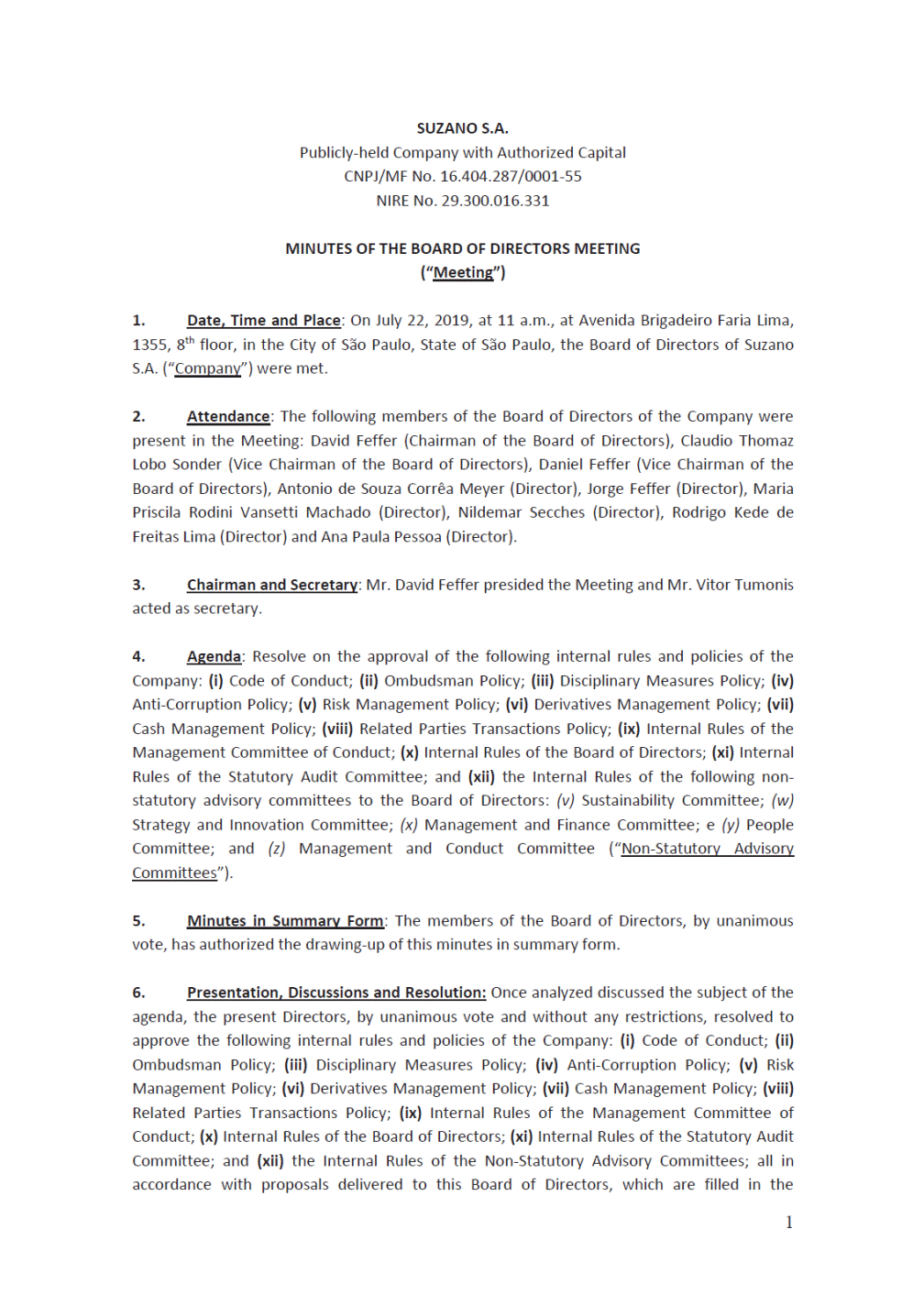
headquarters of the Company, replacing any prior version, if existent, of the policies approved herein. 6. CLOSING: There being no further matters to be discussed, the meeting was adjourned. The minutes of the Meeting were drawn up, read, approved and signed by all members of the Board of Directors present. Signatures. Presiding Board: David Feffer – Chairman; Vitor Tumonis – Secretary. Directors: David Feffer (Chairman of the Board of Directors), Claudio Thomaz Lobo Sonder (Vice Chairman of the Board of Directors), Daniel Feffer (Vice Chairman of the Board of Directors), Antonio de Souza Corrêa Meyer (Director), Jorge Feffer (Director), Maria Priscila Rodini Vansetti Machado (Director), Nildemar Secches (Director), Rodrigo Kede de Freitas Lima (Director) and Ana Paula Pessoa (Director). This is a true copy of the original drawn up in the Company’s records. São Paulo, SP, July 22, 2019. Vitor Tumonis Secretary 2

Summary 1 – PRESENTATION............................................................................................................................................... 2 2 – GLOSSARY........................................................................................................................................................ 2 3 – ETHICAL PRINCIPLES ..................................................................................................................................... 4 4 – CODE OF CONDUCT MANAGEMENT........................................................................................................ 122 5 – EXTERNAL OMBUDSMAN .......................................................................................................................... 144 6 – UNDERTAKING ............................................................................................................................................ 155 Area: OMBUDSMAN Scope: SUZANO S/A Code: MAN. Type of Document: GUIDE Review: 1.0 Title: CODE OF CONDUCT Date: 07/22/2019
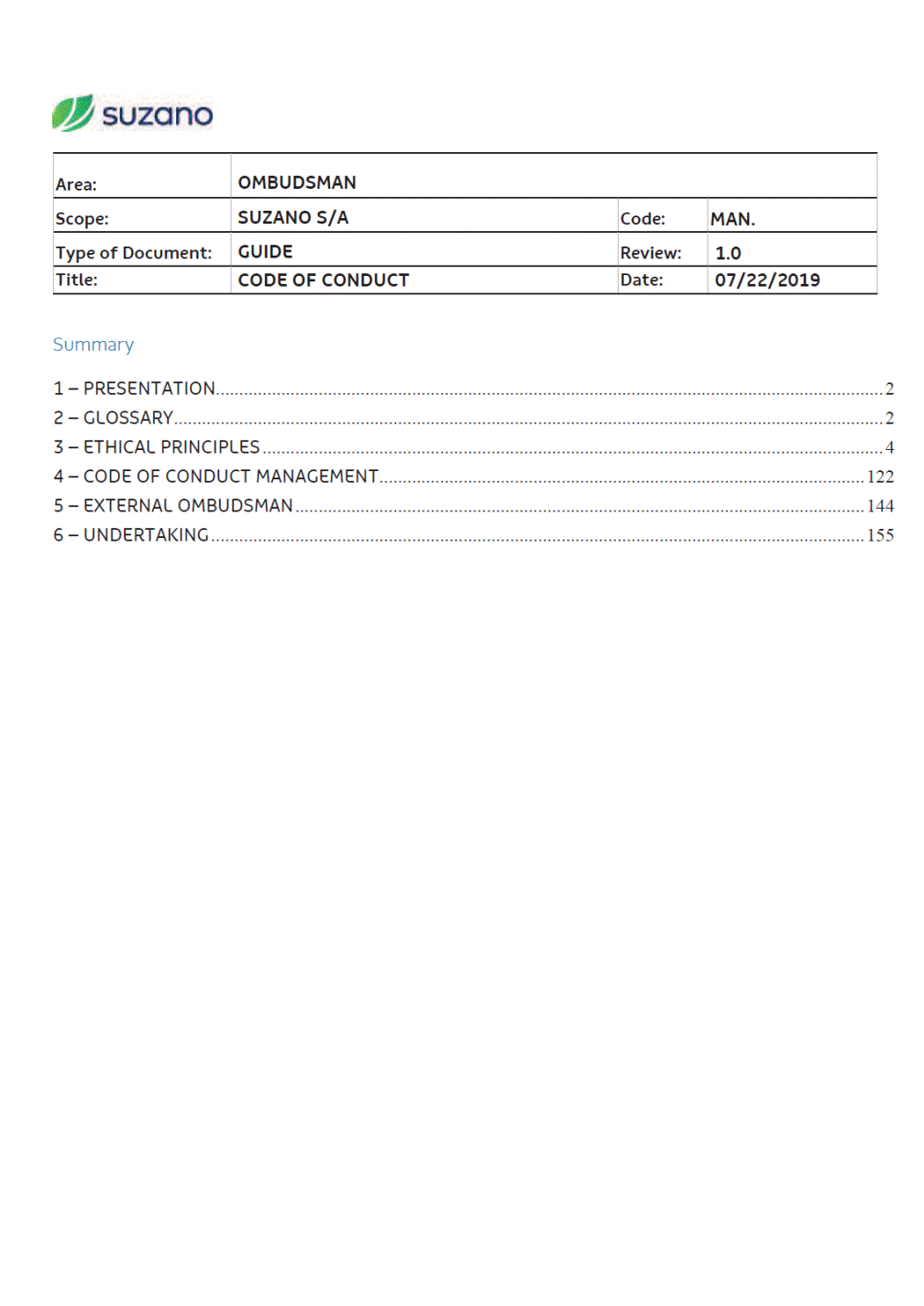
1 – PRESENTATION Suzano S.A. is one of the largest business organizations in the Country and its basic principle is to establish quality relationships with all its stakeholders. The responsibility for managing our business involves a broad universe of people and all our relationships must be guided by the highest ethical values. The purpose of the Code of Conduct is to commit our directors, officers, administrators, managers, shareholders, employees, outsourced employees, suppliers, customers, persons or entities, and interested parties of Suzano S.A. and its subsidiaries and affiliates to the ethical principles that guide our business conduct and disseminate them to our network, and we are committed to transparency, fairness, accountability and corporate responsibility, as well as to guaranteeing human rights within our operations. To facilitate understanding of some terms that appear in this Code of Conduct, the following Glossary has been prepared: 2 – GLOSSARY 2.1. Conflict of interests Any situation in which anyone, as well as your relatives or personal friends, may benefit from the relationship of employee with Suzano S.A. to gain personal advantage or for the benefit of third parties, i.e. decisions in which your particular interests prevail over interests of the Corporation, resulting in personal gain of any kind, direct or indirect, to you, your family members or friends, whether such a decision will cause damages or losses. 2.2. Moral harassment Exposing employees to abusive conduct by one or more people against an individual, often repeatedly and prolonged to coerce, humiliate, disrespect, disparage or embarrass the individual during the workday and in the exercise of duties. 2.3. Sexual harassment Characterized when someone in a privileged position uses this condition to coerce or offer benefits to an employee to gain sexual advantage or favor, in oral, non-oral or physical form, causing disturbance, embarrassment and affecting the dignity of such employee. 2.4. Behavioral deviation Characterized by persistent patterns of socially inappropriate, aggressive or defiant conduct, in violation of social norms or individual rights, which may characterize discomfort or affect image or human rights through gestures, attitudes and comments of discrimination. 2.5. Fraud Deliberate and dishonest unlawful action to deceive someone for the purpose of securing self or others' benefit for personal, financial and other advantage. 2.6. Sustainable development Area: OMBUDSMAN Scope: SUZANO S/A Code: MAN. Type of Document: GUIDE Review: 1.0 Title: CODE OF CONDUCT Date: 07/22/2019
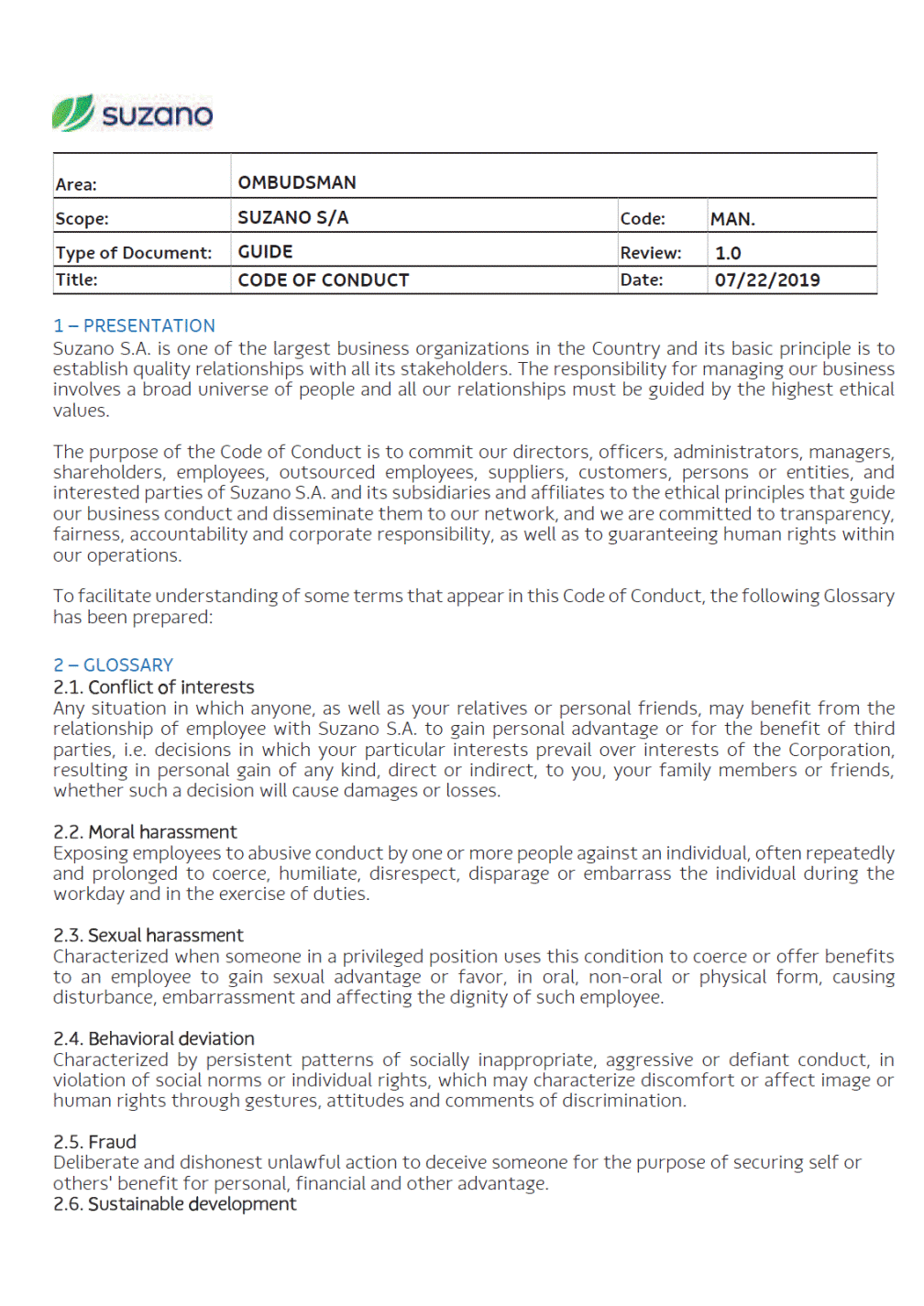
It means to satisfy the needs of the current generation, without compromising the ability of future generations, enabling now and in the future to reach a level of satisfaction of social and economic development, reasonably for the use of resources to ensure the preservation of species and the natural habitats. 2.7. Corporative Governance It is the set of practices based on transparency, equality and accountability for acts or matters relating to the management of an organization, with the aim of optimizing results while protecting all stakeholders. 2.8. Suzano S.A. A publicly-held corporation with stocks and other securities listed on the Brazilian and US stock exchanges. 2.9. Securities market It is a regulated system of securities trading, such as stocks, ADRs, debentures, CRAs and bonds formed, among others, by the Stock Exchanges, regulatory bodies such as CVM and SEC, brokerage firms and other authorized financial institutions. Its function is to direct funds for financing to industry, trading and other business activities, rewarding the investor and contributing to the economic growth of the Country. 2.10. New Market Special listing segment in B3 restricted to the trading of stocks of corporations that voluntarily adopt corporate governance practices in addition to those required by Brazilian law. Listing in this special segment implies the adoption of a set of rules to be followed by corporations that expand stockholders' rights, as well as the disclosure of policies and the existence of supervisory and control structures. New Market leads corporations to the highest standard of corporate governance, aiming to ensure greater transparency, equity and accountability to its stockholders. For example, corporations listed in this segment may only issue voting stocks, so-called common stocks (ON). 2.11. Relatives Members are considered family members up to the third degree, either by consanguinity or affinity. The employee's spouse or partner, as well as family members such as parents, stepfather, stepmother, grandparents, great-grandparents, children, stepchildren, grandchildren, great-grandchildren, brothers, uncles, nephews, son-in-law, daughter-in-law, father-in-law, cousins, great-uncles, grandnephews, brothers-in-law and brothers-in-law’s husband of the employee and their spouse or partner. 2.12. Stakeholders Any person or organization that has a direct or indirect interest or relationship with Suzano S.A. or that may be influenced by its performance. Owners, stockholders, employees, service providers, customers, suppliers, partners, communities, NGOs, associations, creditors, government and society. Area: OMBUDSMAN Scope: SUZANO S/A Code: MAN. Type of Document: GUIDE Review: 1.0 Title: CODE OF CONDUCT Date: 07/22/2019
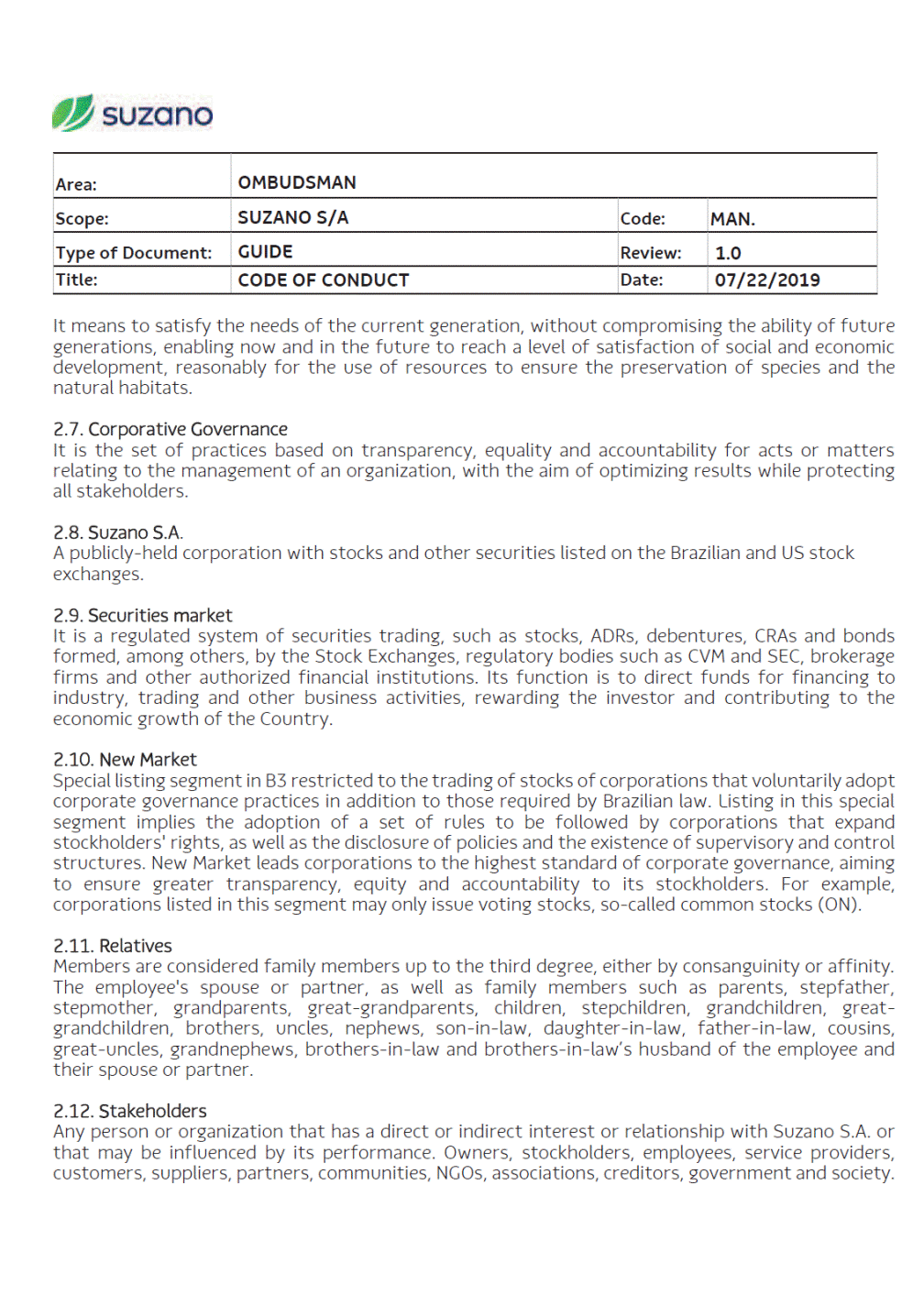
3 – ETHICAL PRINCIPLES 3.1. Corporative Governance The corporation is managed in a professional manner, in accordance with Suzano S.A.'s organizational principles and good Corporate Governance (1), with the aim of increasing its value, facilitating its access to capital and contributing to its perpetuity. We act in accordance with the laws, internal rules of procedure and also those established by national and international securities market regulatory bodies. Ignorance of a legal or regulatory obligation cannot be used as a defense against possible consequences of misconduct, so it is the responsibility of all people covered by this document to know and ensure compliance with laws in force and rules applicable to the professional activities who perform, presenting behaviors aligned with the highest levels of integrity. In case of doubt, the direct or indirect employee, managing supplier, representative or service provider must always consult Suzano S.A.'s policies, rules and procedures before acting to align understandings with the responsible managers in the Corporation or consult the departments or appropriate sectors at Suzano S.A. to ensure proper performance. We maintain the confidentiality of all information not yet disclosed to the market and the general public, such as strategic matters, privileged or confidential data not known to the market and the disclosure of which might affect the Corporation's business. Examples of this information include: financial results, acquisitions or sales of equity interests, industrial secrecy, and investment, prices, trading actions, market strategies and related matters. For more information see the Material Event or Fact Disclosure Policy, and Information Security Policy. Suzano S.A. is a publicly-held corporation, with stocks and other securities listed on B3 and the NYSE, subject, therefore, to the regulations of the Brazilian Securities Commission (CVM) and the Securities & Exchange Commission (SEC) in the United States. Therefore, it must follow and ensure that its controllers, directors, officers, employees and business partners comply with specific securities market standards. Given these obligations and following our commitment to the best Corporate Governance practices, we have several policies to be followed, including, without limitation, the Securities Trading Policy. Confidential information in response to legitimate requests from government authorities or external companies providing or rendering services to the Corporation may be provided only after considering whether it will be treated in confidentiality and after taking appropriate measures to protect its confidentiality. When sending information to governmental authorities, the Corporation's Legal Department must always be consulted. We do not use such information for our own or third party's benefit. If we are required to disclose it by force of law or court order, we will inform our immediate superior in advance and restrict it to the minimum necessary to comply with such order. Area: OMBUDSMAN Scope: SUZANO S/A Code: MAN. Type of Document: GUIDE Review: 1.0 Title: CODE OF CONDUCT Date: 07/22/2019
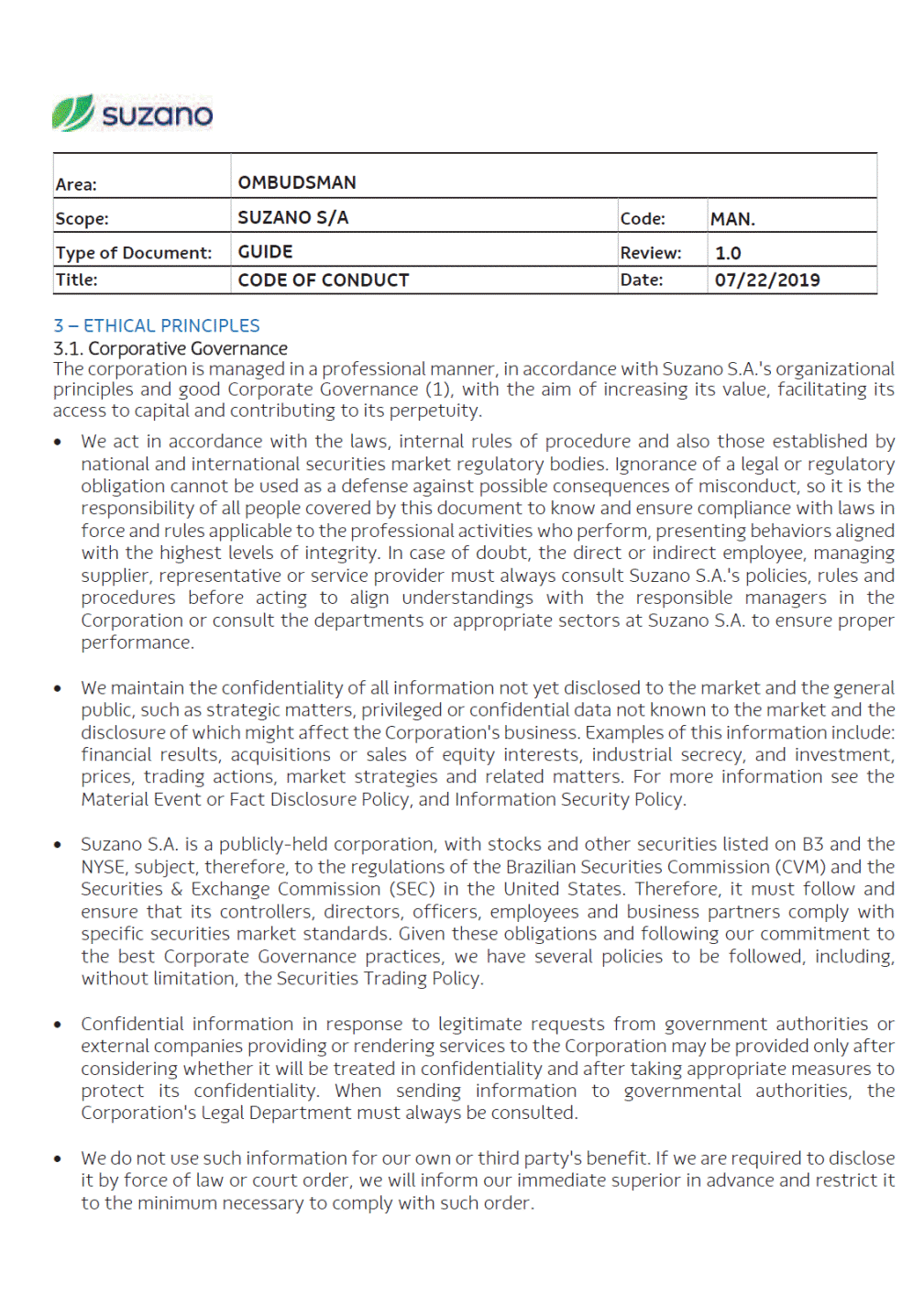
We do not accept, in any situation or circumstance, the promise, offer, authorization, encouragement and/or consent of any asset of value or advantage, financial or otherwise, to a Public Employee or any other Corporation's business and/or proprietary and/or confidential person for the purpose of influencing decisions implying personal gains, or for the purpose of information about business opportunities, market affecting obtaining activities, including information about competitors or bids, or that is designed as a means of gratitude to decision taken for the improper benefit of Suzano. See Anti-Corruption Policy. We value healthy relationships with government and compliance with legislation and regulatory agencies. We respect the guidelines of national and international anti-corruption laws and act in conformity with good corporate practices. For more information, see the current Policy. (1) In 2017, Suzano S.A. joined B3 S.A.'s New Market listing segment - Brazil, Stock Exchange, Counter OTC ("New Market"). 3.2. Integrity We carry out our activities correctly and honestly, preserving and strengthening our moral and ethical principles. We perform our functions to the best of our ability, making efforts to achieve the goals set by Suzano S.A. We only accept gifts and donations that are part of the communication strategy of our customers, partners or suppliers and that are widely distributed to people with whom the corporation or institution has business relationships. We act with common sense in receiving gifts whose values are inappropriate for a professional relationship, and obey the limits set by the corporation. We offer gifts and donations to Suzano S.A customers, partners and suppliers always in accordance with our relationship strategy and within the limits established by the corporation. Giveaways, gifts, and institutional invitations may be practices of kindness and courtesy accepted within a business relationship, but require care. For offering or receiving anywhere in the world, a rigorous analysis of each situation is essential, considering issues such as the nature of courtesy, values involved, context, applicable local laws and frequency. Very frequent gifts can be misunderstood and should be avoided. Giveaways, gifts and invitations extended to companions and/or that do not fit the premises expressed in this Code and the criteria and limits set forth in the Corporation's Anti-Corruption Policy shall be refused and returned to the sender, informing the Suzano's conduct with respect to this practice. Suzano's decision-making processes shall not include any benefit or advantage offered, such as gifts, courtesies, entertainment, philanthropic donations and hospitality benefits. Area: OMBUDSMAN Scope: SUZANO S/A Code: MAN. Type of Document: GUIDE Review: 1.0 Title: CODE OF CONDUCT Date: 07/22/2019

The Corporation’s employees may not engage in outside activities, such as consulting or holding positions in organizations with conflicting interests or doing business with Suzano. Corporate, personal or spousal or family relationships with Suzano suppliers or competitors are also not accepted if the position held by the employee or manager confers on him or her the power to influence transactions or allow access to confidential information. The employee who holds positions (paid or unpaid) in external entities and also the employee who has a spouse or family member who works at Suzano or who works with competitors, suppliers, customers, governmental agencies or non-profit institutions that relate to the Corporation shall, as early as possible, communicate the fact in writing (by means of the Conflict of Interest Statement Form) to the immediate leadership, who will evaluate any conflicts of interest together with the Human Resources Department, and if applicable, the Ethics Area and Ombudsman. In the event of a possible conflict of interest, the Corporation's directors must also report the fact to the Ethics department and Ombudsman for the appropriate analyzes and resolutions with the Statutory Audit Committee. Representatives, suppliers and service providers must also do so formally (in writing), in this case directly to the contract manager. The organization does not allow maintaining or employing any parents or relatives by affinity in functions in which there is a direct hierarchical relationship, in interdependent or related functions, or in response to the same immediate superior. The Corporation's manager, supplier, service provider or representative must promptly declare himself/herself conflicted and prevented from participating in the ongoing discussion or even voting on the matter in which he/she has a conflict of interest, including withdrawing from a possible meeting where the discussion is taking place, thus ensuring the proper independence and transparency of the process. Situations that may lead to conflicts of interest not explained in this Code must be reported to the immediate leadership for proper guidance. We immediately communicate to our superiors any business act or transaction under our responsibility involving corporations where our Relatives work. We communicate to our superiors any interests in corporations held by us or our Relatives and friends, as well as commercial, financial or economic interests that may generate Conflict of Interest. It is important to formalize in writing any conflicts of interest that involve relationships with employees or relatives with Suzano or who work with competitors, suppliers, customers, Area: OMBUDSMAN Scope: SUZANO S/A Code: MAN. Type of Document: GUIDE Review: 1.0 Title: CODE OF CONDUCT Date: 07/22/2019

governmental agencies or non-profit institutions that relate to the Corporation, using the form available at intranet. We do not hire or encourage the hiring of Relatives or any person with whom we maintain a personal relationship as a subordinate or service provider, without informing our immediate superior and the human resources department in advance. We act with utmost caution and care when dealing with information and facts whose disclosure could damage Suzano S.A's image. Suzano respects the legislation and the authorities of all levels of government. Whenever a claim is filed by a government representative, including inspection proceedings, the direct or indirect employee must submit it to the Legal Area prior to any referral. If a "search warrant" is filed to a direct or indirect employee, he or she must cooperate, however, by immediately contacting the Legal Area for prior guidance on how to proceed and for appropriate assistance. The submission of information must be complete, prompt and sufficient to clarify the issue, in order to comply strictly with applicable standards. Consideration should be given to whether the information provided is "confidential" and that appropriate measures have been taken to protect its confidentiality. The Corporation's Legal Management must be consulted to provide the necessary assistance. Whether through its direct or indirect employees, managers, representatives, suppliers and service providers, Suzano prohibits making payment as bonuses or offering any advantage, gifts or hospitality to public or government employees, as well as their representatives, to expedite licenses, routine services or administrative actions, as well as to obtain favorable decisions of any nature to the Corporation or to obtain particular advantages. Employees must not use Suzano's name in dealing with personal matters of any kind in their relationship with the government. We treat conflicts of an ethical nature and misconduct with absolute confidentiality from the opening of the report until its investigation and conclusion. We deal with appropriate confidentiality with strategic information about our suppliers, customers, service providers and business partners. Area: OMBUDSMAN Scope: SUZANO S/A Code: MAN. Type of Document: GUIDE Review: 1.0 Title: CODE OF CONDUCT Date: 07/22/2019
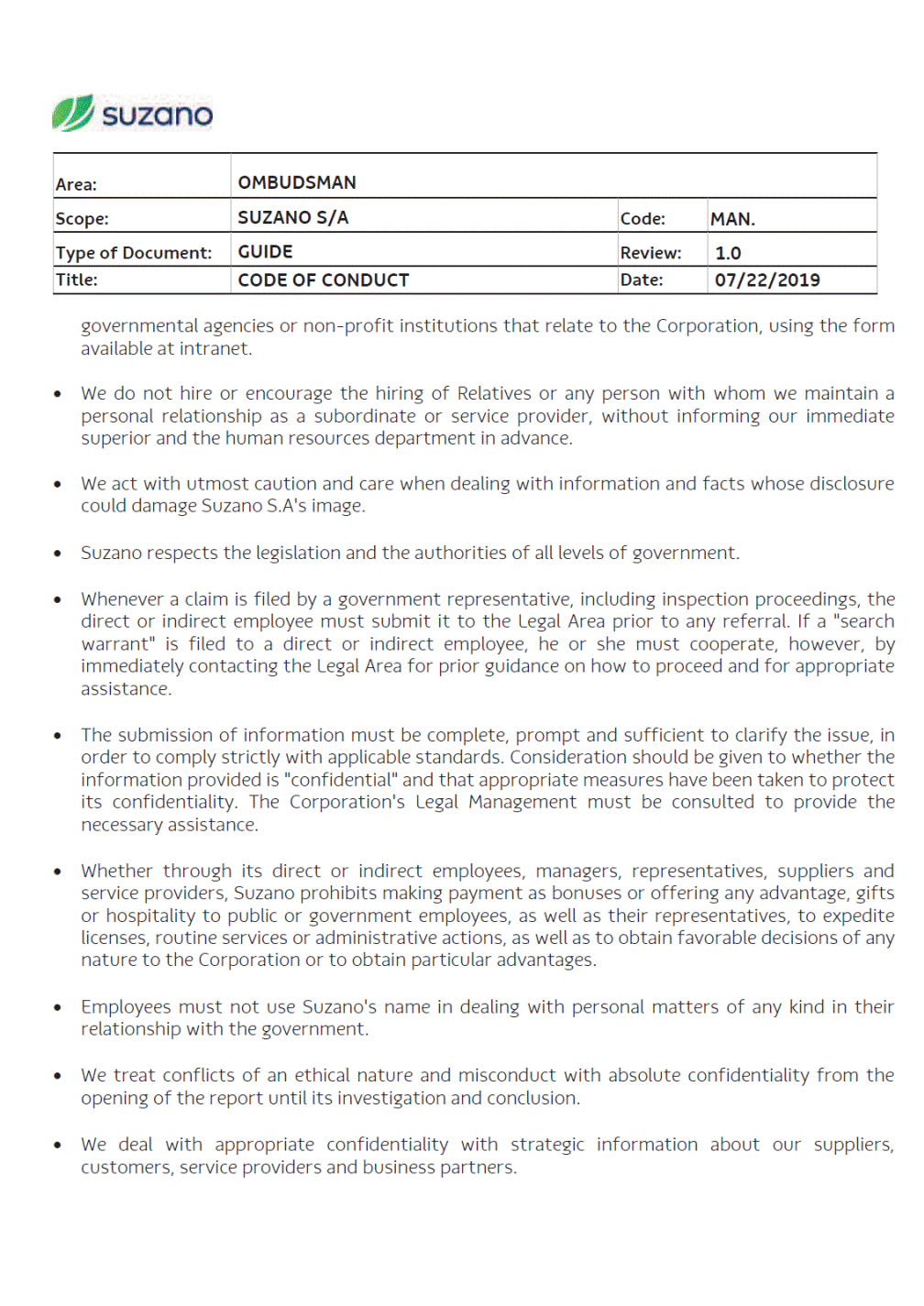
We maintain a healthy relationship with our stakeholders and know the limits and guidelines for exchanging or providing gifts, donations, meals, entertainment or travel. For more information, see the current Anti-Corruption Policy. The building and strengthening of Suzano's image and reputation are also achieved through our dialogue and behavior with the people with whom we relate. For this purpose, our actions inside and outside the Corporation must always be in line with Suzano's principles and values. Suzano's image and reputation management must follow the position defined by the Board of Directors, under the guidance of Corporate Brand and Communication management. Suzano works to establish a harmonious and honest relationship with the communities in which it operates, respecting the well-being of the people living in its surroundings and respecting sustainable local development. Investment in social, cultural and environmental projects must be guided by the actual demands of the communities, in addition to being aligned with the Corporation's guidelines and internal policies, so as to fully comply with projects effectively committed to promoting social inclusion, improving quality of life and environmental conservation. Charitable, support or sponsorship contribution to influence business decisions or to meet direct or indirect personal benefits of any kind is prohibited. 3.3. Equality We treat with respect, dignity and attention all those with whom we relate inside or outside Suzano S.A. We value diversity without discrimination of any kind, race, color, political belief, gender, religion, gender, sex, sexual orientation, age, place of birth and disability, among others. In recruitment, selection and promotion processes, candidates must be evaluated solely for their skills and conditions of meeting the job expectations, and decisions based on prejudice, favoritism or even privileges of any kind will not be accepted. We guarantee equal opportunities and seek to develop lasting and quality relationships based on mutual respect and trust. We operate with transparency and agility in our relationship with our stakeholders, honoring our commitments. Area: OMBUDSMAN Scope: SUZANO S/A Code: MAN. Type of Document: GUIDE Review: 1.0 Title: CODE OF CONDUCT Date: 07/22/2019
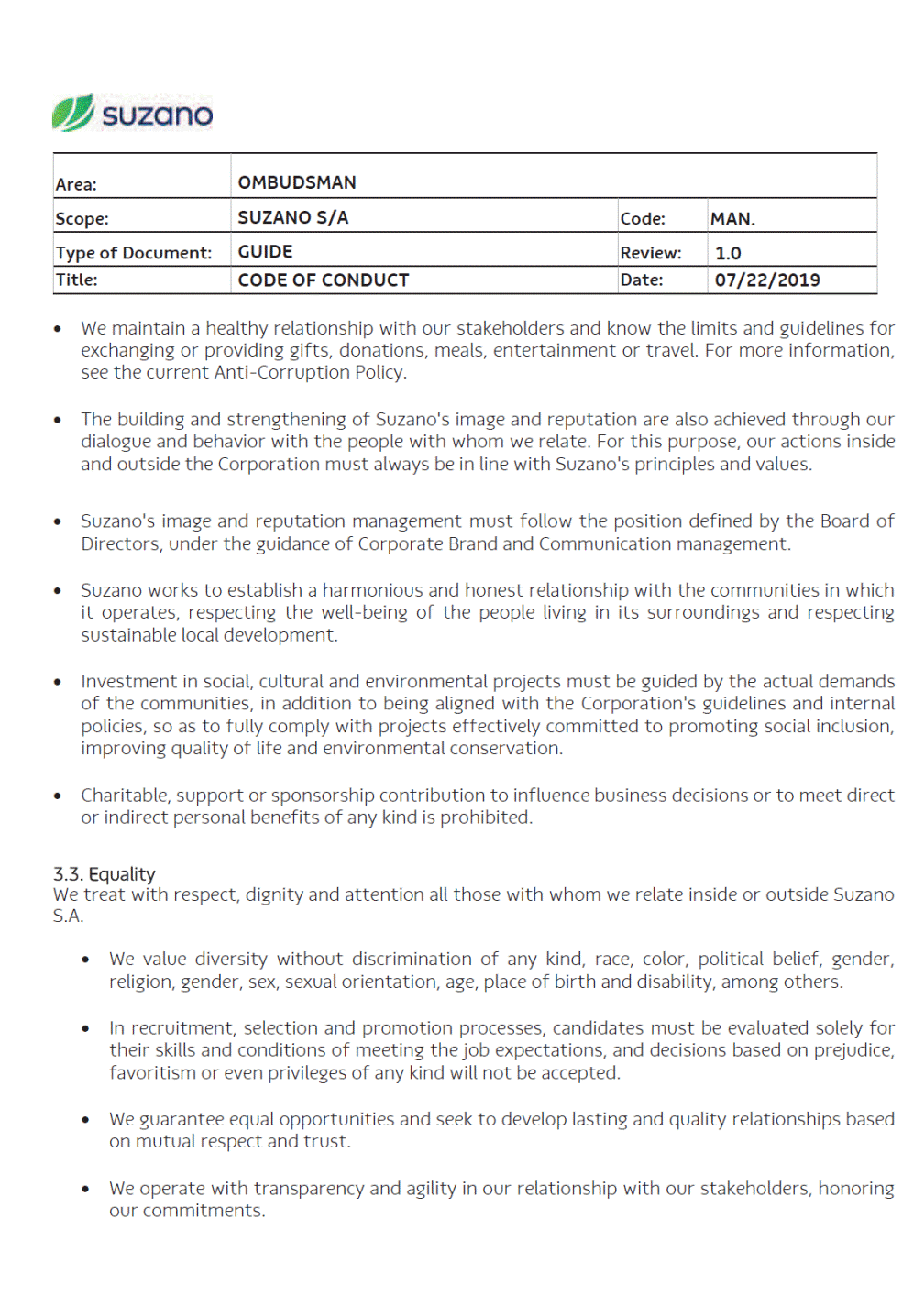
We disapprove of any form of embarrassment and intimidation, such as verbal, physical or psychic violence, as well as any forms of harassment that are unacceptable and will be punished. We ensure free expression of thought at all levels. We encourage creativity and innovation by encouraging the exchange of experiences and the sharing of ideas and challenges. We value the safety of people, facilities and processes, well-being at work, health and care for the environment. All employees must report potential safety, health or environmental hazards, whether direct or indirect employee, as well as the suppliers and service providers must be familiar with health, safety and environmental policies, procedures and practices and comply with them rigorously, and in emergency situations, must inform management, and only official spokespersons must communicate the fact to communities and authorities. The evaluations of our employees are based on meritocracy, consistent deliveries and adherence to our directors. These are addressed privately to the person himself, thus avoiding the spread of opinions that may damage their image. In recruitment, selection and promotion processes, candidates must be evaluated solely for their skills and conditions of meeting the job expectations, and decisions based on prejudice, favoritism or even privileges of any kind will not be accepted. The building and strengthening of Suzano's image and reputation are also achieved through our dialogue and behavior with the people with whom we relate. For this purpose, our actions inside and outside the Corporation must always be in line with Suzano's directors. 3.4. Transparency Our relationships are conducted clearly and truthfully. We maintain permanent communication and we are true and objective in disclosing information to society and the press. Area: OMBUDSMAN Scope: SUZANO S/A Code: MAN. Type of Document: GUIDE Review: 1.0 Title: CODE OF CONDUCT Date: 07/22/2019
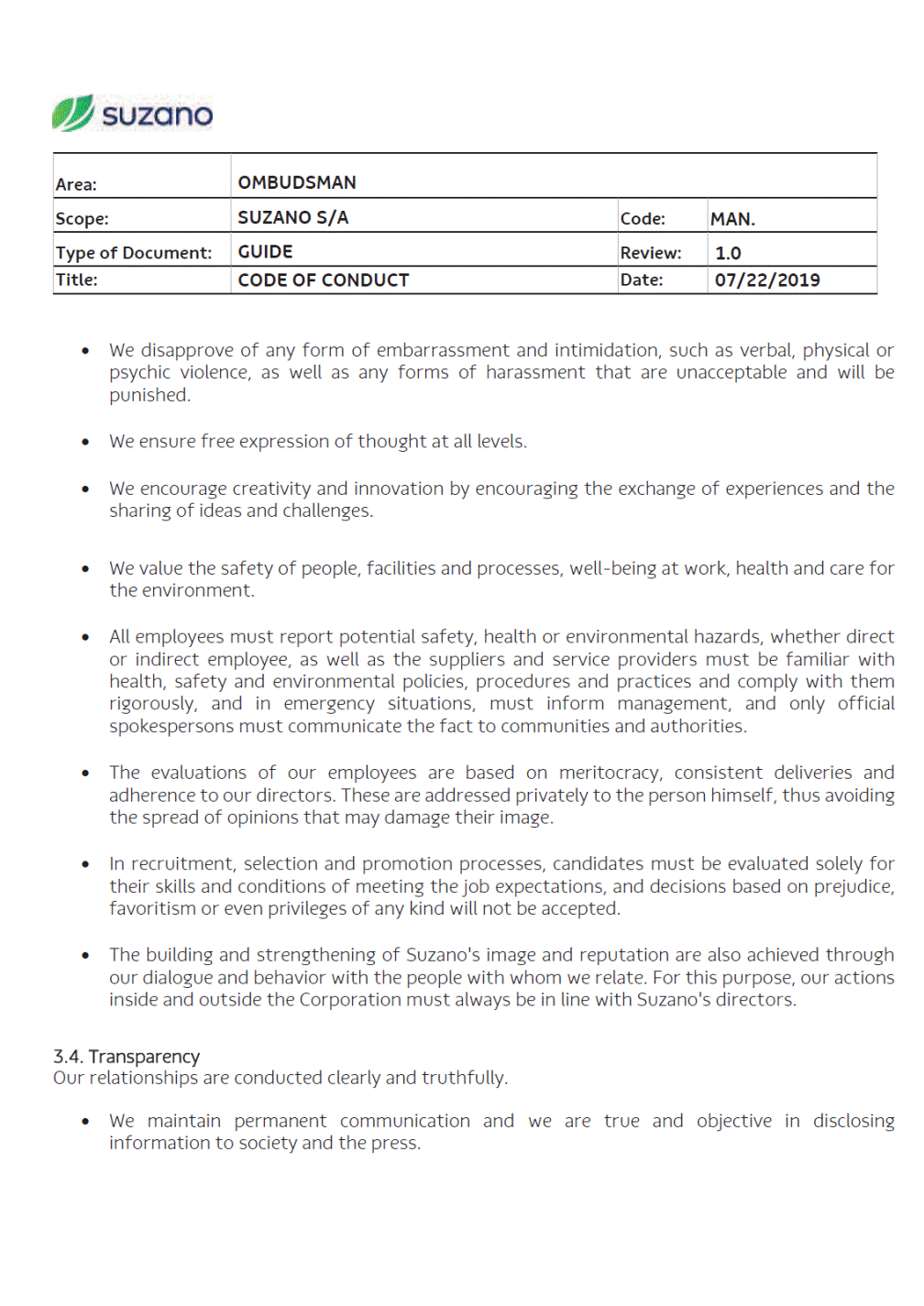
We are aware of Suzano S.A.'s conduct in promoting open, loyal and constructive dialogue with employers 'and workers' representative bodies, based on the principles of freedom of association and respect for plurality of ideas. Contacts with the Press will be promoted exclusively by spokespersons designated by the Corporation, with guidance from the Communication area. It is therefore prohibited for unauthorized persons to contact or provide information to the Press on behalf of Suzano. Use and protection of the Corporation's properties: Suzano's properties, equipment, facilities and other assets are made available to its employees, third parties, managers and representatives appointed by it for their exclusive use in the Corporation's operations and formally approved by the manager or responsible sector. It is everyone's responsibility to ensure the proper use and conservation of the Corporation's assets placed under their custody. Electronic systems and computer resources are available to direct and indirect employees, managers, representatives, suppliers or service providers for the proper performance of their duties. Specifically regarding the use of the Internet, its access through the computer resources connected to the Corporation's network is primarily intended for Suzano's purposes. If its use for personal purposes is really necessary, it must occur with extreme moderation, always respecting the rules, policies and procedures of the Corporation and never undermining the proper conduct of activities. Suzano's use of electronic mail is intended solely for corporate purposes and is related to the activities of the direct or indirect employee, supplier, service provider, manager or representative designated by the Corporation and must be used in accordance with internal procedures established in related documents, such as the Information Security Policy. The exchange, redemption, storage, use of obscene, pornographic, violent, discriminatory, racist or defamatory content that violates any individual or entity and is contrary to Suzano's policies and interests is prohibited. The password for access to systems is for personal use only, and is not allowed to be granted to third parties, even to a co-worker. Any types of software and programs must not be copied or installed on Corporation computers without the prior authorization of the information technology area. Intellectual property, including patents, trademarks, know-how, technical data, process and market information, and other items that would benefit competitors if they were aware are a strategic asset for Suzano. Area: OMBUDSMAN Scope: SUZANO S/A Code: MAN. Type of Document: GUIDE Review: 1.0 Title: CODE OF CONDUCT Date: 07/22/2019
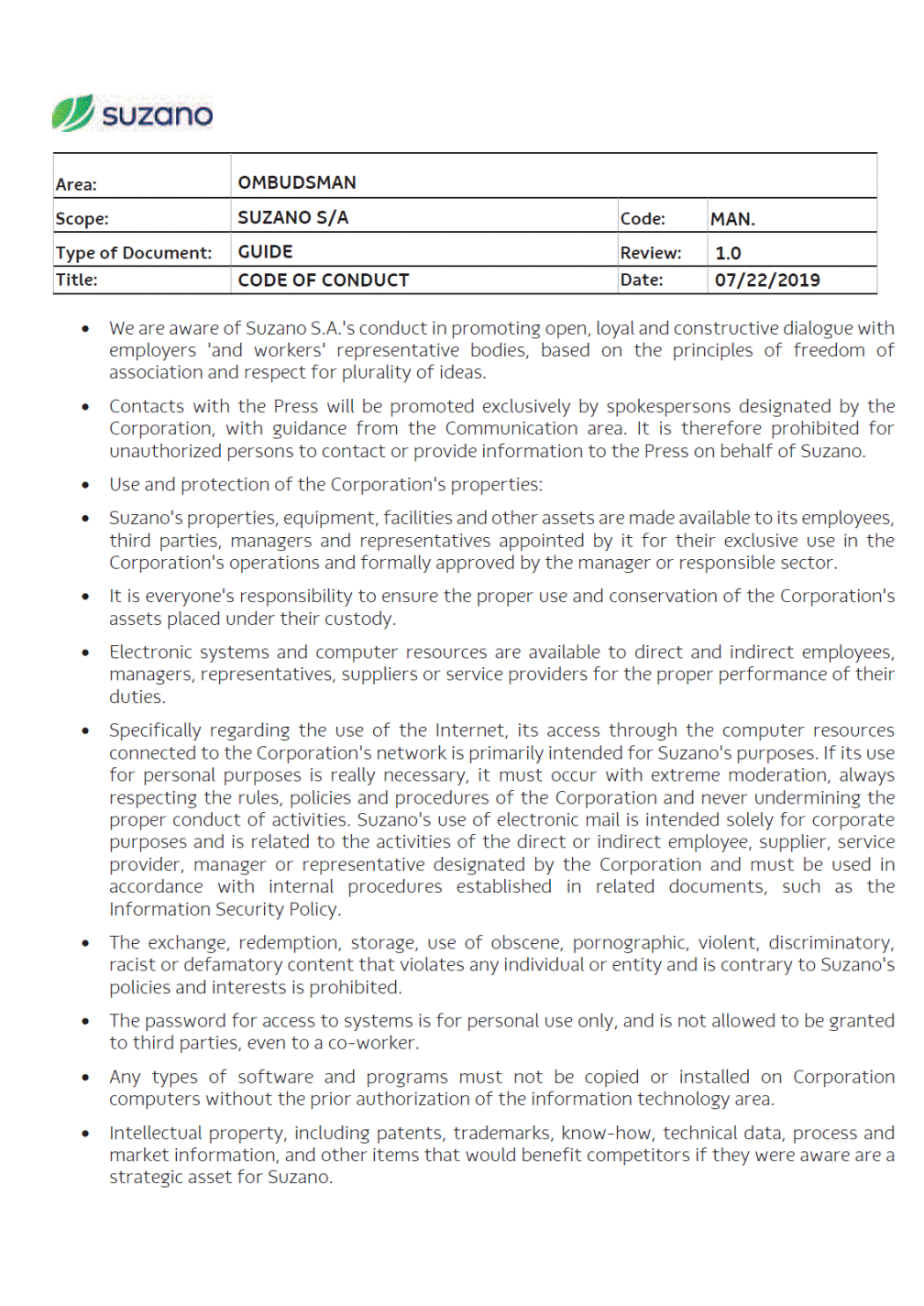
The result of the intellectual, scientific work and strategic information generated by the Corporation are the exclusive property of Suzano. All direct and indirect employees, suppliers, service providers, managers and representatives of the Corporation are responsible for treating in confidentiality information about intellectual property to which they have access as a result of their work, using it carefully. Disclosure of this information is not permitted without the express authorization of the Corporation's management. Similarly, the intellectual property or copyrights of third parties must be strictly respected, such as unauthorized copying of copyrighted printed materials, unauthorized use of photos and testimonials of persons in institutional materials, or otherwise the use of illegal or pirated software on Corporation equipment is prohibited. 3.5. Professional Appreciation We seek to create a healthy work environment that stimulates people's development and recognition for their performance. We are selected and promoted based on our qualifications and competencies, always evaluated in relation to the position or function to be performed. We do not accept the exploitation of forced or compulsory labor, child labor or any other form of exploitation in violation of the human dignity. 3.6. Sustainable Development Our decisions seek economic efficiency, basing our actions on the balance between social and environmental aspects. The Corporation does not accept or support any initiative related to processes designed to conceal or legitimize unlawful financial funds. We seek to consciously use the natural resources. We seek to maintain respectful and cooperative relationships with consumers, communities, suppliers, governments and all parties involved with Suzano S.A's activities. We act in accordance with the rules and principles of free competition, effective in the various locations where the Corporation operates, refraining from exchanging sensitive information with competitors that may affect free competition or result in abuse of economic power. It is not allowed to obtain confidential information, such as market information on a unlawful basis; Area: OMBUDSMAN Scope: SUZANO S/A Code: MAN. Type of Document: GUIDE Review: 1.0 Title: CODE OF CONDUCT Date: 07/22/2019

Suzano reserves the right to terminate a business relationship with a customer or any other interested party whenever there is a loss of interest or disregard for legal, social, tax or integrity issues, which may cause damages to the environment, or endanger the health and safety of people. We invite Suzano suppliers to know the Corporation's directors and act in accordance with the principles of this Code. It is the responsibility of suppliers and service providers to diligently and appropriately instruct their employees, agents and subcontractors regarding the guidelines of this Code, as well as with respect to the Corporation's specific policies and standards, in order to prevent misconduct. The supplier or service provider shall, at Suzano's request, provide proof of compliance with the obligations set forth in this Code. We encourage the exercise of citizenship and voluntary action in the communities in which we operate. We respect the culture and tradition of the communities in which we operate, identifying yearnings and potentialities, and jointly contributing to the promotion of actions that lead to territorial development and the improvement of their local quality of life. Through our actions, we work to preserve the environment, maintain the health of ecosystems and the environmental services they provide. We support policies and practices that promote the sustainable development of the Country and social welfare. We encourage the adoption of good social and environmental responsibility practices by our partners, suppliers and customers. The corporation does not accept or support any initiative related to processes designed to conceal or legitimize unlawful financial funds. For more information, see the Anti-Corruption Policy. 4 – CODE OF CONDUCT MANAGEMENT Suzano Code of Conduct management seeks: To ensure understanding of Suzano S.A's ethical principles. To promote the wide dissemination of the document to all Suzano S.A employees and service providers, customers and suppliers. To provide appropriate treatment for ethical conflicts and misconduct. Area: OMBUDSMAN Scope: SUZANO S/A Code: MAN. Type of Document: GUIDE Review: 1.0 Title: CODE OF CONDUCT Date: 07/22/2019
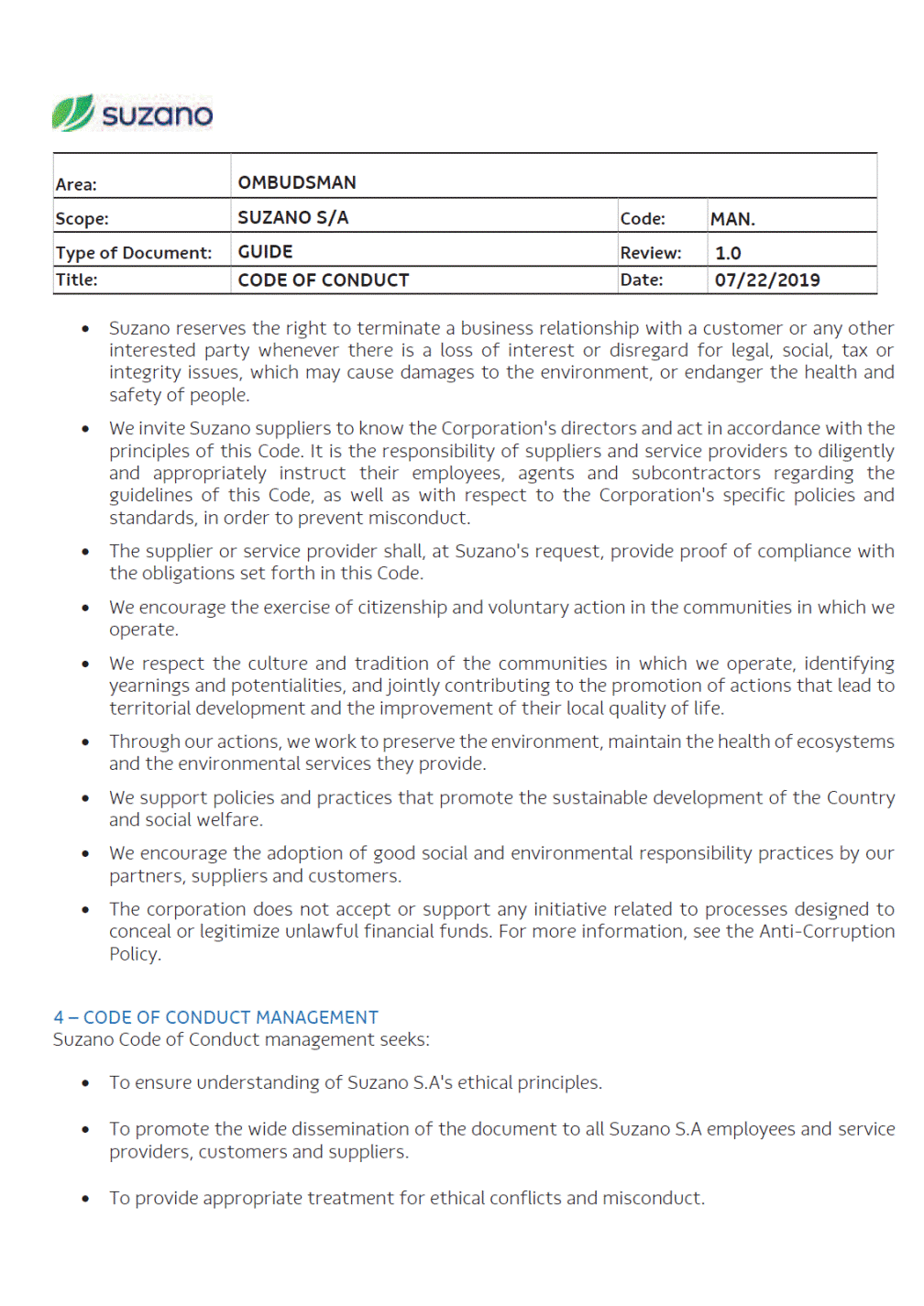
The Suzano Code of Conduct is updated every 2 years, and is the responsibility of the Conduct Management Committee, as well as the submission of inclusions and improvements proposed by all of Suzano S.A. Suzano S.A's Boards of Directors are in charge of approval of the Suzano Code of Conduct and its updates. Any reports or complaints regarding non-compliance with the Suzano Code of Conduct may be sent to the External Ombudsman and will follow the procedure below, and the whistleblower, when identified, will be informed of the progress of the proceeding. We manage the consequences of behavior contrary to Suzano S.A's values in a clear and transparent manner. For more information, see the current Policy. Retaliation or reprisals are acts harmful to people who, in good faith, reported a concern or assisted in an investigation. In this sense, we reaffirm our commitment to the Ombudsman Channel by combating these practices. For more information, see the current Policy. 4.1. Conduct Management Committee It is a consultancy and advisory body to the Audit Committee and also to the Executive Board of Suzano S.A., the purpose of which is to reaffirm the ethical principles aimed at promoting the evolution of the corporate governance model in dealing with the professional attitude and good practices of internal conduct and fostering the transparency in professional relations, which are defined in the document “Regulations of the Conduct Management Committee”. 4.2. Code violations and consequence management The existence of standards, policies and rules is an essential condition for a successful corporation. The leadership is in charge of encouraging its teams to always comply with such standards, policies and rules and to act according to the organization's ethical standards of conduct, and to ensure that they are followed for the harmonious and efficient functioning of the organization. Deviations, non-compliance or violations may lead to disciplinary action which, when applied, must serve as an educator and culture-shaping element. Occurrences of code violation: Failure to comply with the rules set forth herein, as well as with other Corporation policies and standards, and violate the laws applicable to Suzano's business in the locations where it operates; Area: OMBUDSMAN Scope: SUZANO S/A Code: MAN. Type of Document: GUIDE Review: 1.0 Title: CODE OF CONDUCT Date: 07/22/2019

Failure to comply with violations of the laws, ethics, moral and premises set forth in the Code, not taking appropriate actions when aware of or suspected irregularities or not reporting the situation to the appropriate sectors and channels; Manipulate or defraud information in order to conceal violations of the laws, ethics, moral and assumptions set forth in the Code of which it is aware; Use the Corporation's Ombudsman in bad faith, reporting untruths in an attempt to harm third parties. Retaliate against those who have reported in good faith, whether to the Ombudsman or other sectors of Suzano, conduct misaligned with the Code, the Corporation's values, its internal policies and rules and applicable laws. 4.3. Disciplinary measures It is the application of measures/penalties, due to violation of conduct of the by-laws, the Code of Conduct and/or other form of written or oral guidance, provided that it is in accordance with the law and good customs under the Current Disciplinary Measures Policy. 5 – EXTERNAL OMBUDSMAN It is an additional channel for the forwarding of reports or complaints, and anonymity is guaranteed, if the whistleblower so wishes, through a telephone exchange or the Internet, coordinated by an external firm specifically engaged for this purpose. Reports submitted by the External Ombudsman are processed and a report is sent to the Conduct Committee. Phone in Brazil: 0800 771 4060 Foreign Phones: see specific number on website Email: ouvidoriaexterna@austernet.com.b Website: www.suzano.com.br, link “Ombudsman” Area: OMBUDSMAN Scope: SUZANO S/A Code: MAN. Type of Document: GUIDE Review: 1.0 Title: CODE OF CONDUCT Date: 07/22/2019

6 – UNDERTAKING I have received the Suzano Code of Conduct and, after reading and understanding its contents, I agree to the principles and guidelines contained therein and undertake to follow such principles and guidelines in my professional activities, and to ensure that they are followed by all others to whom it applies. All updates deemed necessary by the Conduct Committee will be automatically incorporated into the Suzano Code of Conduct and followed by me. If you do not accept these updates, I will express my disagreement in writing to the Ethics Area and Ombudsman. , 20 Employee Signature Name: Corporation: Area: Note: Send the duly completed and signed undertaking to the Human Resources area of your Unit. Area: OMBUDSMAN Scope: SUZANO S/A Code: MAN. Type of Document: GUIDE Review: 1.0 Title: CODE OF CONDUCT Date: 07/22/2019
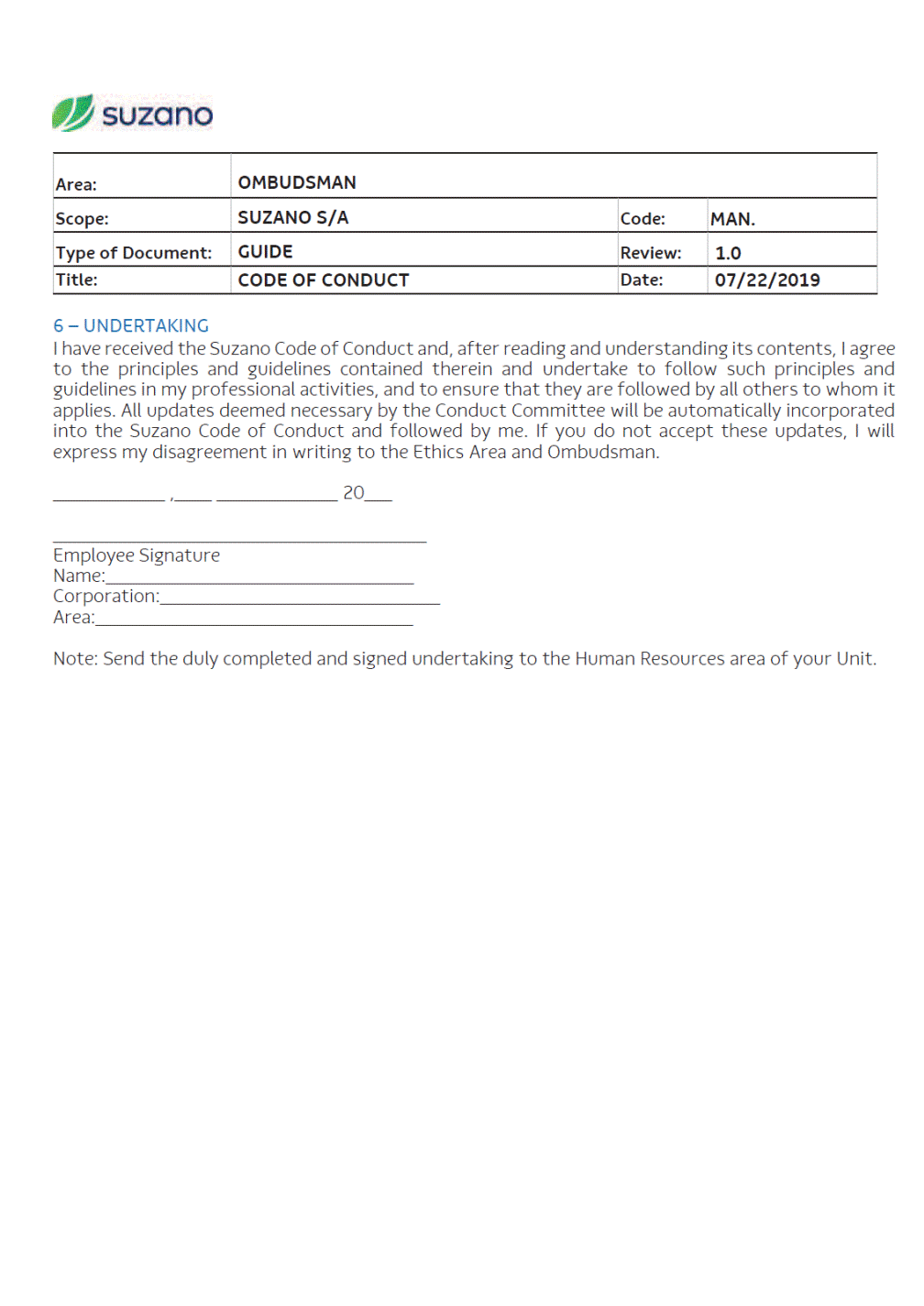
Summary 1 – PURPOSE ......................................................................................................................................................... 2 2 – SCOPE............................................................................................................................................................... 2 3 – DEFINITIONS ................................................................................................................................................... 2 4 – GUIDELINES..................................................................................................................................................... 3 4.1. Types of Risk ................................................................................................................................................. 3 4.2. Risk Management Process .......................................................................................................................... 4 4.2.1. Creating context........................................................................................................................................ 4 4.2.2. Risk identification ..................................................................................................................................... 5 4.2.3. Risk analysis ............................................................................................................................................... 5 4.2.4. Risk Materiality .......................................................................................................................................... 5 4.2.5. Risk assessment ........................................................................................................................................ 5 4.2.6. Risk Treatment .......................................................................................................................................... 6 4.2.7. Communication and Consultation ........................................................................................................ 7 4.2.8. Monitoring and Critical Analysis ............................................................................................................ 8 4.3. Risk Prioritization......................................................................................................................................... 8 4.3.1. Prioritization Matrix ................................................................................................................................. 8 4.3.2. Risk Characteristics per Chart ................................................................................................................ 9 5 – RESPONSIBILITIES.......................................................................................................................................... 9 5.1. Board of Directors........................................................................................................................................ 9 5.2. Audit Committee .......................................................................................................................................... 9 5.3. Executive Board .......................................................................................................................................... 10 5.4. Risk Executive Management and Compliance ...................................................................................... 10 5.5. Functional and Business Area Managers ............................................................................................... 10 5.6. Functional or Business Area Interface ................................................................................................... 11 Title: INTEGRATED RISK MANAGEMENT POLICY Area: Risk Management and Compliance Date: 07.22.2019 Code: Review: 1.0

1 – PURPOSE The purpose of this Integrated Risk Management Policy (“Policy”) is to provide the Corporation's Risk Management guidelines, conceptualize, detail and document related activities, as well as the main responsibilities assigned to the various management bodies or areas of the Corporation. 2 – SCOPE It covers all areas of Suzano that, directly or indirectly, participate in the Risk Management process. 3 – DEFINITIONS Risk Appetite means the level of Risks that the Corporation's management is willing to accept in conducting its business strategy and/or operations. Risk Area and Compliance means Suzano's Risks and Compliance department, which reports to the Corporation's Financial Board. Internal Audit means Suzano's Internal Audit department. Corporation means Suzano Papel e Celulose S.A., together with its subsidiaries. Compliance means adherence to and compliance with legislation and other applicable standards. Board of Directors means Suzano's Board of Directors. Board or Board of Executive Officers means Suzano's Board of Executive Officers, elected in accordance with its By-laws. Risk Management means the activities carried out for the purpose of identifying, classifying, formalizing, monitoring and/or managing the identified Risks. Risk Management must be aligned with the Corporation's objectives, strategies and business. Risk Impact means the financial impacts, health and safety impact, environmental impact, social and cultural impact, image and reputation impact, impact on the organizational climate and/or legal impact involving the Corporation arising from the materialization of a Risk. Materiality of Risk means Risk the materialization of which results in (i) significant loss in the Corporation's financial statements or income statement; or (ii) significant impact on its operations, in any case generating a significant loss to the Corporation's shareholders. Risk Management Policy or Policy means this Integrated Risk Management Policy, as amended from time to time. Risk Management Process means the application of practices and procedures aiming at identifying, assessing, treating and monitoring events that may represent a Risk, based on Title: INTEGRATED RISK MANAGEMENT POLICY Area: Risk Management and Compliance Date: 07.22.2019 Code: Review: 1.0
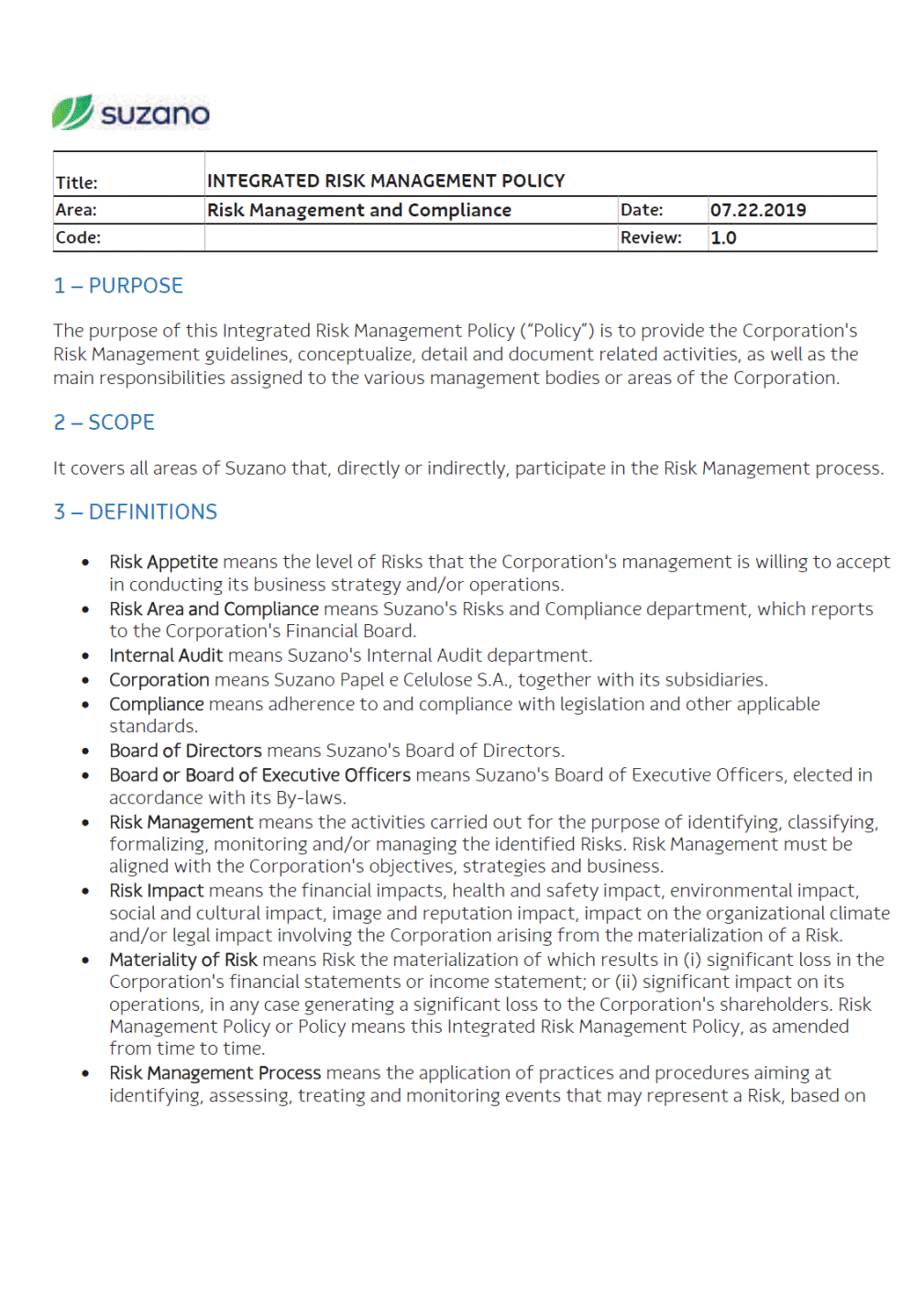
formal documents, such as forms, minutes and manuals, aimed at communicating and sharing knowledge. Risks mean uncertain factors or events, which may cause negative impacts, making it difficult or impossible to meet the Corporation's purposes. Critical Risks mean all Risks the materialization of which results in a Risk Impact greater than the Materiality of Risk, and risk management must be treated with high priority, as well as the monitoring of the main risk indicators carried out on a constant and regular basis. Risk Owner means Employee defined as responsible for monitoring and/or dealing with risk. Suzano means Suzano Papel e Celulose S.A., together with its subsidiaries. Risk Tolerance means the spectrum or range, in monetary value, that the positive or negative result associated with an assumed Risk may generate, spectrum or range defined in terms and within the Corporation's limits. 4 – GUIDELINES 4.1. Types of Risk Suzano categorizes its Risks as follows: Strategic Risks: mean Risks the materialization of which results in losses to the Corporation due to the failure of the adopted strategies, taking into account the dynamics of business and competition, as well as political and economic changes, both nationally and internationally. Financial Risks: mean Risks the materialization of which results in losses of financial funds by the Corporation, subdivided into three categories: oMarket Risks: mean Risks the materialization of which results in losses caused by changes in the behavior of interest rates, exchange rates, share prices and commodities prices and/or other products purchased and/or sold by the Corporation. oCredit Risks: mean the Risks the materialization of which results in the loss of amounts agreed with borrowers or customers of products sold by the Corporation at term with counterparties of contracts or that have issued securities in favor of the Corporation. oLiquidity Risks: mean Risks the materialization of which results in: (i) the Corporation's inability to carry out transactions in a reasonable time and without significant loss of value; or (ii) the lack of funds to honor the commitments assumed due to the mismatch between available assets and past due liabilities. Title: INTEGRATED RISK MANAGEMENT POLICY Area: Risk Management and Compliance Date: 07.22.2019 Code: Review: 1.0

Operational Risks: mean Risks the materialization of which results in losses due to failure, deficiency or inadequacy of internal processes, people and systems, or external events. Compliance Risks: mean Risks associated with legal or regulatory sanctions, financial loss or reputation, resulting from any failure to comply with laws, agreements, regulations, the Code of Conduct and/or Corporation’s internal policies or standards. 4.2. Risk Management Process Suzano's Risk Management aims to standardize the Corporation's concepts, definitions and practices through information systems so that they can support the Corporation at the time of decision making, increasing the transparency of information for the Corporation and its stakeholders, as applicable. Creating context Risk assessment process Risk identification Risk analysis Risk assessment Risk treatment • Figure 1: Risk Management Process 4.2.1. Creating context Definition of Risk management criteria, analyzing the internal context, which involves the organizational structure, processes, responsibilities, internal information systems and relations Monitoring and Critical analysis Communication & Consultation Title: INTEGRATED RISK MANAGEMENT POLICY Area: Risk Management and Compliance Date: 07.22.2019 Code: Review: 1.0
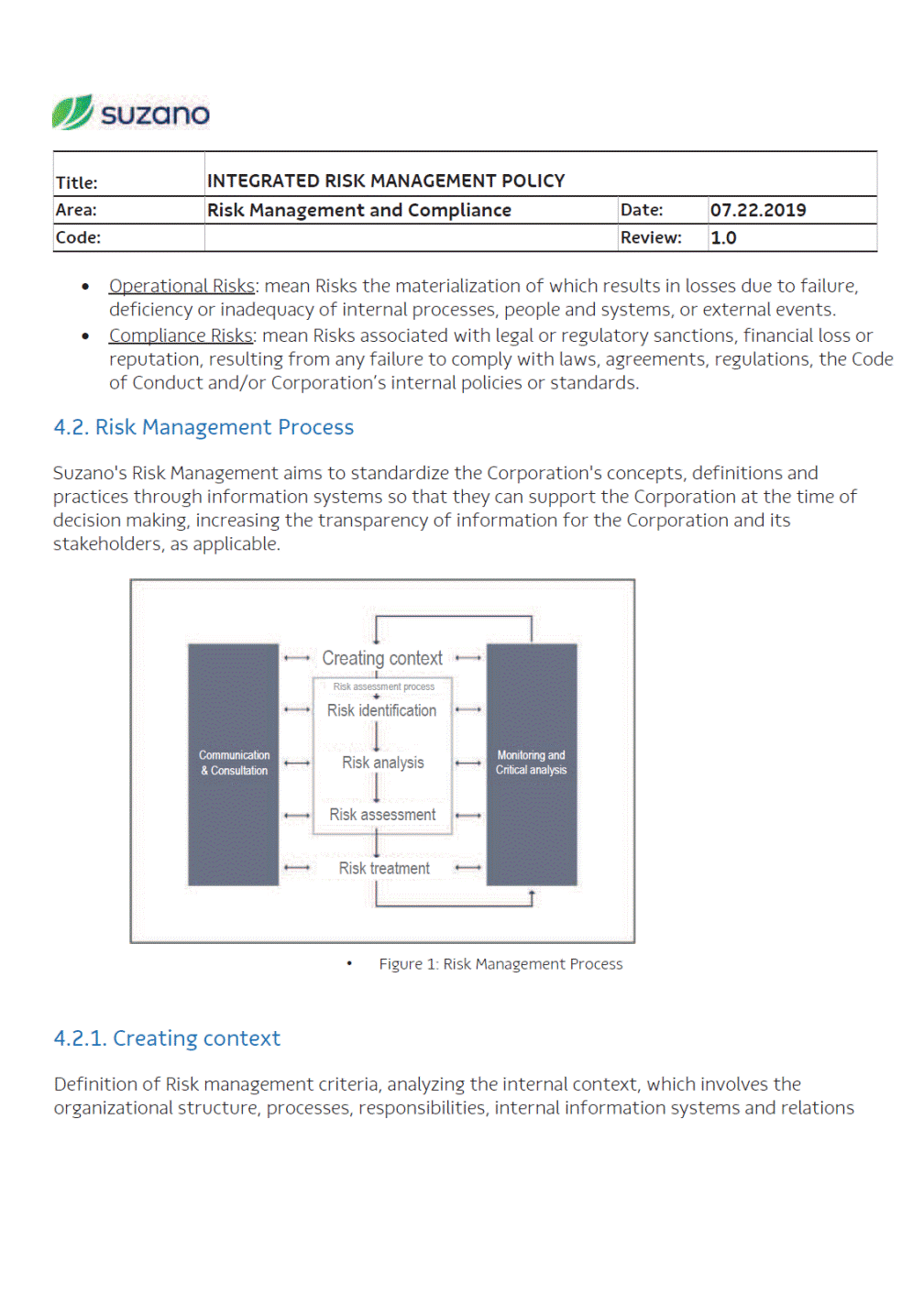
with internal stakeholders, as well as the external context, involving the analysis of the cultural, legal, social, political, financial, technological and economic environment. 4.2.2. Risk identification Comprehensive risk mapping based on the perception of the Board and the executives involved with Risk management, considering business objectives and Risk Impact. 4.2.3. Risk analysis Risk analysis involves assessing the causes and sources of Risk, their consequences, whether positive or negative, and the likelihood that they may occur. Accordingly, all events, whether internal or external, related to the Corporation's strategies and business objectives must be mapped and monitored to ensure that any materializing Risk that may occur is known and managed at an acceptable level. 4.2.4. Risk Materiality The rules and definition of percentages applied to the calculation of Risk Materiality consist of: Use of EBITDA percentages (Earnings before interest, taxes, depreciation and amortization) considering low, moderate, high and extreme impacts. The Risks related to fraud the judgment to be used by the Risks and Compliance area will not be limited to the values calculated in the formula above. 4.2.5. Risk assessment Risk assessment is a process that serves as a basis and assists in decision making, identifying priority Risks that need monitoring and treatment. As for the probability of occurrence, the risks are also classified into four different degrees according to the following criteria: Remote: Remote chance that the event occurs/History of few occurrences or has no history of materialization of risk. Possible: The event is more likely not to occur than it does/Moderate frequency history of risk materialization. Title: INTEGRATED RISK MANAGEMENT POLICY Area: Risk Management and Compliance Date: 07.22.2019 Code: Review: 1.0
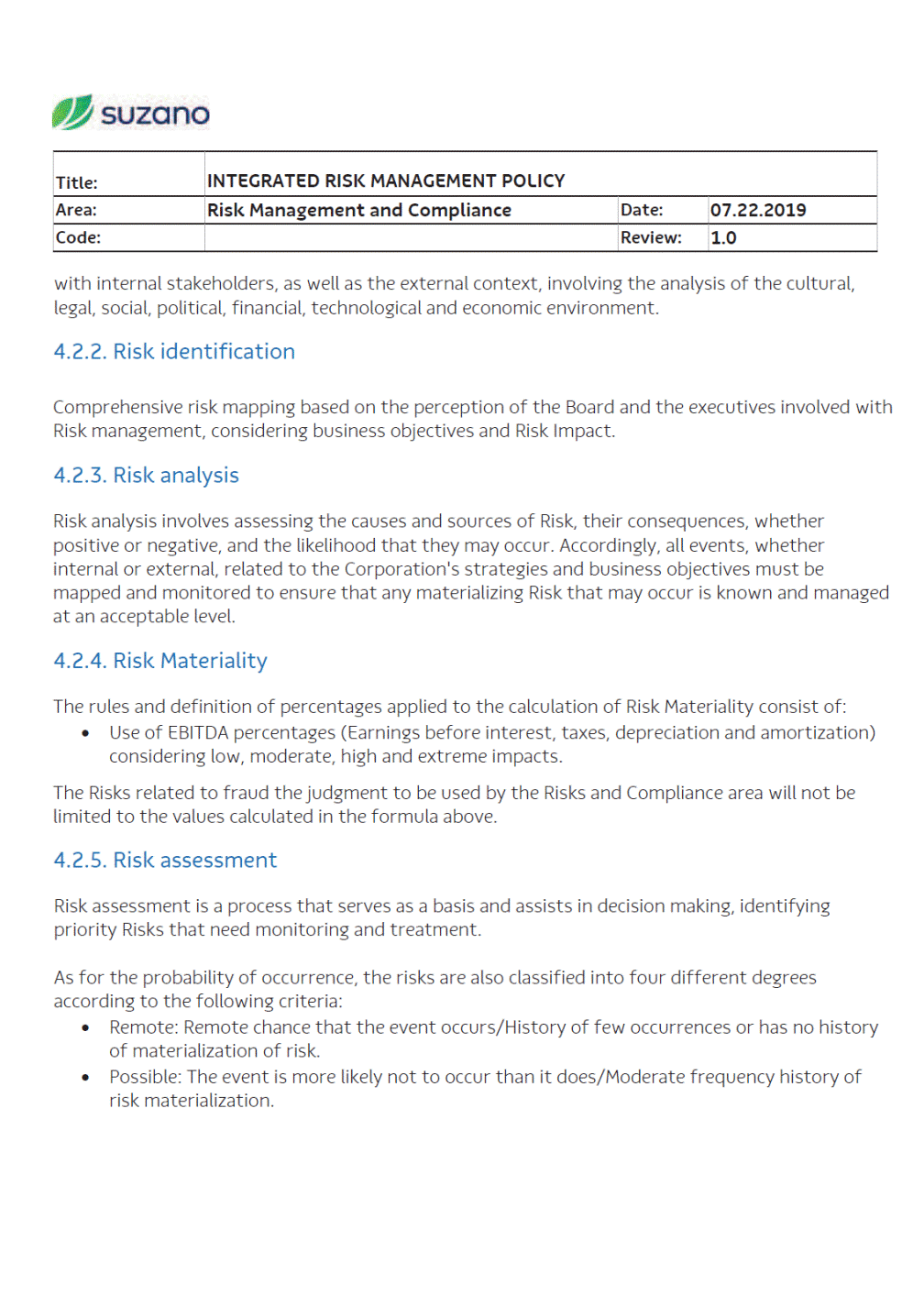
Likely: The event is more likely to occur than not/High frequency history of risk materialization. Very Likely: It is almost certain that the event will occur/History of intense frequency of risk materialization. Impact must be analyzed in the following spheres: financial, health/safety, environment, social/cultural, image/reputation, organizational and legal climate, setting the level to lowest, moderate, highest and extreme. According to the impact and probability classification, a Risk matrix was generated confronting these two variables: Very Likely Likely Possible Remote Lowest Moderate Highest Extreme Impact • Figure 2: Impact Matrix vs. Probability of Occurrence 4.2.6. Risk Treatment Definition of Suzano's behavior on the Risks identified, involving an option selection step with the following line of reasoning: Probability Title: INTEGRATED RISK MANAGEMENT POLICY Area: Risk Management and Compliance Date: 07.22.2019 Code: Review: 1.0
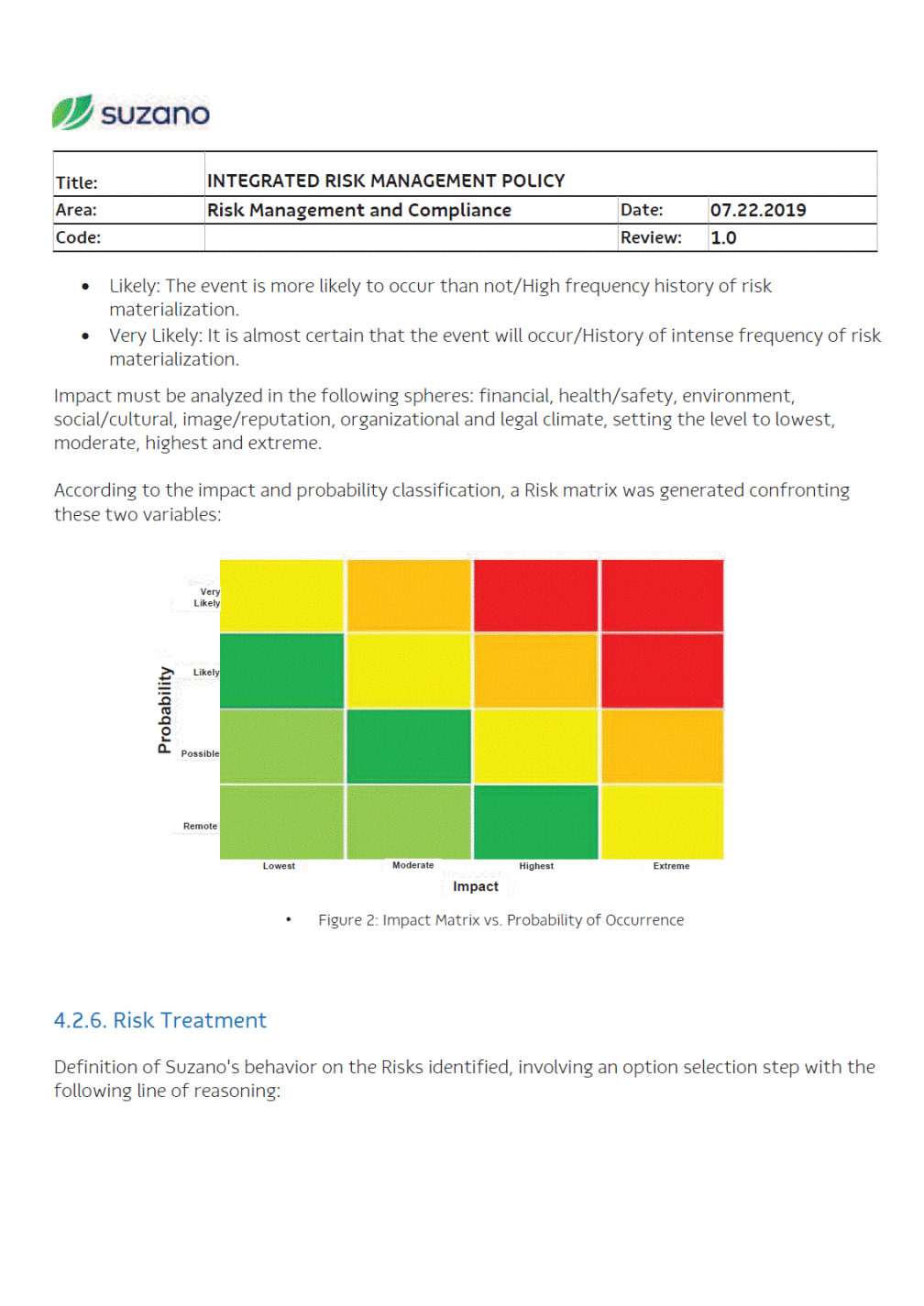
Risk Treatment Accept Reject Avoid Reduce Share • Figure 3: Risk Treatment Accept: The Corporation, within the limits of the authority, decides to live with the Risk, thus not taking actions that will treat it. Reject: The act of rejecting Risk means that Suzano does not wish to live with it, thus requiring a treatment to be addressed by the Risk Owner (Employee defined as responsible for monitoring and/or treating the risk). The fact that a Risk is rejected assumes that Suzano treats it according to the following options: Avoid, Reduce or Share: oAvoid: The activities that originate the Risk must be interrupted, either through the sale of the risk generating asset or through commercial redirection, for example; oReduce: Seek alternatives for process restructuring to reduce the Risk Impact in case of materialization, the probability of materialization, or both; oShare: Take actions to transfer the Risk to a third party, paying a certain amount for such, such as insurance or hedging. 4.2.7. Communication and Consultation The process of managing Risks must be an integral part of all organizational processes, so it is necessary to develop a good communication plan for all phases of the process, always continuously and interactively, so that all stakeholders may share, provide or obtain information. Title: INTEGRATED RISK MANAGEMENT POLICY Area: Risk Management and Compliance Date: 07.22.2019 Code: Review: 1.0

4.2.8. Monitoring and Critical Analysis The purpose of monitoring is to monitor its evolution over time by checking whether actions taken by Suzano or changes in the external environment will have an effect on the Risk assessment, increasing or decreasing its significance or the impact of the Risk, given the assessment factors, probability and timing. 4.3. Risk Prioritization After compiling and classifying the Risks considering the Risk Impact, probability and timing, the main risks that the Corporation must focus on one year period are listed. These Risks, after being validated by the Risk and Compliance Area, will be effectively attacked for their reduction and/or mitigation. 4.3.1. Prioritization Matrix The prioritization matrix allows to graphically view the selected Risks and group them according to the loss or associated Risk Impact, if the risk event occurs. Very Likely Likely Possible Remote Moderate Highest Extreme Lowest Impact • Figure 4: Risk Prioritization Matrix Probability II - Occasional risk incidents I - Low risk incidents IV - Unavoidable risk incidents III - Frequent risk incidents Title: INTEGRATED RISK MANAGEMENT POLICY Area: Risk Management and Compliance Date: 07.22.2019 Code: Review: 1.0
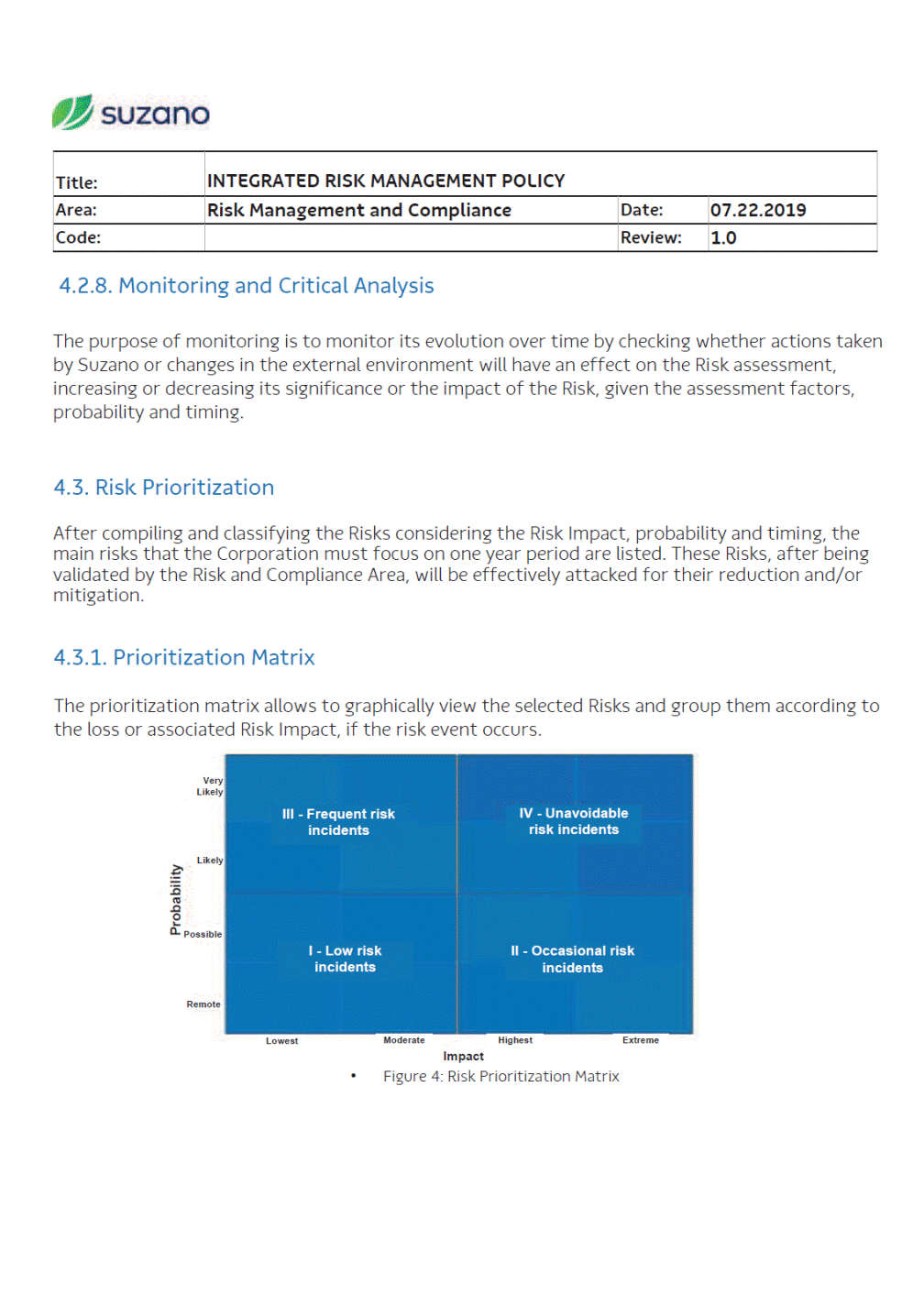
4.3.2. Risk Characteristics per Chart Chart 1 - Relatively Little Risk Materialization Low impact and frequency risks, no need for continuous monitoring. • Chart 2 - Occasional Risk Materialization These are unexpected risks with high impact and low frequency. Risks must be quantified and monitored regularly to continuously adopt mitigation strategies and/or contingency plans. The goal is to be prepared if the event happens. • Chart 3 - Frequent Risk Materialization Lower Critical Risks due to lower impact on business value - Focus must be on defining acceptable levels of loss by events and limits of competence that prevent the impact level from rising over time. Treatment subject to the feasibility of insurance as a response to these risks. • Chart 4 - Risk materialization almost unavoidable Risks are unavoidable and require priority management action to eliminate the risk component or reduce its severity and/or frequency. • 5 – RESPONSIBILITIES 5.1. Board of Directors Establishes the level of risk appetite for the Corporation based on the risk/return ratio it intends to assume. 5.2. Audit Committee •Supervises the risk management and monitoring process, ensuring that the Corporation has internal mechanisms capable of identifying and monitoring them as a way of managing the Corporation's Risk profile. Title: INTEGRATED RISK MANAGEMENT POLICY Area: Risk Management and Compliance Date: 07.22.2019 Code: Review: 1.0
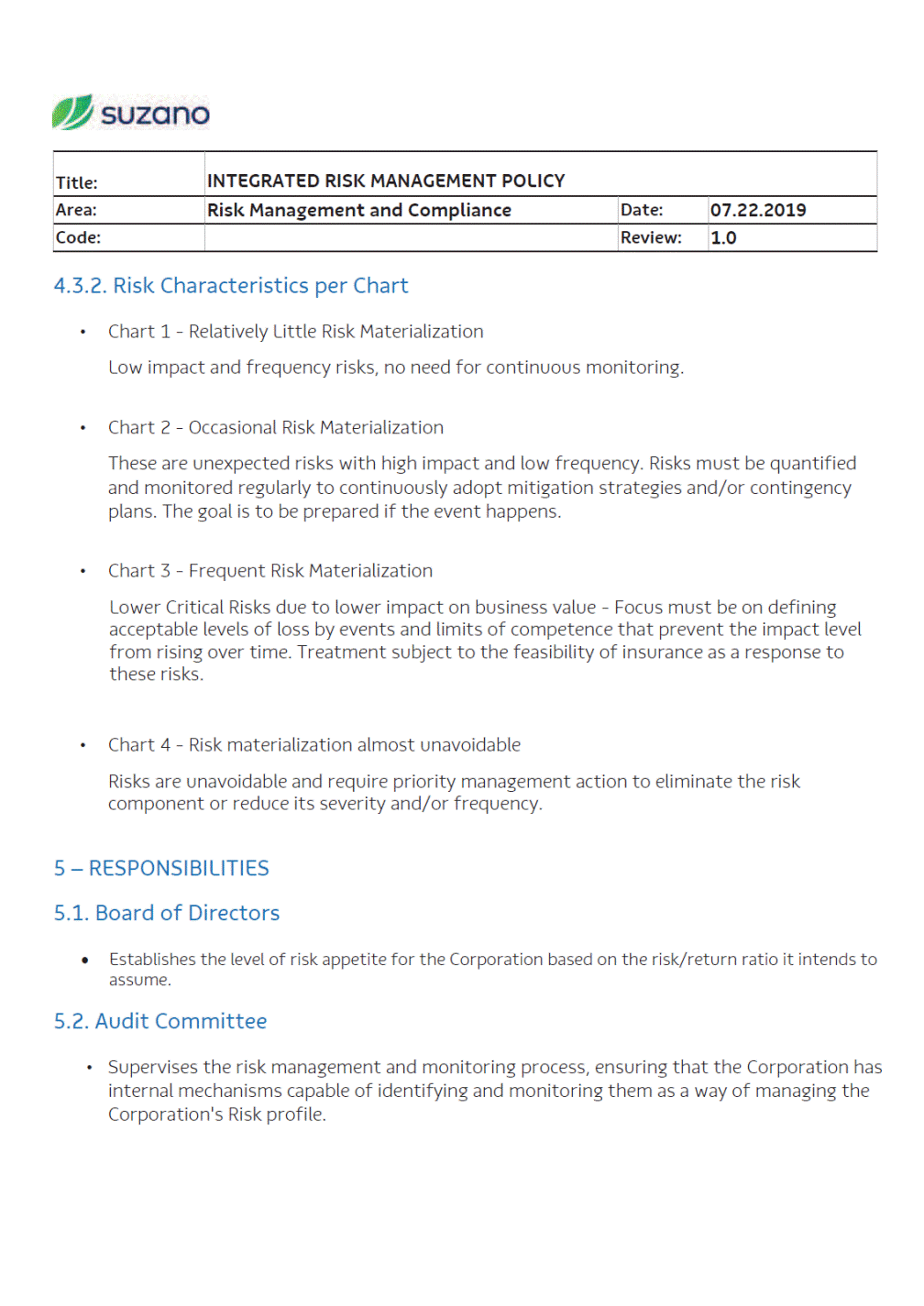
•Evaluates the parameters of the Corporation's Risk management model, as well as its human resources and financial funds allocated to the Risk management process, in addition to the maximum tolerance determined by management. 5.3. Executive Board To act in solidarity and committed to risk management through knowledge, understanding and monitoring of the Corporation's main risks. To maintain an appropriate organizational structure to operate and reasonably manage the Risks to which Suzano is subject. Ratify the prioritization of risks to be addressed/managed. • • • 5.4. Risk Executive Management and Compliance To continuously disseminate the risk management culture in the Corporation. To develop planning and ensure the systemic operationalization of risk management, considering all dimensions of the defined structure, encompassing strategic, tactical and operational activities. To monitor Risks in partnership with other areas of the Corporation. To validate the scope of Risk management work with the Board of Executive Officers and Board of Directors. To advise business areas in identifying and assessing the impact of the various types of risks involved. To support business areas in defining the action/contingency plan. To ensure the maintenance of the risk management policy and verify its compliance. • • • • • • • 5.5. Functional and Business Area Managers •To identify and manage the risks of the respective areas according to mitigation strategies; •To implement the plans and monitor corrective and/or preventive actions in the areas responsible for risks. Title: INTEGRATED RISK MANAGEMENT POLICY Area: Risk Management and Compliance Date: 07.22.2019 Code: Review: 1.0
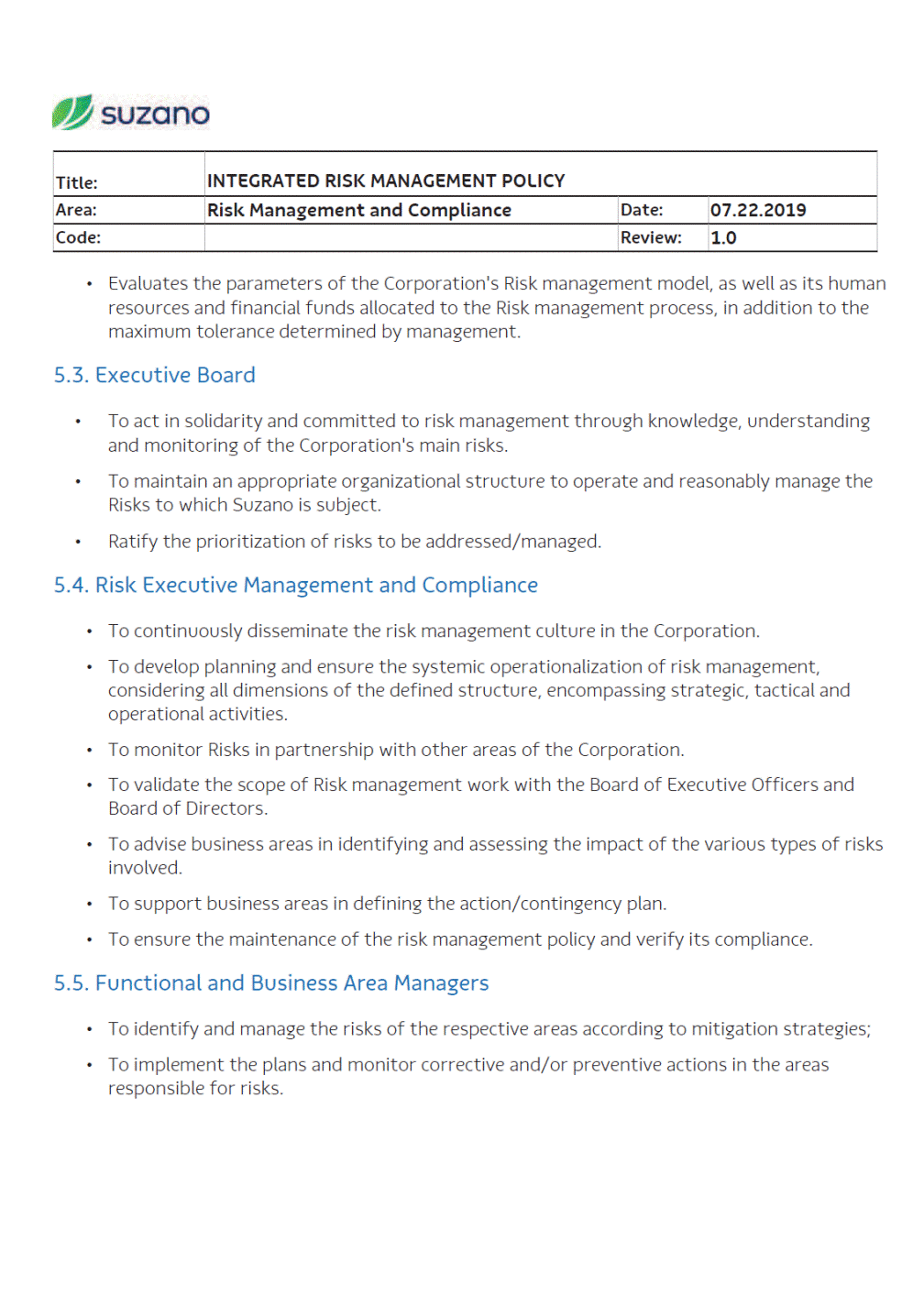
5.6. Functional or Business Area Interface •To act as the interface of the functional and business areas with the Risk Management Area; •To report directly to the Area Manager. Title: INTEGRATED RISK MANAGEMENT POLICY Area: Risk Management and Compliance Date: 07.22.2019 Code: Review: 1.0
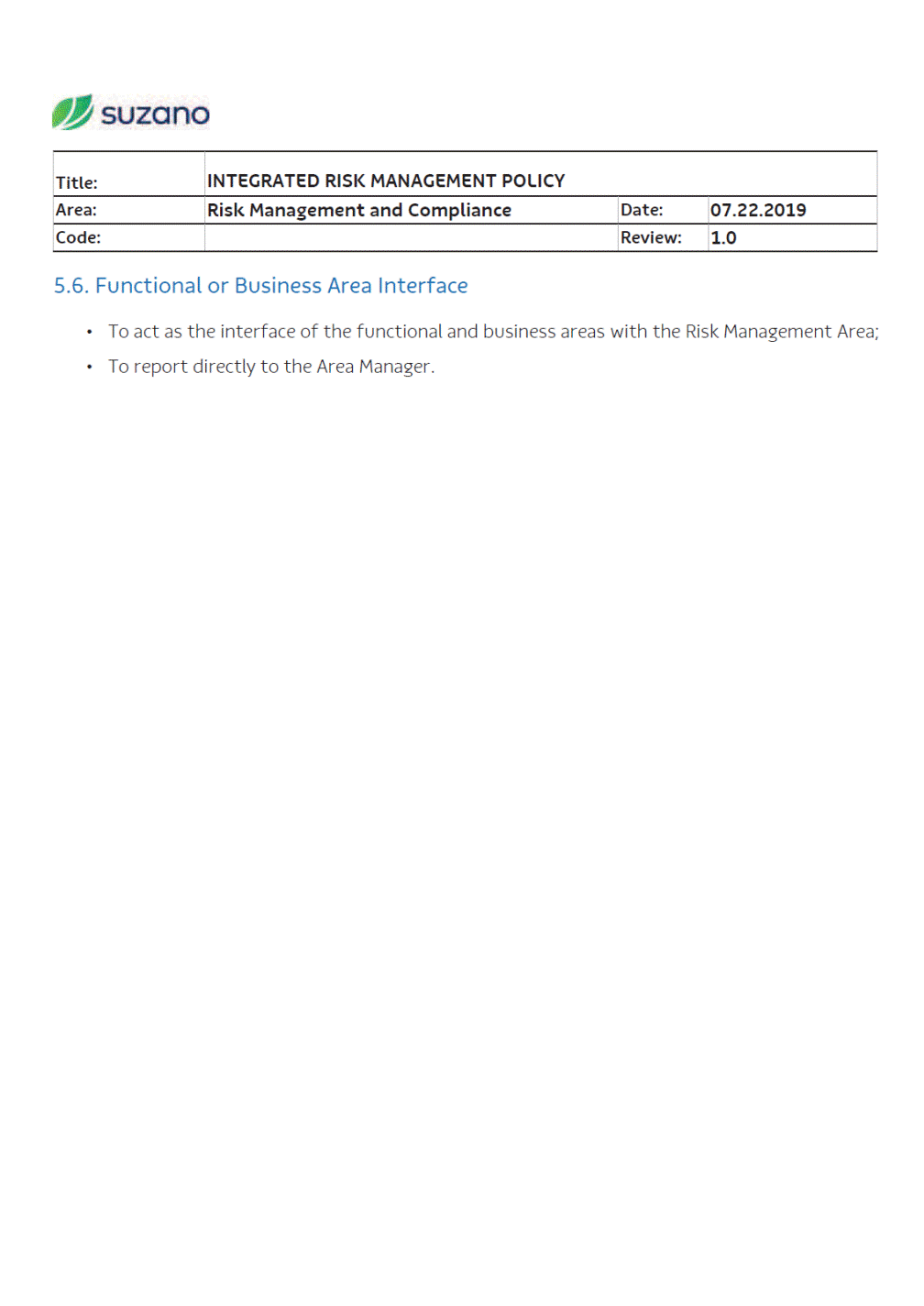
Summary 1 – PURPOSE ......................................................................................................................................................... 2 2 - SCOPE ............................................................................................................................................................... 2 3 – REFERENCE DOCUMENTS............................................................................................................................. 2 4 – TERMS, DEFINITIONS AND ABBREVIATIONS ............................................................................................. 3 4.1. Abbreviations ................................................................................................................................................ 3 4.2. Definitions ..................................................................................................................................................... 3 5 – GUIDELINES..................................................................................................................................................... 5 5.1. Assumptions.................................................................................................................................................. 5 5.2. Approval and Implementation .................................................................................................................. 6 5.3. Governance Group........................................................................................................................................ 7 5.4. Prohibited Transactions ............................................................................................................................. 8 6 – RESPONSIBILITIES.......................................................................................................................................... 8 7 – POLICY APPROVAL ......................................................................................................................................... 9 8 – DISCLOSURE ................................................................................................................................................... 9 9 – ASSOCIATED RISKS ...................................................................................................................................... 10 10 – EXHIBIT I Related Party Transaction Reporting Form ....................................................................... 12 Title: RELATED PARTY POLICY Area: Legal Management Date: 07.22.2019 Code: Review: 0.0.
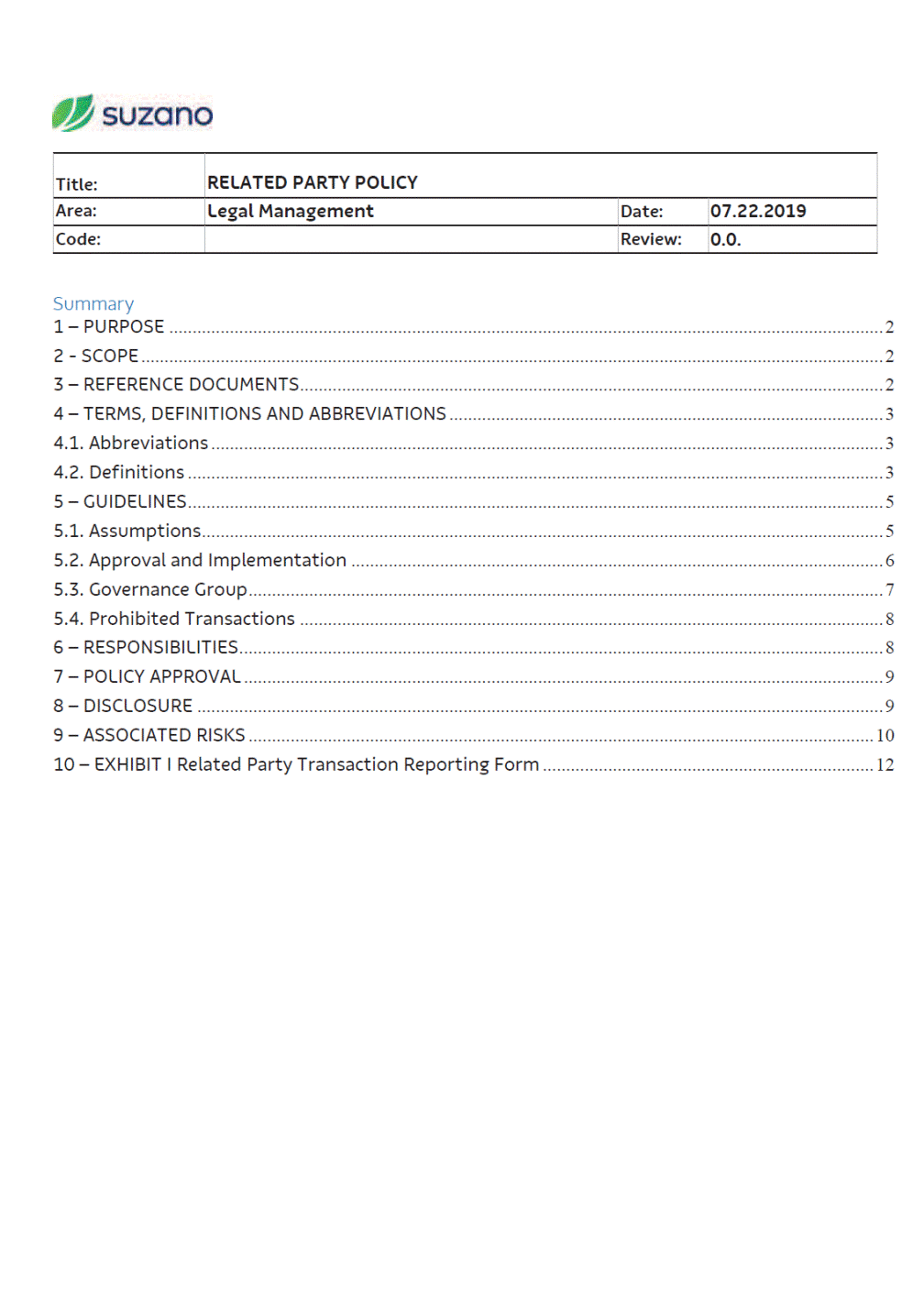
1 – PURPOSE The purpose of this Policy is to establish rules and consolidate the procedures to be followed in transactions involving Related Parties (as defined below), in order to preserve Suzano's interests, transparency and best practices of Corporate Governance. 2 - SCOPE This Policy applies to Suzano S.A. (“Suzano” or “Company”) and the parties that may be considered as Related Parties hereunder, as well as its managers, shareholders and employees in situations where there may be potential conflict of interest. 3 – REFERENCE DOCUMENTS CPC 00 (R1) – Conceptual Framework for Preparation and Disclosure of Financial Accounting Report IAS 24 – Related Party Disclosures CVM Resolution No. 642/2010 - Approves the Technical Pronouncement CPC 05 (R1) of the Accounting Pronouncement Committee – CPC on Related Party Disclosures Suzano Code of Conduct Law 6,404/1976 – Brazilian Corporation Law CVM Ruling No. 480/2009 - Provides for the registration of issuers of securities admitted to trading on regulated securities markets (Exhibit 24 - Reference Form Content and Exhibit 30-XXXIII - Related Party Transaction Notice) Section 13 or 15(d) of the United States Securities Exchange Act of 1934 (SEC 1852) Title: RELATED PARTY POLICY Area: Legal Management Date: 07.22.2019 Code: Review: 0.0.

4 – TERMS, DEFINITIONS AND ABBREVIATIONS 4.1. Abbreviations CPC – Committee of Accounting Pronouncements CVM – Brazilian Securities Commission IASB – International Accounting Standards Board IFRS – International Financial Reporting Standards SEC – Securities and Exchange Commission, from United States of America 4.2. Definitions Related Party means the person or entity related to Suzano and/or its subsidiaries: (a) A person, or a close member of his/her family, is related to the Company if: (i) he/she has full or shared control of the Company; (ii) he/she has significant influence over the Company; or (iii) he/she is a member of key management personnel of the Company or its Parent Company. (b) An entity is related to Suzano if any of the following conditions is met: (i) the entity and the Company are members of the same group (which means that the parent company and each subsidiary are interrelated, as well as the entities under common control are related to each other); (ii) the entity is an affiliate or joint venture of a third entity (or affiliate or joint venture member of a group of which the other entity is a member) and the Company is an affiliate or controlled by such third entity; (iii) the entity and the Company are joint ventures of a third entity; (iv) one entity is a joint venture of a third entity and the other entity is affiliated with such third entity; (v) the entity is a post-employment benefit plan whose beneficiaries are employees of the entity and Suzano; (vi) the entity is wholly or jointly controlled by a person identified in item(a); (vii) a person identified in item (a) (i) has significant influence over the entity, or is a member of key management personnel of the entity (or parent company of the entity); and Title: RELATED PARTY POLICY Area: Legal Management Date: 07.22.2019 Code: Review: 0.0.
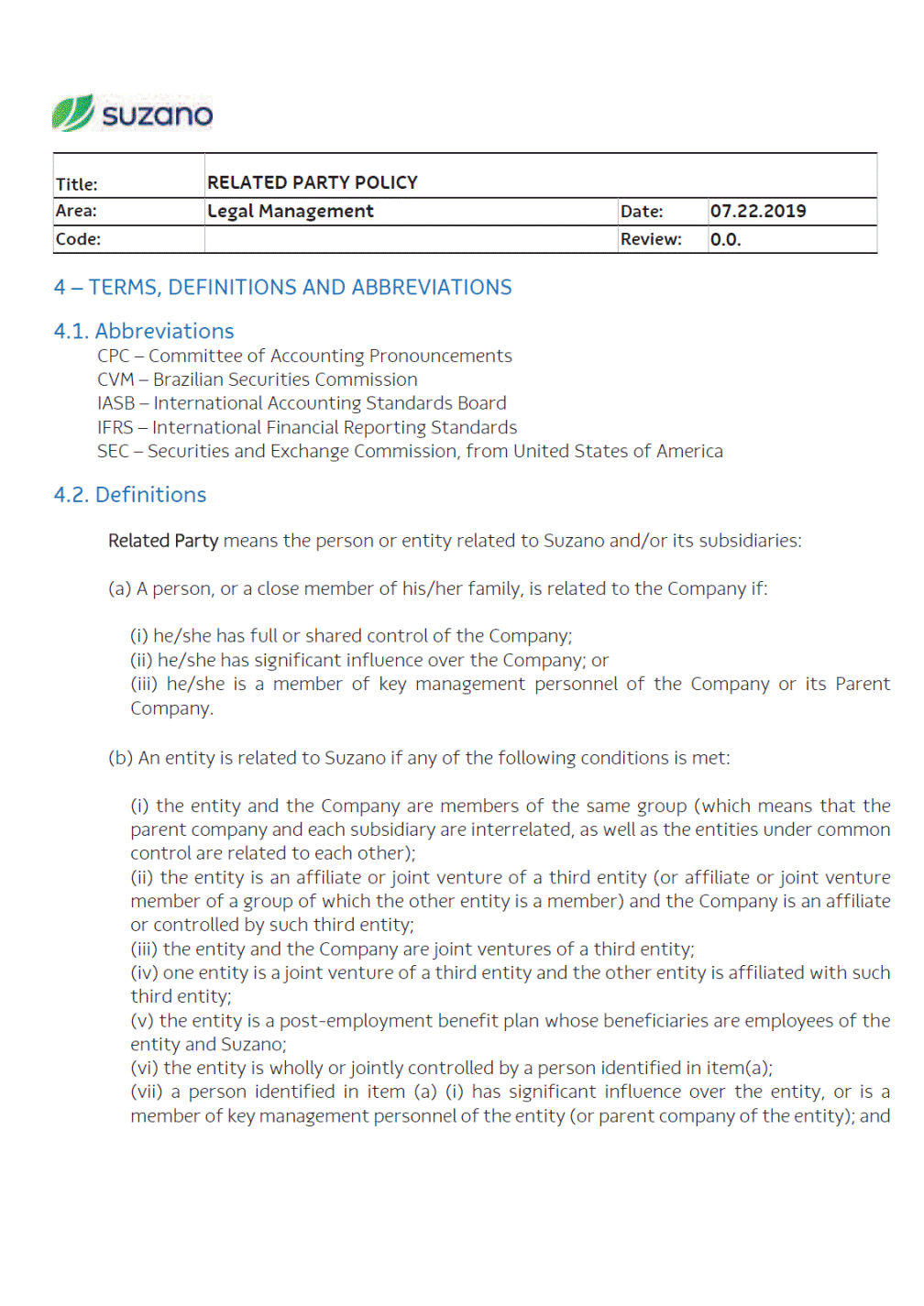
(viii) the entity, or any member of the group to which it belongs, provides services of key personnel of the Company's management or to the Company’s parent company. In the definition of related party, an affiliate includes subsidiaries of that affiliate and a joint venture includes subsidiaries of a joint venture. Therefore, e.g., the subsidiary of an affiliate and the investor that has significant influence over the affiliate are related parties. Close family members of a person listed in item “a” above means those family members who are expected to influence or be influenced by the person in their business with the entity and include: (a) the children of the person, spouse or partner; (b) the children of the person's spouse or partner; and (c) dependents of the person, their spouse or partner. Related Party Transaction means a transfer of funds, services or obligations between the Company and a related party, whether or not a price is charged in consideration. Key management personnel means persons with authority and responsibility for the planning, direction and control of the Company's activities, directly or indirectly, including any manager (executive or otherwise) of such Company. In the context of this Policy, the following shall not be deemed as related parties: (a) two entities simply because they have a manager or other member of key management personnel in common, or because a key management personnel member of the entity has significant influence over the other entity; (b) two joint ventures simply because they share joint control over a joint venture; (c) (i) entities providing financing; (ii) labor unions; (iii) entities providing public services; and (iv) governmental departments and agencies that do not fully or jointly control or have a relevant influence over the entity reporting the information simply because of their normal business with the entity (even if they may affect the entity's freedom to act or participate in the decision making process); Title: RELATED PARTY POLICY Area: Legal Management Date: 07.22.2019 Code: Review: 0.0.
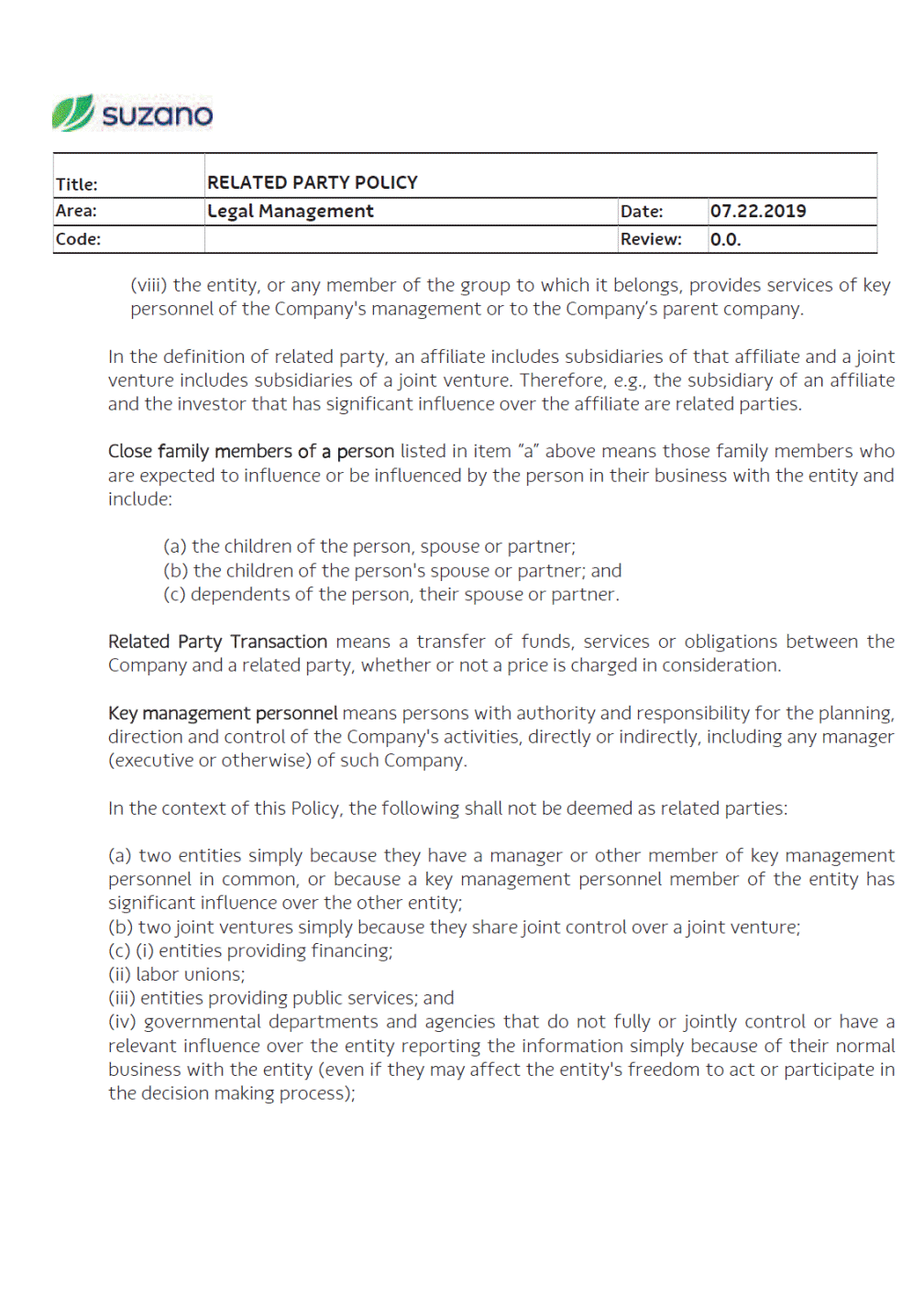
(d) customer, supplier, franchisor, dealer, distributor or general agent with whom the entity has significant business, merely because of the resulting economic dependence. 5 – GUIDELINES 5.1. Assumptions Related Party Transactions are permitted in compliance with the regulations and terms of this Policy, provided that in transactions involving Related Parties, the following conditions shall be met: a) related party transactions shall be governed by the same principles, rules and market conditions to which other negotiations with parties independent to the Company are subject. The Company is responsible for ensuring that such transactions are carried out in accordance with this Policy, Suzano Code of Conduct, Law 6,404/76 (Brazilian Corporation Law), and other rules and regulations issued by regulatory authorities to which the Company is subject; b) except for the transactions set forth in item 5.2.1, Related Party transactions shall be disclosed clearly and objectively in Suzano’s financial statements, according to item 8 below, for the proper understanding of their nature by the users of such information; c) except for the transactions set forth in item 5.2.1, a related party transaction shall be reviewed by the Governance Group prior to be contracted; d) the Board of Directors shall approve Related Party transactions whose total amount exceeds Fifty Million Brazilian reais (R$ 50,000,000.00) or when it exceeds 1% of the Company's total assets; and e) the Board of Directors shall be informed of Related Party transactions exceeding One Million Brazilian reais (R$ 1,000,000.00) in the aggregate, provided that it involves an entity related to one of the members of the Board of Directors. Without prejudice to the role of the Governance Group (defined below), this Policy allows the authority responsible for the approval of Related Party transactions to request, when it deems necessary, prior to the approval of specific transactions, market alternatives to the related party transaction in question, adjusted by the risk factors involved. Related party transactions may be based on independent audit reports prepared without the participation of any party involved in the transaction in question, whether it is a bank, attorney, Title: RELATED PARTY POLICY Area: Legal Management Date: 07.22.2019 Code: Review: 0.0.
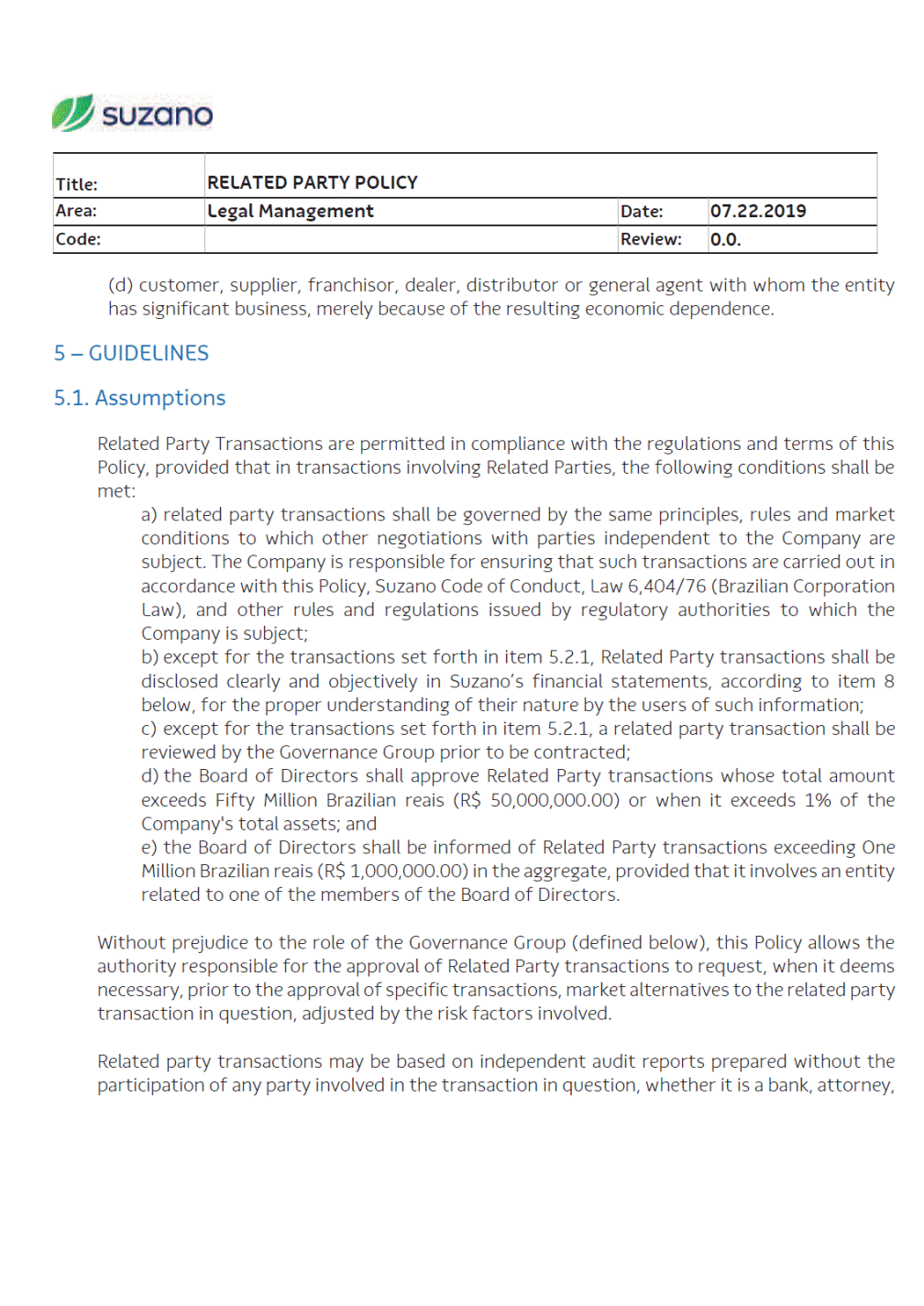
specialized consulting firm, among others, based on realistic assumptions and information endorsed by third parties. In the event of a related party transaction approval involving a manager or key personnel of the Company, the persons involved shall promptly disclose their conflict of interest. In addition, they should be absent from discussions on the topic and refrain from voting. If requested by the Chairman of the Board of Directors or the Chief Executive Officer, such managers or key personnel may partially participate in the discussion to provide further information about the transaction and the parties involved. In this case, they should be absent from the final part of the discussion, including the voting on matter. Any corporate reorganizations involving related parties shall ensure fair treatment for all stockholders. 5.2. Approval and Implementation 5.2.1. Transactions between the Company and its wholly owned subsidiaries. The transactions between the Company and its direct or indirect wholly owned subsidiaries, provided that they are intended for the corporate purpose of the subsidiary and the Company and are under the conditions recommended by the areas involved in such contracting shall not be subject to the forms and procedures described herein and shall be carried out upon approval of the area responsible for such business. In this case, the transactions shall be disclosed in the form of item 8. Transactions involving affiliates of the Company or other entities in which there is an interest of entities or persons not related to the Company, such as joint ventures, in which the Company holds an interest shall not be deemed 100% owned. 5.2.2. Except for the transactions described in item 5.2.1, related party transactions shall: (i) meet the conditions described in item 5.1 above; (ii) follow the minimum verification procedures described in item 5.2.3 below; and (iii) be previously evaluated by the Governance Group (defined below). In forwarding the form to the Governance Group, the party interested in the transaction shall fill out the form set out in Exhibit I hereto and clarify any points presented by the Governance Group during its review. Title: RELATED PARTY POLICY Area: Legal Management Date: 07.22.2019 Code: Review: 0.0.
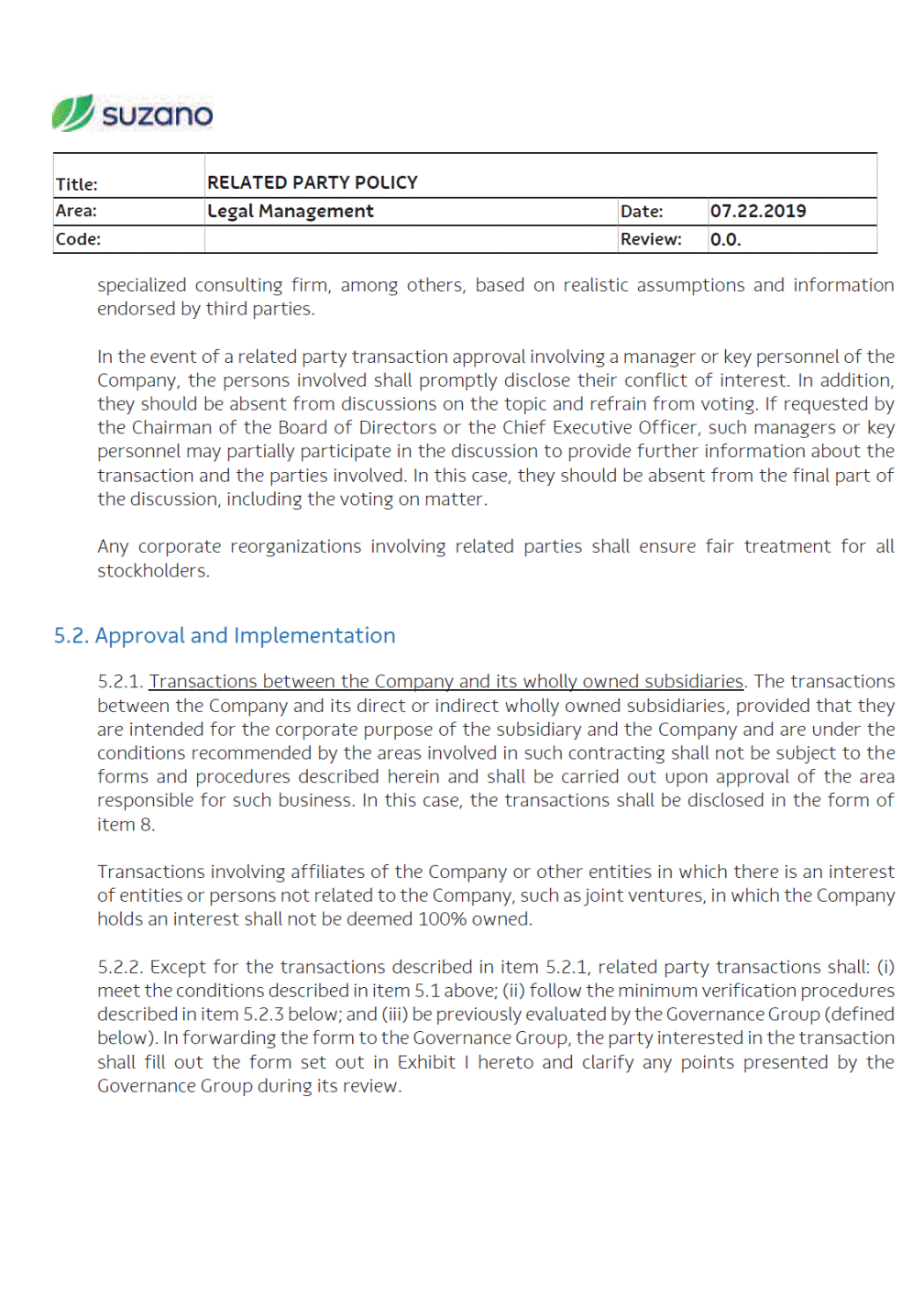
5.2.3. Except for the transactions described in item 5.2.1, related party transactions shall be (a) subject to a written instrument, such as, articles of association or contractual instrument. The written instruments shall follow the Company’s contracting policies and meet at least the conditions to verify if the contracting criteria satisfy the conditions that allow such transaction, such as price, terms and guarantees; and (b) shall be preceded by a minimum number of offers or quotes from companies of similar capacity as provided in the Centralized Purchasing Procedure. Sales cases shall satisfy the same criteria based on market data. 5.3. Governance Group The Governance Group is a group composed by members of the Company that shall be responsible for assessing the compliance with certain Company’s policies, as set forth in the respective policies and the Governance Group's Rules. In the case of this Policy, the Governance Group will receive the information involving Related Party transactions as provided for in item 5.2.3 (“Governance Group”). The Governance Group is responsible for: (i) protecting this policy; (ii) discussing and interpreting, as required, any doubts about the characterization of a related party transaction or the related party condition; (iii) advising on the procedures arising from this Policy; (iv) requesting more information for supporting the recommendations; (v) refusing transactions identified as prohibited; and (vi) recommending specific changes, adjustments or measures to give effect to the transaction. The Governance Group will be composed of members from the following areas of the Company: (i) Compliance; (ii) Legal; (iii) Controllership; (iv) Investor Relations; and (v) Internal Controls. The Governance Group shall be accessed by means of the communication channel partesrelacionadas@suzano.com.br. The Governance Group will meet together to express an opinion on a new Related Party transaction whenever it is informed by the party involved in the transaction. It is hereby established that the party involved in the transaction/negotiation shall inform the Governance Group and the Governance Group may invite other persons to advise and/or provide additional clarification for the transaction evaluation and issuance of the Technical Report. The Opinion and/or guideline issued by the Governance Group shall be adhered to by the party involved in the negotiation and duly filed as transaction record (whether carried out or not). Title: RELATED PARTY POLICY Area: Legal Management Date: 07.22.2019 Code: Review: 0.0.
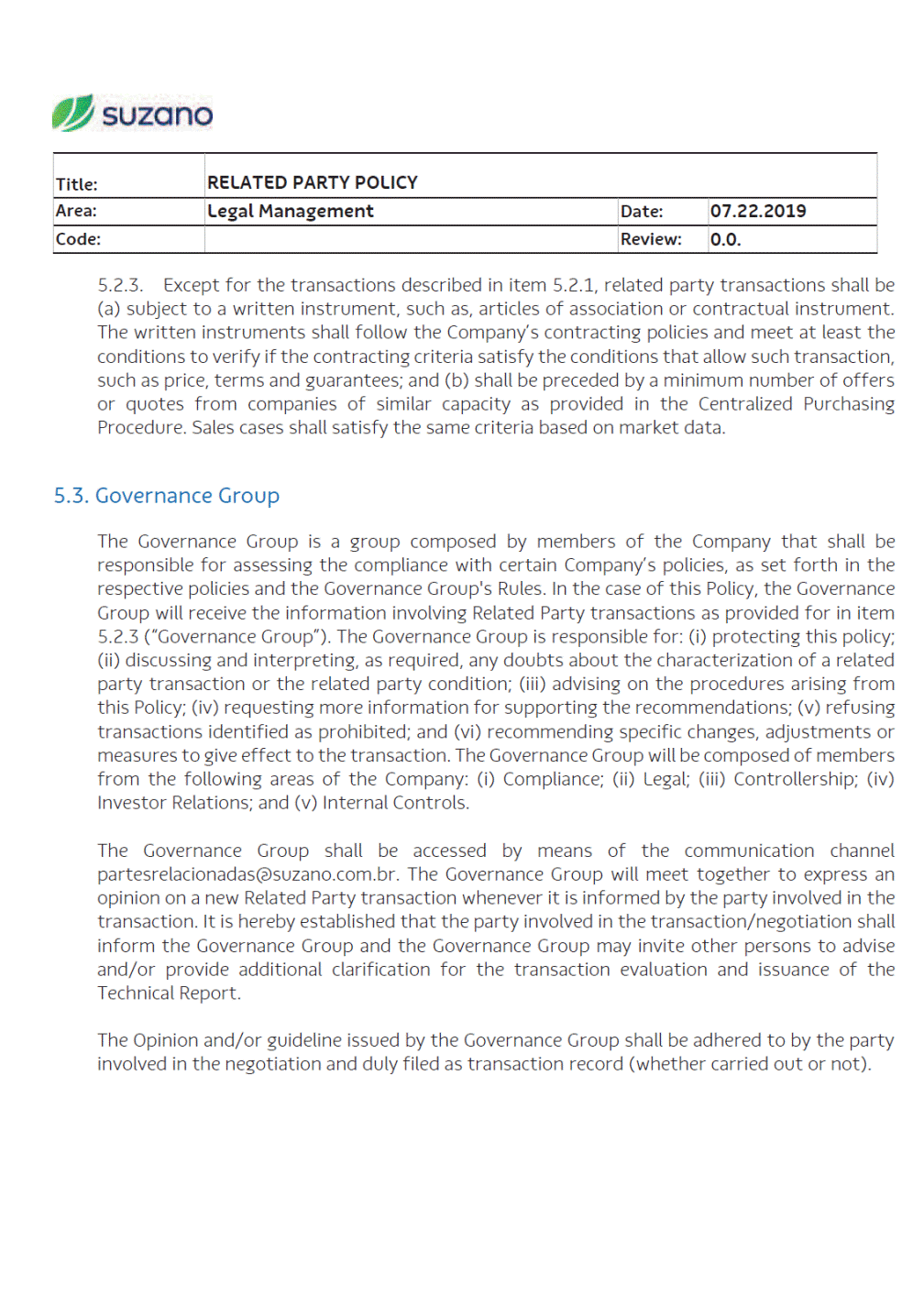
If the Governance Group has made its recommendation and the transaction is entered into otherwise than recommended, the related party transaction shall be approved by the immediate superior of the person empowered to approve that transaction with a party not related to the Company. In the event that the applicant or regular approver is an Executive Officer, the transaction may be approved by the collegiate body of the Executive Board of Officers. The Governance Group shall forward the evaluated and executed transactions exceeding the amount of Five Hundred Thousand Brazilian reais (R$ 500,000.00) to the Company’s Statutory Audit Committee with information on the valuation content and transaction data. 5.4. Prohibited Transactions The following related party transactions are prohibited: a) Those carried out under adverse market conditions that adversely affect or impair the Company's interests; b) Participation of employees and managers in business of a private or personal nature that interferes with or conflicts with the Company’s interests or results from the use of confidential information obtained as a result of the exercise of their position or function in the Company; c) Those foreign to the Company's corporate purpose or without observing the limits provided for in the rules established by the Company's Management; d) Loans and guarantees to Controlling Shareholders and Managers; and e) Any form of compensation of advisors, consultants or intermediaries generating conflict of interest with the Company, managers, shareholders or classes of shareholders. 6 – RESPONSIBILITIES It is a duty of all Company’s Employees, Managers and Shareholders to follow this Policy and the provisions of Suzano's Code of Conduct. The management members shall disclose this Policy to Suzano's employees and other managers and ensure its compliance. The Legal Department shall be responsible for: Title: RELATED PARTY POLICY Area: Legal Management Date: 07.22.2019 Code: Review: 0.0.

a) Revisiting the Company’s corporate structure on an annual basis to define the Related Parties, according to the equity control; b) Ensuring the annual updates of the Related Parties list relating to the Statutory Executive Board of Officers; and c) Consolidating the Related Party base together with the information of Directors managed by the Corporate Governance area and making it available to CSC. Controllership shall have the support of Accounting (CSC) to establish and execute controls that guarantee the accuracy of the financial statements; due disclosure of related party transactions and report quarterly to the Statutory Audit Committee the transactions occurred in the period. 7 – POLICY APPROVAL The Board of Directors shall approve and implement this Policy and the Management, Shareholders, Employees and other Parties Related to the application hereof. The Corporate Legal Department shall have the support from the Related Party Transactions Governance Group to review and update, at least every two years or as necessary, this Policy in order to keep it up-to-date with current rules and best market practices on the topic. Ongoing transactions shall have to comply with the conditions of this Policy within thirty (30) days from the date of publication of this Policy. 8 – DISCLOSURE Pursuant to the regulations in force, the Company shall make adequate disclosure to the market of the relationship and transactions between the Company and its Related Parties. The disclosure shall be clear and accurate in the notes to the Company’s Financial Statements, provided that it provides sufficient details to identify Related Parties and any information essential to the transactions mentioned as set forth in CVM Resolution No. 642/2010, in order to provide information analysis and follow-up of the Company's management by users of the financial statements. Title: RELATED PARTY POLICY Area: Legal Management Date: 07.22.2019 Code: Review: 0.0.

The Company also has the duty to promote the disclosure of Related Party transactions to the market, under the terms set forth in B3's Novo Mercado Listing Regulation with respect to the quarterly information (ITR) supplementary requirements and also, within 7 business days of the transaction, pursuant to CVM Ruling No. 480/200 on the Reference Form and its Exhibit 30-XXXIII on the communication of Related Party Transactions. In addition, in compliance with the Capital Market Act, the Company shall disclose its information on the CVM Reference Form - RF and SEC 20-F, which contains detailed information on transactions involving Related Parties. The Company shall also disclose such information to governmental supervisory authorities, whenever required, such as: I) Brazilian Revenue Service – Statement on the Use of Foreign Currency Funds Arising from Receipt of Exports (DEREX) ii) Central Bank - Brazilian Capitals Abroad (CBE) Transactions and balances with subsidiaries and joint ventures are eliminated in the preparation of the Company's consolidated financial statements. 9 – ASSOCIATED RISKS (a) Absence of internal procedures related to the identification and proper treatment in transactions involving related parties of the Company, its subsidiaries, affiliates, joint ventures and companies over which the Company, its employees, management and shareholders have significant influence. (b) Absence of risk management and internal control failures that mitigate the risks associated with related party transactions of the Company, its subsidiaries, affiliates, joint ventures and companies over which the Company, its employees, management and shareholders have significant influence; (c) Distortion of the Company's financial information, including Quarterly Information - ITR, Annual Financial Statements, Standardized Financial Statements, Reference Form, including Exhibit 30-XXXIII of CVM Ruling No. 480/2009, and SEC 20F Form, as of classification and incorrect, absent or missing presentation of related party transactions involving the Company, its subsidiaries, Title: RELATED PARTY POLICY Area: Legal Management Date: 07.22.2019 Code: Review: 0.0.
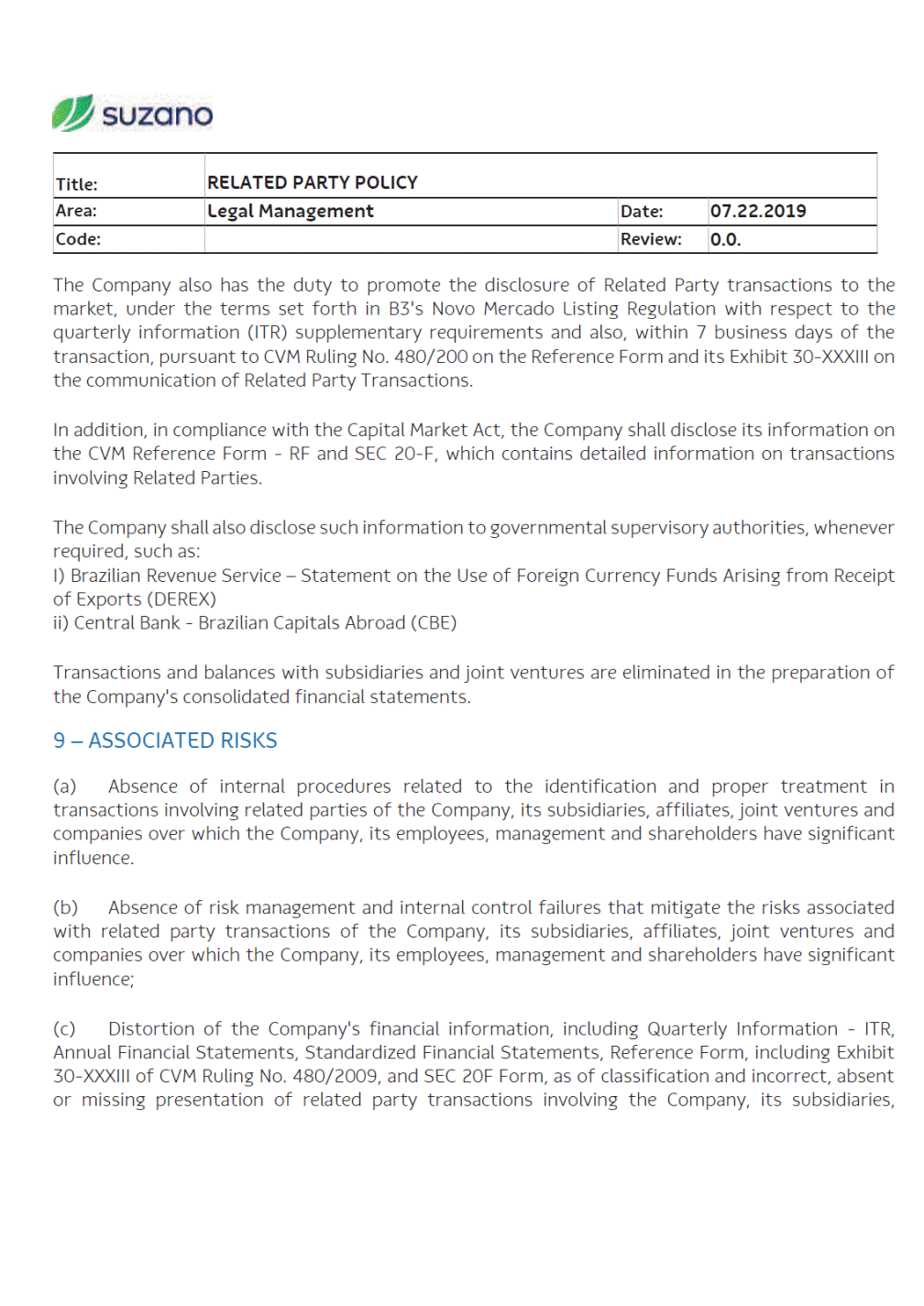
affiliates, joint ventures and companies over which the Company has significant influence, in accordance with the standards, pronouncements and interpretations issued by the Accounting Pronouncement Committee. (CPC) and the International Accounting Standards Board (IASB) for IFRS, and approved by the Brazilian Securities and Exchange Commission (CVM). The inaccuracy or omission in disclosing information about related party transactions exposes the Company to inspections by regulatory authorities and subjects it to legal and disciplinary sanctions. Title: RELATED PARTY POLICY Area: Legal Management Date: 07.22.2019 Code: Review: 0.0.

10 – EXHIBIT I Related Party Transaction Reporting Form Formu lario - Reporte Tran sação P Ref. Document Prepared by Approved by Date Valid until Related Party Policy Legal Related Party Governance Group Legal Related Party Governance Group and The Board of Directors 07/22/2019 07/22/2021 Title: RELATED PARTY POLICY Area: Legal Management Date: 07.22.2019 Code: Review: 0.0.
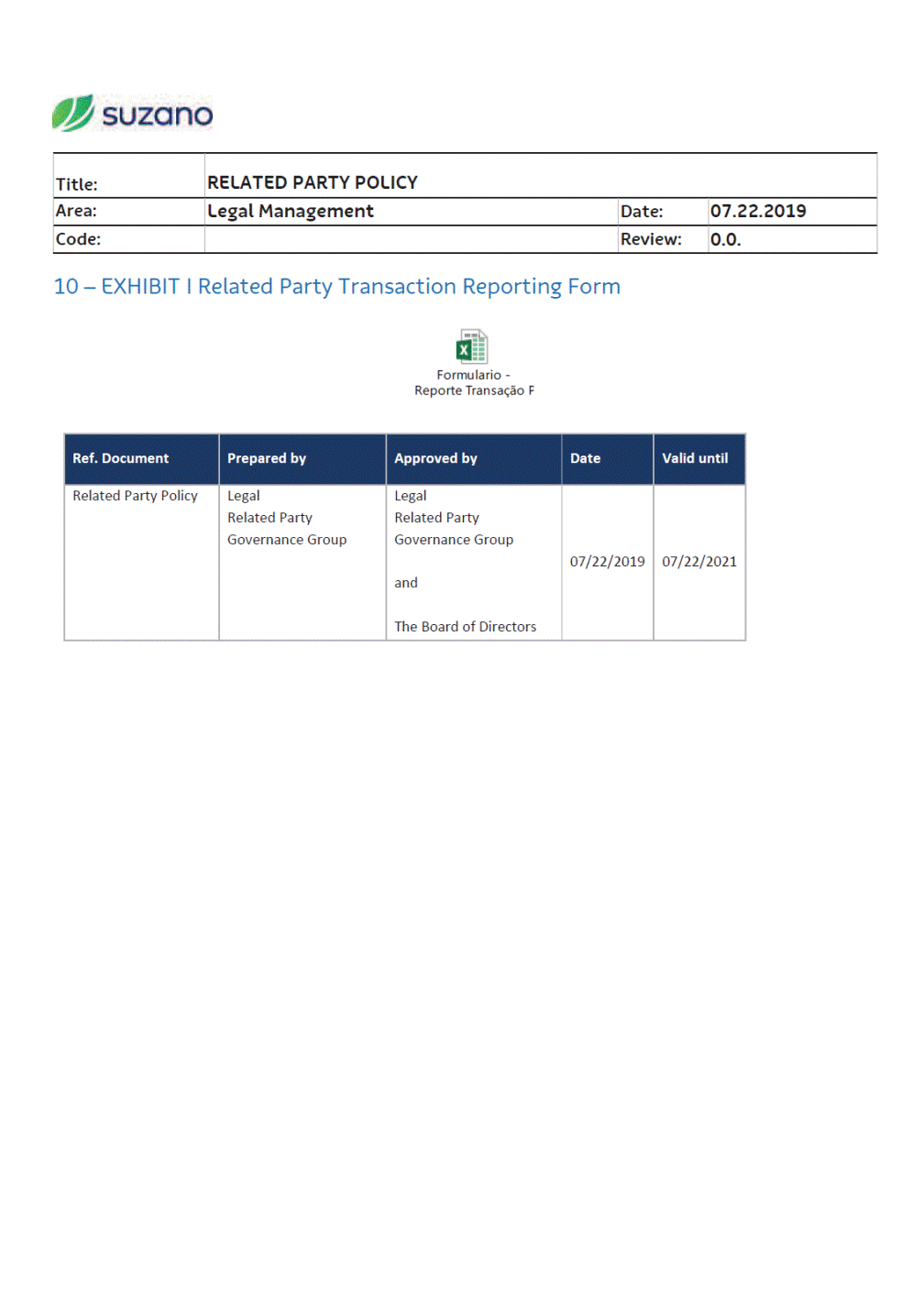
SUZANO S.A. INTERNAL RULES OF THE BOARD OF DIRECTORS SECTION I BOARD OF DIRECTORS 1. The Board of Directors of SUZANO S.A. (the “Corporation”) is a collegiate body, and its duties are set forth pursuant to Law No. 6,404/76, the Corporation’s Bylaws and other applicable regulatory rules. 2. The Corporation’s Board of Directors (the “Board” or “Board of Directors”) shall make collegiate decisions, the will of which is expressed by resolution and vote of the majority of the Directors, no duty in the Corporation’s management is conferred upon its members (the “Directors”) separately. SECTION II STRUCTURE AND OPERATION OF THE BOARD OF DIRECTORS 3. As provided for in Article 12 of the Corporation’s By-laws, the Board of Directors shall be composed of at least 5 (five) and no more than ten (10) members, whether resident in the country or not, and at least 20% of the Directors elected to be deemed as Independent Directors, as defined by B3 S.A’s New Market Listing Regulation - Brazil, Stock Exchange, Over-the-Counter (“B3”), being also deemed as Independent Directors.those elected pursuant to article 141, 4th and 5th paragraphs of Law No. 6,404/76. 3.1. The members of the Board of Directors shall be elected and removed at any time by the General Meeting and shall have a unified term of office of two (2) years, and the re-election is allowed. The members of the Board of Directors will not hold executive positions in the Corporation. 3.1.1. The members of the Corporation’s Board of Directors shall meet the following requirements: (i) (ii) (iii) (iv) (v) personal integrity; no conflicts of interest with the Corporation; time availability; motivation to perform the function; and aligment with the Corporation’s values. Approved on the Board of Directors’ Meeting held on July 22, 2019. 1
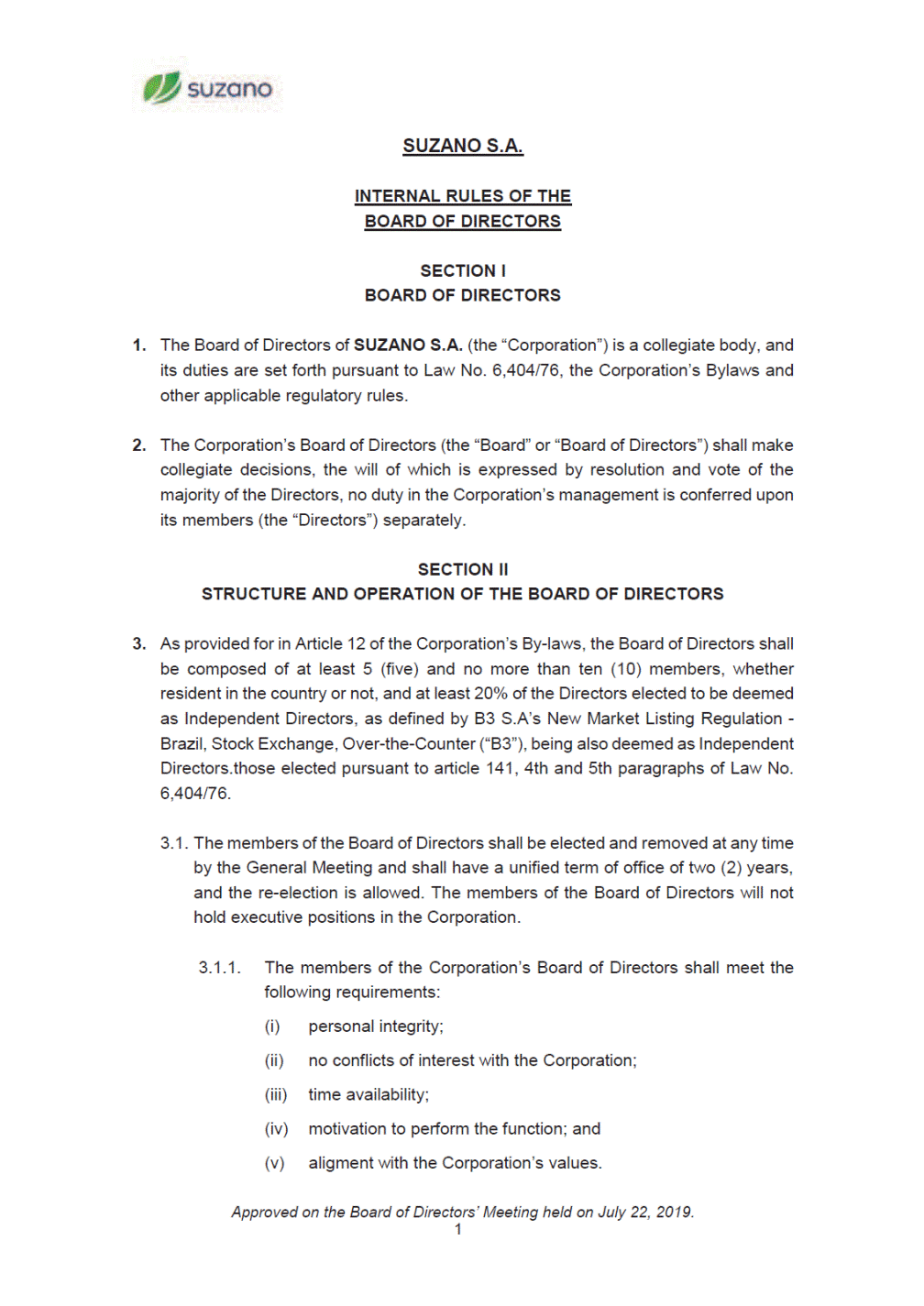
3.1.2. It is desirable that, in addition to the requirements set forth in Clause 3.1.1 above, the Board of Directors seek, in its structure, the diversity of experience and knowledge, composed of the following criteria: (i) experience as an executive; (ii) specific knowledge of the Corporation’s industry and business; (iii) strategic vision; (iv) accounting, economic and financial knowledge; (v) knowledge of innovation; (vi) securities market knowledge and investor relations; (vii) legal knowledge; (viii) experience in people management; (ix) knowledge of best corporate governance practices; (x) experience in risk management and compliance; (xi) relationship with clients and the Corporation’s business market; and (xii) knowledge of social and environmental sustainability. 3.2. The Board of Directors will have a Chairman (the “Chairman”) and may have up to two (2) Vice-Presidents, who may be appointed by the same General Meeting that elects them or by the Board of Directors. The Board may also appoint any of the Corporation’s managers or employees to act as corporate secretary (“Secretary”). 3.3. Each member of the Board of Directors, upon signing the investiture term pursuant to applicable laws and regulations, including, but not limited to, the New Market Listing Regulation, shall submit to the Corporation the following documents: (i) a certified copy of the identity card; Approved on the Board of Directors’ Meeting held on July 22, 2019. 2
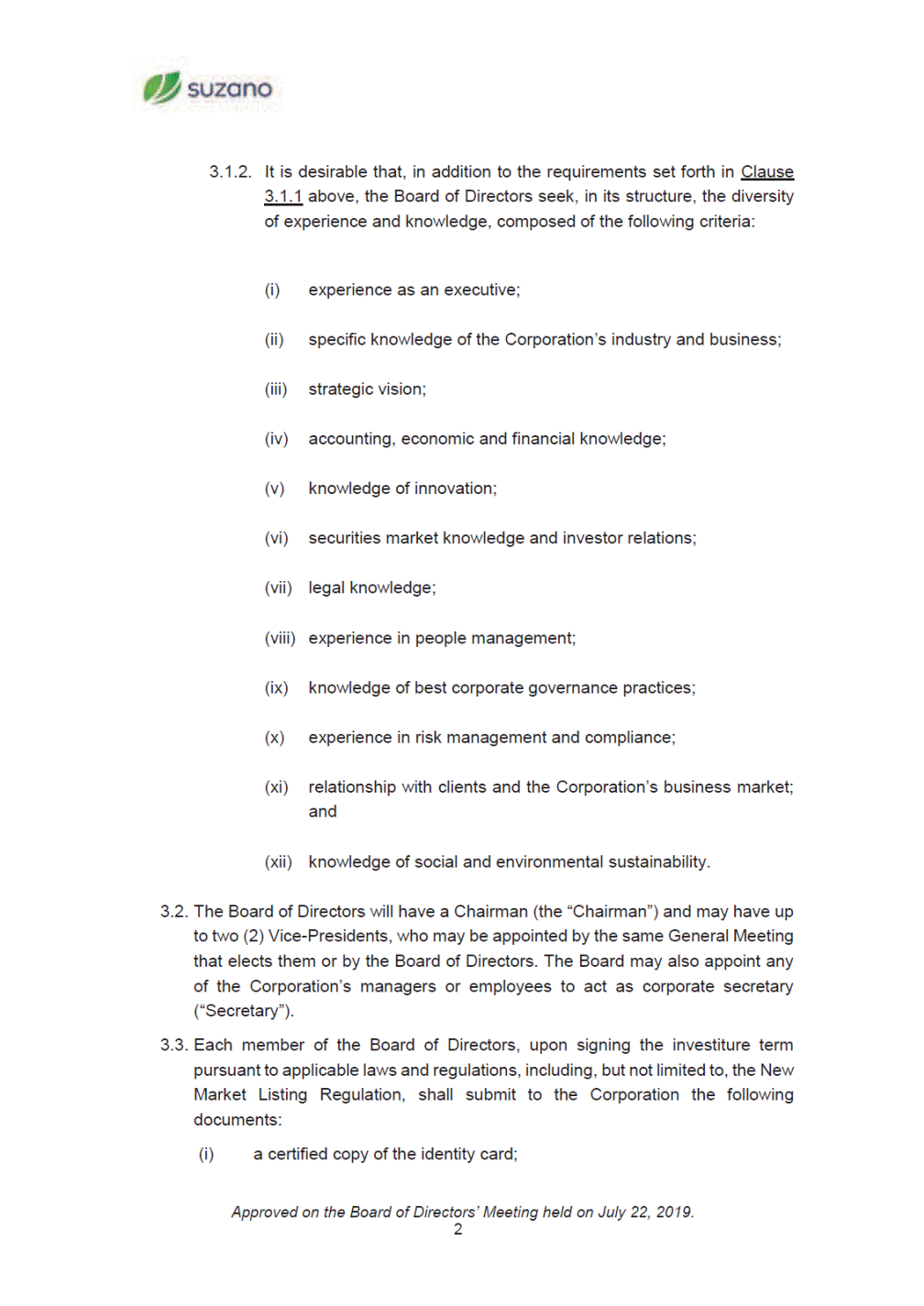
(ii) (iii) a certified copy of the CPF registration document; a statement that he/she is not prevented by special law, or convicted of bankruptcy, of misrepresentation, bribery, concussion, embezzlement, against the popular economy, public faith or property, or the further criminal penalty which prevents, even if temporarily, access to public office, as provided for in article 147, paragraph 1 of Law 6,404/76; a statement that he/she is not condemned to a penalty of suspension or temporary disqualification imposed by the Brazilian Securities Commission, rendering him/her ineligible for publicly-held corporation management positions, as established in article 147, paragraph 2 of Law 6,404/76; a statement signed under the penalties of law that he/she is not prevented from trading or managing a trading corporation by virtue of criminal conviction; a statement that he/she meets the requirement of unblemished reputation established by article 147, paragraph 3 of Law 6,404/76; a statement that he/she does not hold a position in a company that can be considered a direct competitor of the Corporation, and does not have, nor represents, any interest conflicting with the Corporation, pursuant to article 147, items I and II, paragraph 3 of Law 6,404/76; a statement about the number of stocks, warrants, stock options and stock convertible debentures issued by the Corporation and its subsidiaries or companies of the same group held by it; a statement that he/she have not suffered any (a) criminal convictions, even if not final judgment; (b) administrative proceeding of the Brazilian Securities Commission (“CVM”), even if not final judgment or (c) judicial or administrative final judgment, which has suspended or disqualified him/her to practice a professional or business activity; and a statement that he/she is or is not deemed a Politically Exposed Person, pursuant to applicable regulations. (iv) (v) (vi) (vii) (viii) (ix) (x) 4. In his temporary absences, the Chairman of the Board of Directors shall be replaced by one of the Vice-Presidents of this body, and the substituted Chairman shall appoint the alternate; and when this is not the case, the Board of Directors shall make such appointment. When it relates to any other member who will be replaced by one of his peers, the same criterion will be adopted in the same cases. 4.1. For the purposes of the introductory section of this clause, the following shall be considered: Approved on the Board of Directors’ Meeting held on July 22, 2019. 3
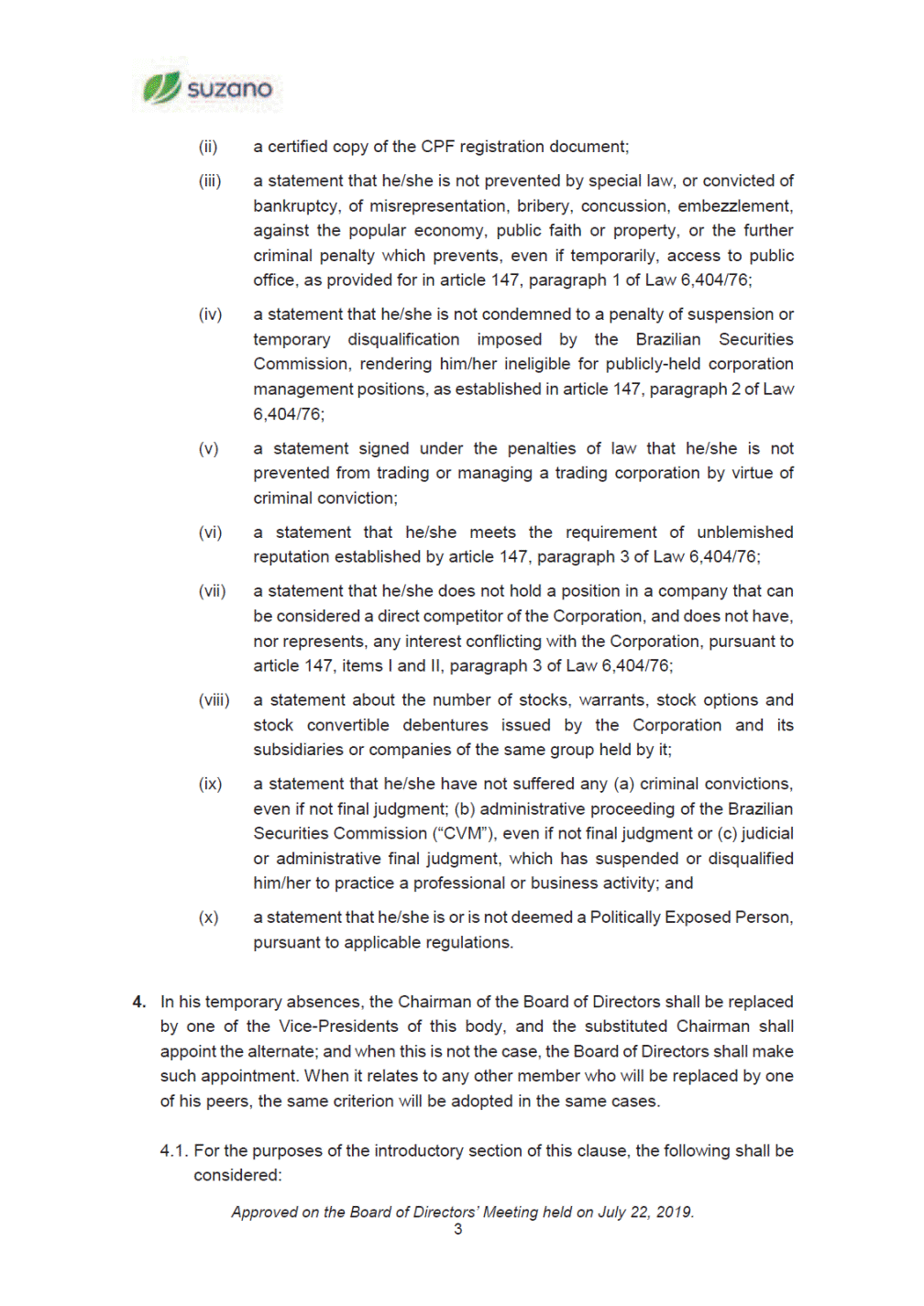
(i) absent, the member of the Board of Directors who fails to attend the meetings of the body; the substitutions provided for in this clause will imply the accumulation of the functions and right to vote at meetings of the Board of Directors, however, it does not apply to the fees and other advantages of the substituted member; and prevented, the member of the Board of Directors who is in a situation of conflict of interest with the Corporation (“Conflict of Interest” or “Conflict of Interests”), as set forth in Clause 21 below, as well as the one that has (ii) (iii) been elected by appointment of a company competing of the Corporation. 4.2. The member who substitutes the absent or prevented Director shall remain in his position until the reasons for absence and/or prevention of the effective member cease. 4.3. The Chairman shall be informed of the replacement of member by written notice or e-mail sent by the substituted member at the time of the meeting, either for the purpose of forming a “quorum” or for voting purposes, with the power to indicate or not the vote, and it is clear that the alternate accumulates the voting right of the substituted member, even if there is no indication of vote. Likewise, the Chairman shall be promptly informed when the member resumes his/her functions. Votes are also accepted by letter, telegram or electronic mail, when received by the Chairman of the Board of Directors or his substitute until the end of the meeting. 4.4. If there is a vacancy on the Board of Directors, the position may remain vacant until the next Annual General Meeting, without prejudice to the substitute being appointed to complete the current term, by the remaining Directors at a meeting of the Board of Directors, pursuant to Article 150 of Law No. 6,404/76, if necessary to maintain the minimum number of members of that body or if it is considered appropriate to fill the position. 5. Except for the event of Conflict of Interests, as provided for in Clauses 21, 22 and 23 below, all information and documents will only be provided or made available to all Directors, and no Director or group of Directors may have information not available to others, as well as making direct contacts with the Corporation, its Officers or employees to request information and/or documents, except as provided in Clause 16 below. Approved on the Board of Directors’ Meeting held on July 22, 2019. 4
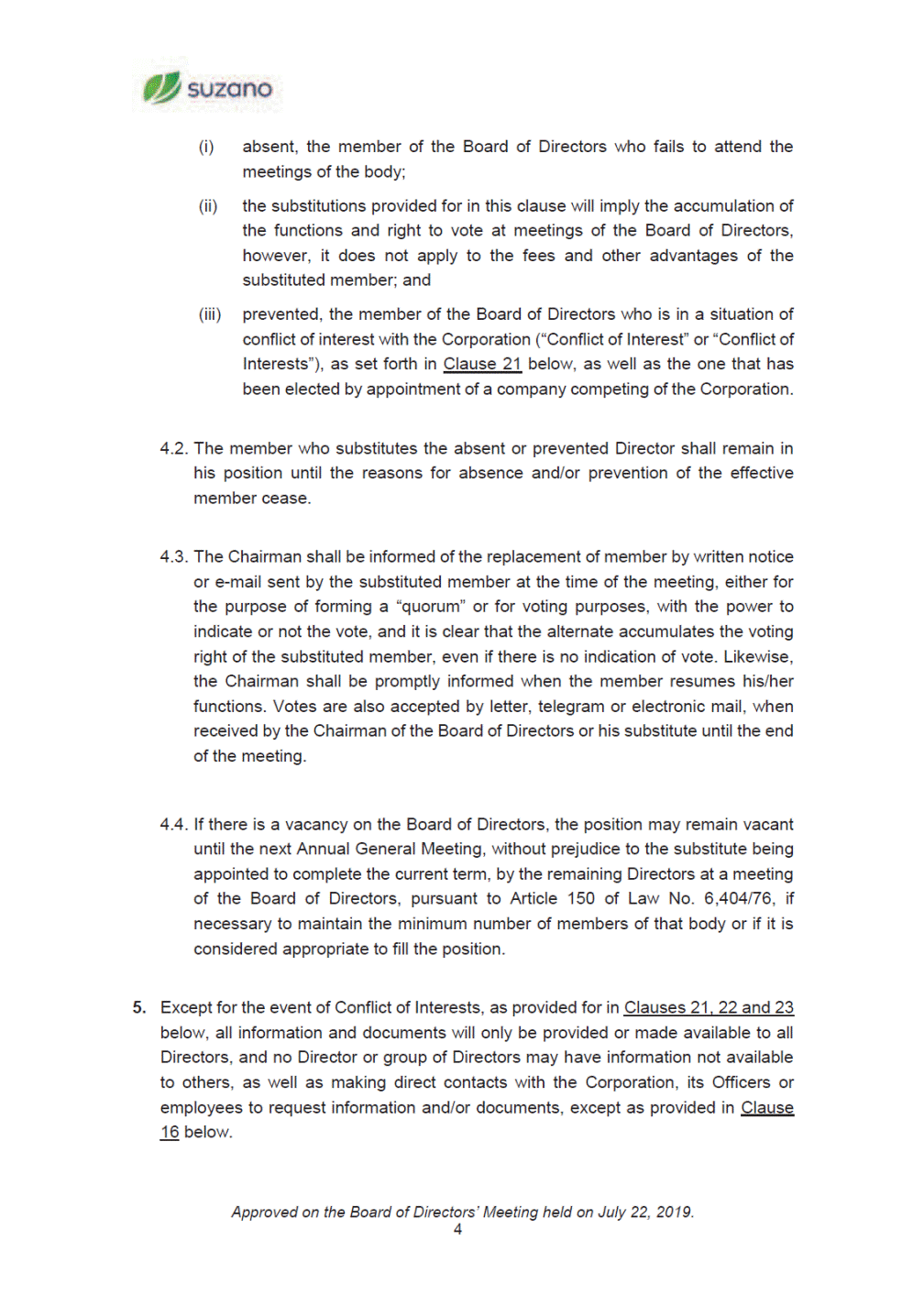
6. The annual meetings of the Board of Directors shall take place at least four (4) times a year, and the extraordinary meetings shall be held at any time, according to the requirements provided for in the Bylaws or when necessary to the Corporation’s interests, by means of call notice of the Chairman of the Board of Directors or at least three (3) Directors. 6.1. The call notice shall be made by letter, e-mail, telegram or facsimile, at least two (2) business days in advance, including the place, date and time of the meeting, as well as, briefly, the agenda. 6.2. Discussion and resolution on matters not contained in the call notice are prohibited, except for the cases of extreme urgency, as considered by the Chairman of the Board of Directors or by decision of the majority of members present. 6.3. The formalities provided for in Clauses 6.1 and 6.2 above may be waived when all the members of the Board of Directors attend the meeting and all agree on the inclusion of new matters on the agenda. 6.4. The meetings of the Board of Directors shall be held at the Corporation’s headquarters or at the place designated by the call notice, and may also be held by conference call or video conference, or any other technological means that allows connecting different locations simultaneously. 6.5. The dissenting member will register his vote in the Minutes of Meeting of the Corporation’s Board of Directors that gives rise to the dissenting vote. 6.6. The Corporation’s Officers or employees may attend the meetings of the Board of Directors whenever called, without being entitled, however, to vote on matters submitted for resolution. 6.7. Each member of the Board of Directors may demand that the procedural rules contained in these Internal Rules be followed by all, and each Director may raise questions of order, and also have the duty to alert the Chairman of any non-compliance with the rules of procedure during the meeting. Approved on the Board of Directors’ Meeting held on July 22, 2019. 5
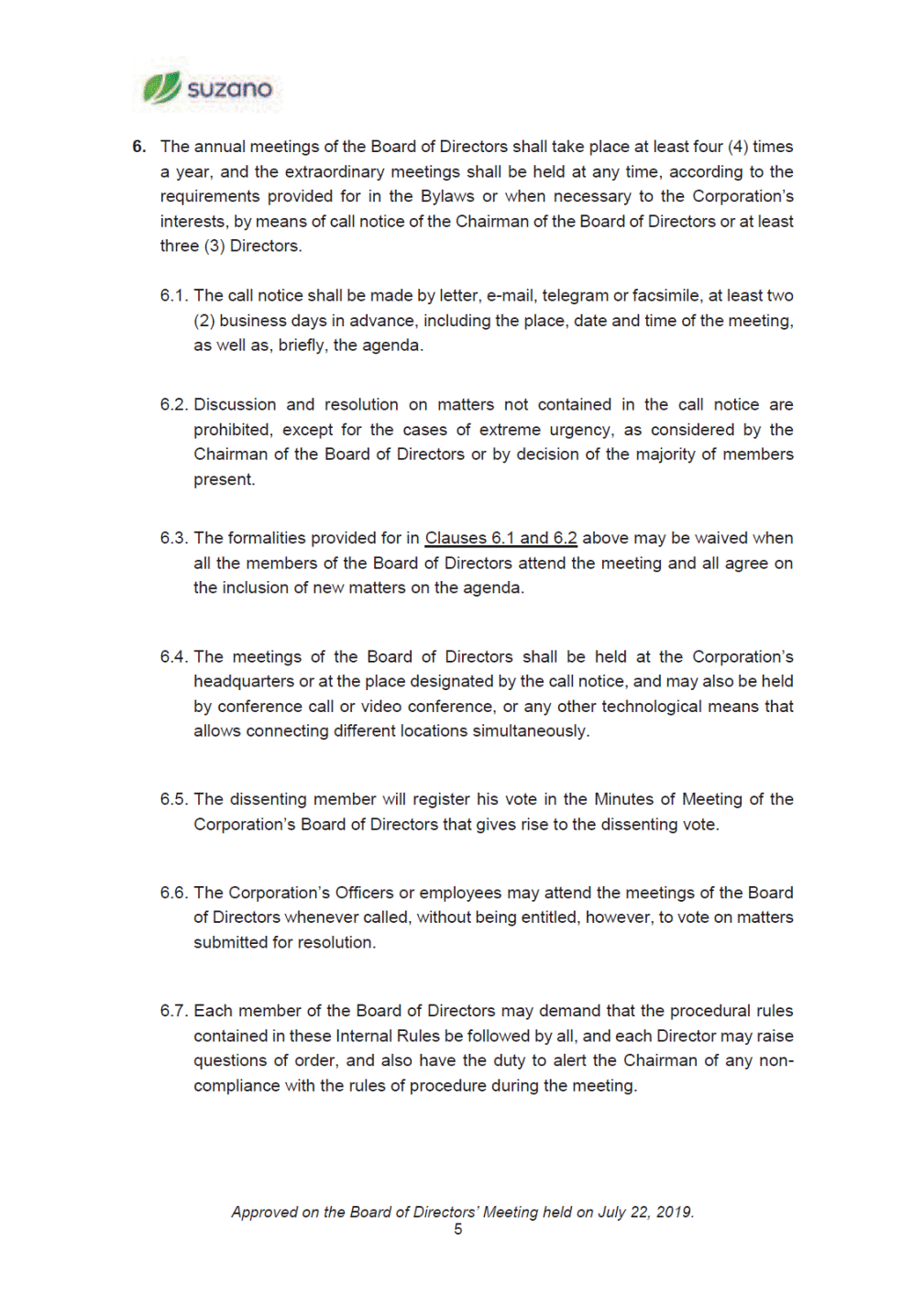
7. Any meeting of the Board of Directors may be confidential, in whole or in part, if, at the discretion of the Chairman, there is a matter of such nature as it may advise, including as regards the disclosure of decisions taken. 8. All matters relating to commercial information not disclosed to the general public, industrial and forestry technology issues, commercial contract information, entered into under confidentiality or not, products, markets, and price information will be deemed confidential and strategic. 9. Any reports containing the information necessary for proper evaluation and resolution concerning the matters on the agenda of the meeting shall be made available to the Board, by its Chairman or Secretary, together with the call notice provided for in Clause 6.1 above. 9.1. The information contained in the reports will be strictly confidential, the exclusive property of the Corporation, and will be destined to the members of its Board of Directors, in order to allow them to make a decision about the subject to which they refer, and therefore cannot be disclosed to third parties or used for any other purpose. SECTION III DUTIES OF THE BOARD OF DIRECTORS 10. In addition to the duties provided for in Law No. 6,404/76, in other regulations applicable to the Corporation, the Corporation’s Bylaws and Authority Policy of the Corporation, the Board of Directors is in charge of: (i) establishing the general business guideline of the Corporation, defining its mission, objectives and guidelines, as well as approving the strategic plan, the respective multiannual plans and annual expenditure and investment programs; approving financial and risk management policies; updating and approving the Corporation’s code of conduct; approving the Internal Rules of the Board of Directors, as well as the committees that advise it; electing, removing at any time and replacing the members of the Statutory Executive Board of Officers, establishing their duties; supervising the management of the Statutory Executive Board of Officers and the Officers according to the criteria set forth in Chapter VII below; (ii) (iii) (iv) (v) (vi) Approved on the Board of Directors’ Meeting held on July 22, 2019. 6
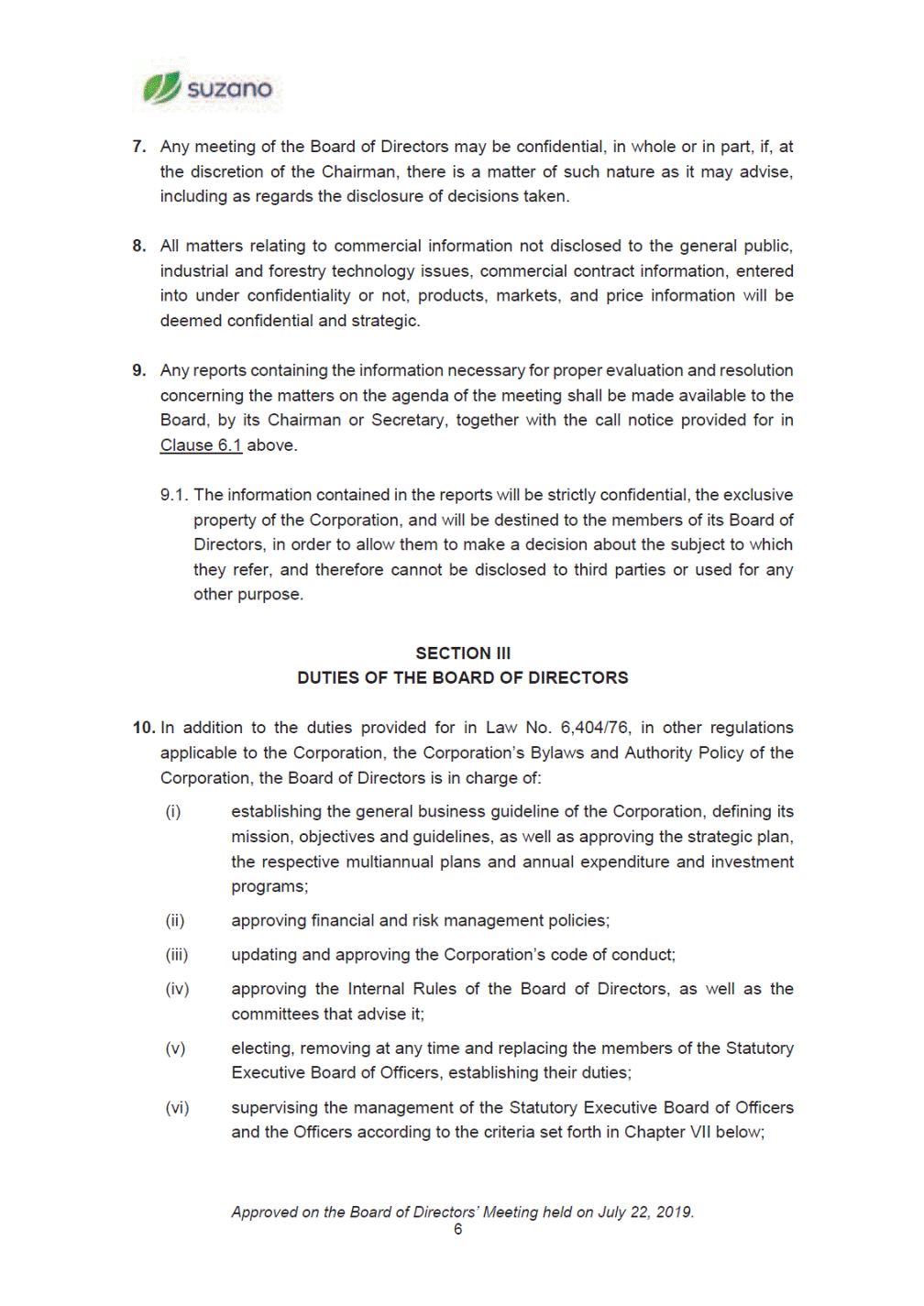
(vii) approving the criteria for the individual distribution of the compensation amount approved by the General Meeting, between its own members and those of the Statutory Executive Board of Officers, as recommended by the Compensation Committee; calling the General Meetings in the cases provided for in law or when deemed convenient; approving the payment or credit of interest on equity to stockholders; approving the expansion plans; resolving on the issuance of unsecured simple debentures, not convertible into stocks; resolving on the issuance of stocks or subscription warrants until the authorized capital limit; fixing the issue price of the stocks in capital increases by public or private subscription, also establishing the other conditions to which the issue is subject; submitting to the General Meeting a proposal for a stock option plan to the Corporation’s managers or employees; authorizing (a) the purchase of stocks issued by the Corporation for purposes of cancellation or holding in treasury and (b) the sale of stocks held in treasury; authorizing the sale or encumbrance of the Corporation’s real estate, the amount of which exceeds the limit established in the Authority Policy approved by the Board of Directors, except for the cases of exchanges and donations, which must be approved by the Board of Directors regardless of the amount; authorizing the execution of any legal transactions between the Corporation and its subsidiaries, on the one hand, and any related parties, on the other hand, whose individual amounts per transaction exceed the limit established in the Authority Policy approved by the Board of Directors; in this case, it may be resolved on the creation of an ad hoc advisory committee for the specific purpose of analyzing the related party transaction, to be formed by members of the Board of Directors who have no interests conflicting with the respective transaction; if the Board resolves on the creation of said committee, it shall be responsible for defining its operation, duration and structure; authorizing the execution of any legal transactions that oblige the Corporation, or relieve third parties from liability to it, whose individual amounts per transaction exceed the limit established in the Authority Policy (viii) (ix) (x) (xi) (xii) (xiii) (xiv) (xv) (xvi) (xvii) (xviii) Approved on the Board of Directors’ Meeting held on July 22, 2019. 7
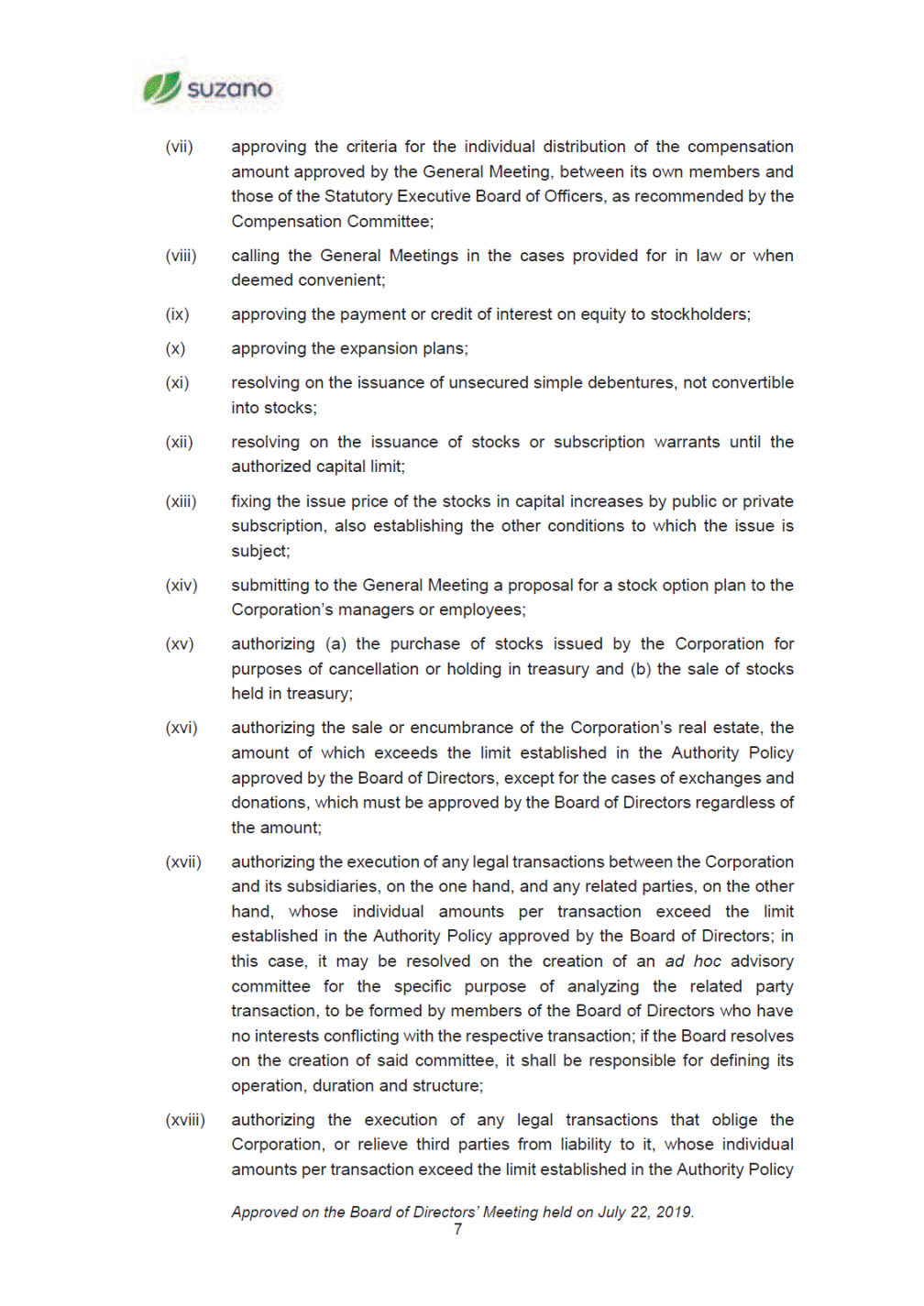
approved by the Board of Directors under the provisions of item (xvii) of this clause, except for Pulp Sales Agreements, which are not subject to approval by the Board of Directors; authorizing the provision of guarantees in favor of third parties, whose individual amounts per operation exceed the limit established in the Authority Policy approved by the Board of Directors, except for those provided in favor of companies or entities controlled by the Corporation, alone or jointly, and guarantees of any nature offered in lawsuits to which the Corporation or its subsidiaries are parties, which will not be subject to authorization by the Board of Directors; authorizing the execution of financial transactions by the Corporation, whose individual amounts per operation exceed the limit established in the Authority Policy approved by the Board of Directors; approving transactions for the purchase, assignment, transfer, disposal or encumbrance, by any means or form, of equity interest, whose amounts exceed the limit established in the Authority Policy approved by the Board of Directors; resolving on the issuance of promissory notes (commercial papers) for public placement in Brazil, providing for: (a) the amount of the issue and its division into series; (b) quantity and nominal value; (c) remuneration conditions and inflation adjustment; (d) maturity of securities; (e) guarantees; (f) statement to prove compliance with legal limits; (g) place of payment; (h) contracting of services related to the issue; approving the creation of Committees, as well as the respective regulations which will contain, in addition to other matters of interest to the Corporation, the specific rules regarding the work, duties, remuneration and procedures in order to comply with good Corporate Governance practices; defining the list of three possible institutions or companies specialized in economic valuation of companies, for the preparation of appraisal report for the purposes of public offerings provided for in Sections VIII and IX of the Corporation’s Bylaws; expressing its favorable or contrary opinion regarding any public offering for the purchase of stocks issued by the Corporation, by means of a reasoned prior opinion, disclosed within fifteen (15) days of the publication of announcement of the public offering, which shall address, as a minimum (a) the convenience and timeliness of the public offering for the purchase of stocks regarding the interest of the stockholders as a whole and in relation to the liquidity of their securities; (b) the repercussions of the public offering for the purchase of stocks on the Corporation’s interests; (c) the (xix) (xx) (xxi) (xxii) (xxiii) (xxiv) (xxv) Approved on the Board of Directors’ Meeting held on July 22, 2019. 8

strategic plans disclosed by the offeror in relation to the Corporation; (d) such other points as the Board of Directors deems relevant, as well as the information required by the applicable rules established by CVM; defining the list of three possible companies specialized in economic valuation of companies to prepare the appraisal report of the Corporation’s stocks, in the case of an initial public offering (IPO) for cancellation of registration as a publicly-held corporation or for delisting from B3’s New Market listing segment; appointing, from among the Officers, the one who will accumulate the functions of Investor Relations Officer, being responsible for providing the necessary information to investors, Stock Exchanges and the CVM; authorizing the distribution of interim dividends, in advance of the annual dividend; (xxvi) (xxvii) (xxviii) (xxix) choosing and removing independent auditors, based on the recommendation of the Statutory Audit Committee; preparing and submitting to the Annual General Meeting the annual report of the Corporation’s business activities, providing it with the financial statements legally required for each fiscal year. (xxx) SECTION IV ADVISORY COMMITTEES 11. As permitted by Article 15 of the Corporation’s Bylaws, the Board of Directors may, when deems necessary, create committees (“Committees” or “Committee”), which will operate in part or full time, with specific advisory and guidance duties in relation to the matters for which they have been created, in compliance with the provisions of the respective Internal Rules, the Board of Directors’ Internal Rules, when applicable, and the Corporation’s Bylaws. SECTION V DUTIES OF THE BOARD OF DIRECTORS’ CHAIRMAN 12. The Board of Directors’ Chairman has the following duties: (i) (ii) to ensure the effectiveness and good performance of the body; to ensure the effectiveness of the monitoring and evaluation system by the Board, the Corporation, the Board of Directors’ and the Statutory Executive Board of Officers’ members, individually, as well as their respective bodies; to make the Board’s activities compatible with the interests of the Corporation, its stockholders and other interested parties; (iii) Approved on the Board of Directors’ Meeting held on July 22, 2019. 9
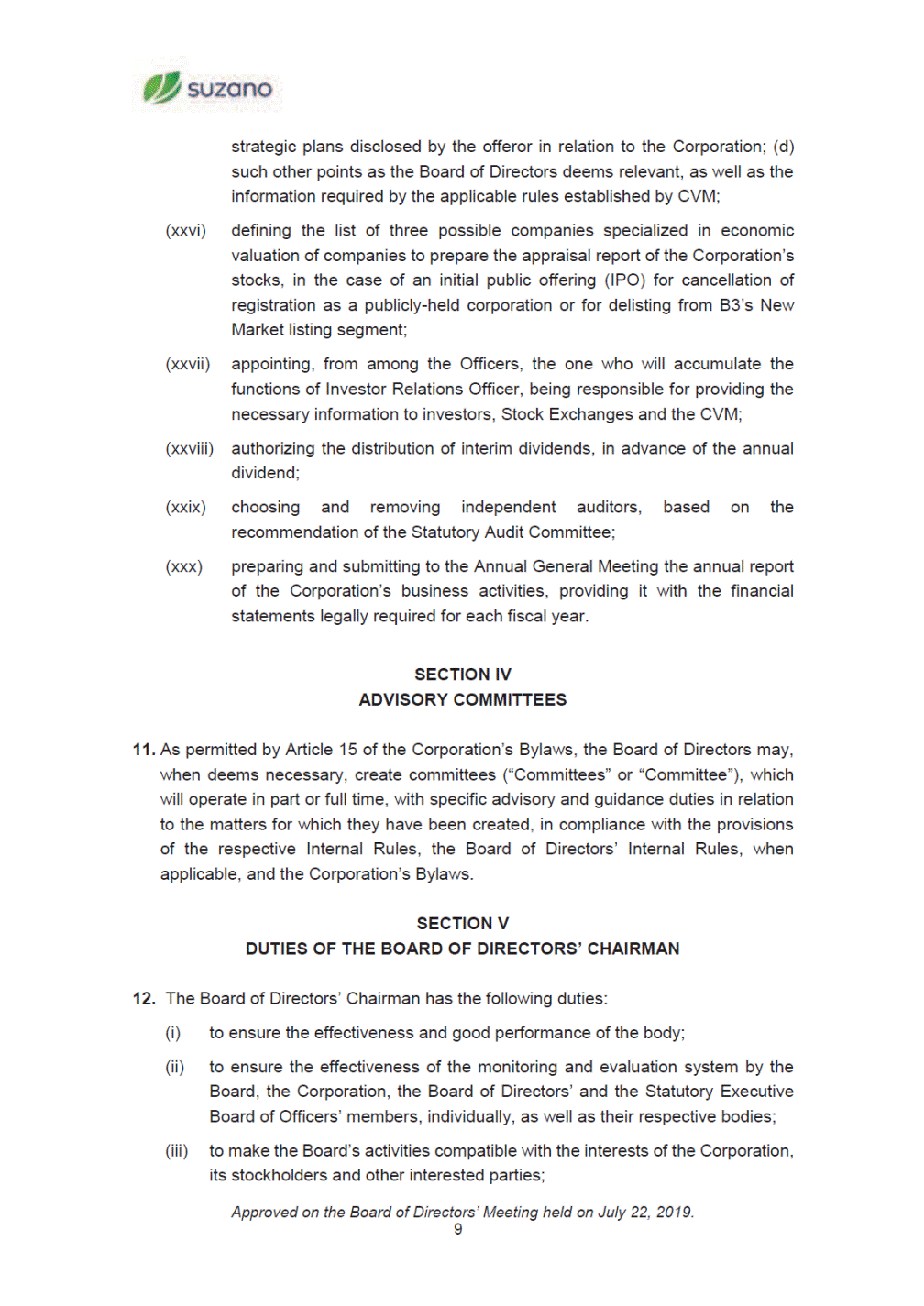
(iv) to organize and coordinate, with the collaboration of the Secretary of the Board, the agenda of the meetings, after consultation with the other Directors and, as the case may be, the Chief Executive Officer; to coordinate the activities of the other Directors; to ensure that the Directors receive, together with the calling agenda, complete and timely information on the items on the meeting agenda, at least two (2) business days prior to the scheduled date of each meeting; to propose to the Board the annual calendar of Board events; to organize, upon the election of a new Board member, an integration program that will enable him/her to be in touch with activities and to obtain information about the organization; In conducting the meetings, the Chairman shall: (v) (vi) (vii) (viii) (ix) (a) (b) (c) preside the board of directors and appoint the secretary; declare the meeting constituted and determine its beginning; inform the other Directors about the confidentiality and strategic nature of matters included on the agenda of the meeting, in which case there will be prior resolution of the Directors regarding the relevance of the discussion on such issue; if the majority of the Directors deems it relevant to the discussion of the confidential and strategic matters referred to in the previous item, keep such matter on the agenda; submit to the Statutory Executive Board of Officers requests for information requested by the Board of Directors, by majority resolution; call the meeting to order; call the Directors to comment on the topics discussed; control the extent and relevance of Directors’ interventions; organize the voting; and declare the results. (d) (e) (f) (g) (h) (i) (j) SECTION VI DUTIES OF THE BOARD OF DIRECTORS’ SECRETARY 13. The Board may appoint a Corporation’s officer or employee to act as Secretary, with corporate functions, with the following main duties: Approved on the Board of Directors’ Meeting held on July 22, 2019. 10
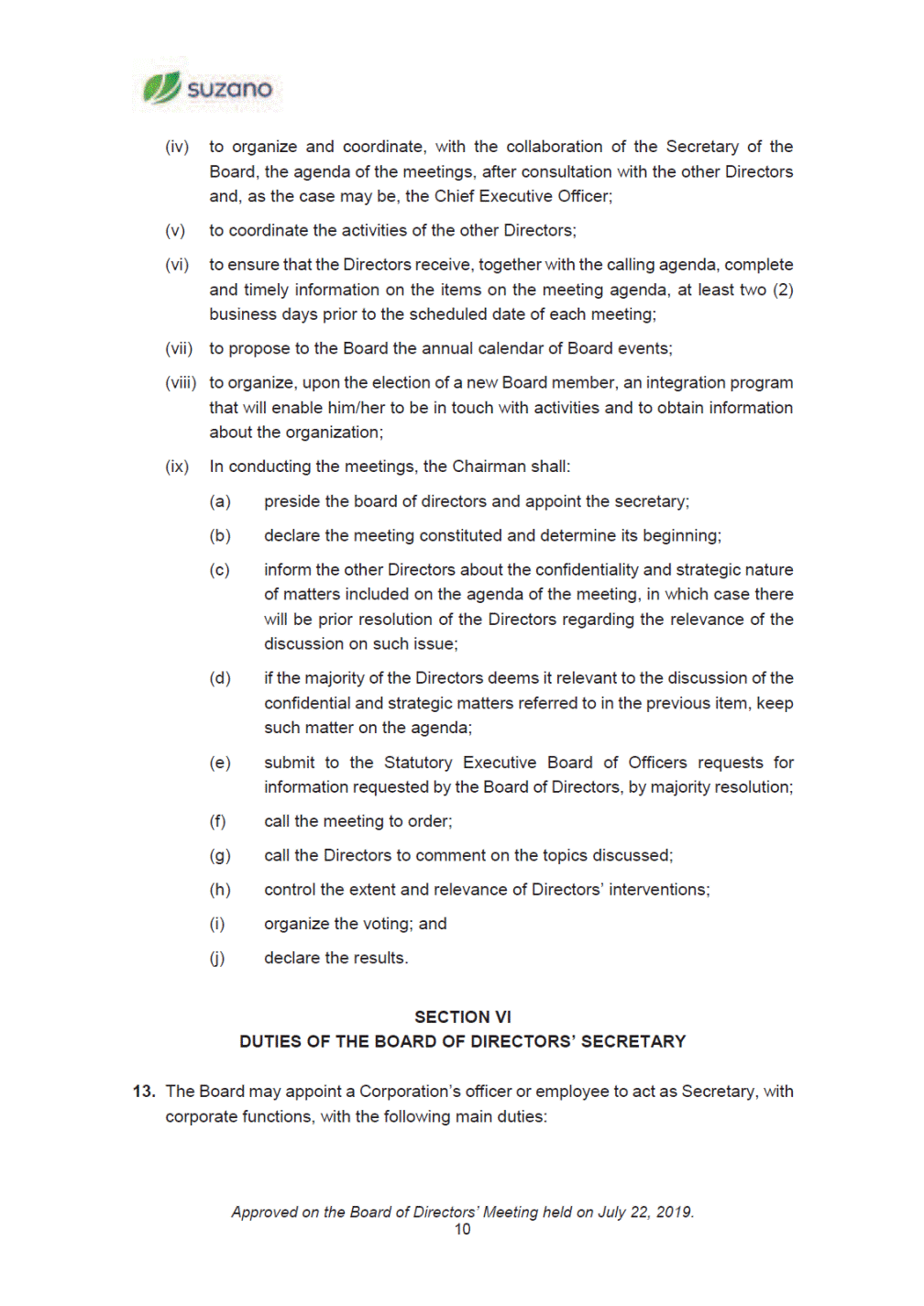
(i) to organize the agenda of the matters to be discussed, based on requests from Directors and consultation with the Chief Executive Officer, and submit it to the Board of Directors’ Chairman for further validation and disclosure; to act as secretary to the Board meetings and assist the Chairman in the organization of the meetings, including the convening of the Directors and the disclosure of the agenda; to prepare the minutes of the Board meetings and monitor the collection of signatures of the Directors; and to be responsible for the custody of the corporate seal and mechanical seals, if any. (ii) (iii) (iv) SECTION VII INSPECTION OF OFFICERS’ MANAGEMENT 14. As provided for in law and the Corporation’s Bylaws, the Board of Directors shall inspect the management of the Executive Officers, and may examine the Corporation’s books and records, as well as request information on the agreements entered into or to be entered into, among others. 15. The inspection power shall be exercised jointly and all requests for information, including, but not limited to, requests for documents, books, records, presentations by the Corporation's Officers or employees, or requests for information and/or clarifications addressed to the Corporation’s independent auditors shall be sent through the Chairman. SECTION VIII DIRECTORS’ DUTIES 16. The Directors shall ensure the best governance practices of the Corporation and ensure that sufficient time is available to analyze the matters on the agenda and attend the Board of Directors’ meetings previously prepared, by examining the documents available and participating actively and diligently of them. If unable to attend, the Board’s Chairman shall be informed and a substitute shall be called. 17. The Directors are recommended to participate in not more than four (4) boards of directors of relevant publicly-held corporations. 17.1. For the purposes of the Clause 17, the exercise of the position of member of the board of directors in philanthropic entities, clubs or associations, which shall, in Approved on the Board of Directors’ Meeting held on July 22, 2019. 11

any event, be included in the Director's registration information shall not be considered. 18. The Director shall perform the duties assigned by law and the Bylaws to achieve the purposes and interests of the Corporation, in compliance with these Internal Rules, always acting independently of the stockholder or stockholder group that has elected him to office. Once elected, the Director shall act solely to achieve the Corporation's purposes and interests and satisfy the requirements of the public good and the social purpose of the corporation. 19. In performing their functions, the Directors shall employ the care and diligence usually employed in the management of their own business. 20. The Directors shall not intervene in any transaction of the Corporation in which they have an interest conflicting with the Corporation’s interest, as well as in any resolution taken by other managers in this regard, in compliance with the provisions of Clause 23 below. The Director shall declare himself in a Conflict of Interest when he considers that any decision of the Board on a matter to be voted may result in his own or third party benefit, with or without prejudice to the Corporation. 21. The Director who considers himself in a Conflict of Interest with the Corporation shall declare himself prevented at the Board meeting or notify the Board’s Chairman of his prevention and cause the nature and extent of his interest to be shown in the minutes of the Board’s meeting. 22. The Director in a Conflict of Interest, after declaring himself prevented, may not participate in the discussion, nor vote on the matter in which he has a Conflict of Interest, and shall leave the meeting when the Board discusses such matter. 23. Notwithstanding the provisions set forth in articles 117, paragraph 1, f) and 156, paragraph 1 of Law 6,404/76, for engaging service providers or product suppliers, when there is a possibility of participation of a controlling stockholders or related persons or also related to the Corporation’s managers, the engagement shall be based on a bid to be approved by the Board of Directors. 23.1. In cases where the Board has to make decisions within a short time and where one of the controlling stockholders or related persons have filed the best bid, the Board of Directors shall be called upon by the Statutory Executive Board of Officers to ratify consultations to be made by fax or email. Approved on the Board of Directors’ Meeting held on July 22, 2019. 12
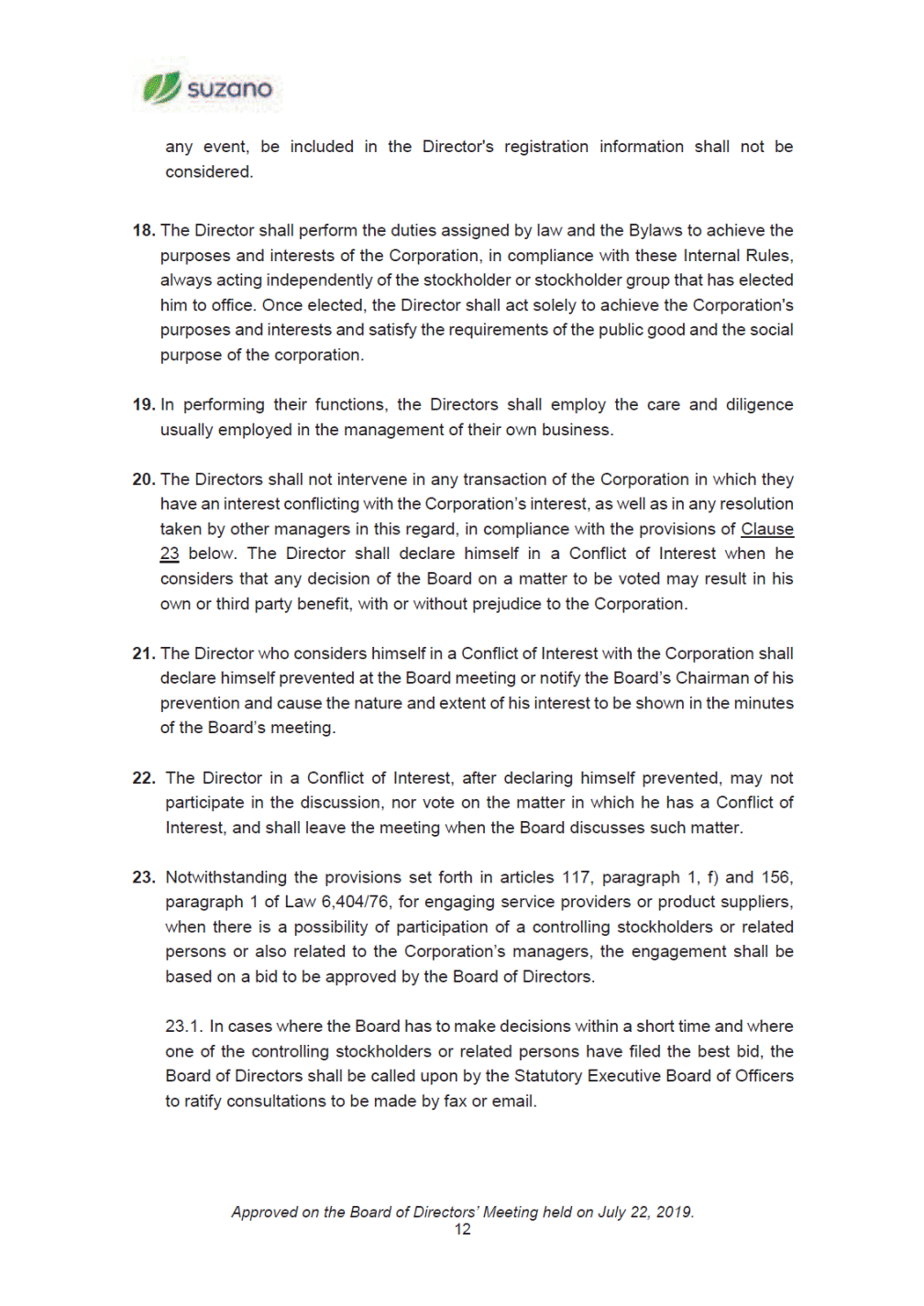
23.2. For each engagement intended by the Corporation, in the event referred to in Clause 24.1 above, the Statutory Executive Board of Officers shall be in charge of providing the Board of Directors with the elements and supports necessary for the decision-making and of preparing the reports and opinions with recommendations to be submitted to the Board of Directors during the various stages of the procedure. 23.3. In order to ensure the necessary support to the Board’s members, the Board may have the advice of professionals engaged by the Corporation upon approval of the Board of Directors, comprising at least one expert in the subject matter of retaining, in addition to other advice modalities that may be deemed necessary. 23.4. In addition to such technical support, the Board may have legal support for the analysis of contracts and legal documents, especially those to be submitted for final approval by the Board of Directors. 23.5. In case of participation of controlling stockholders and/or related persons in the bidding process, the stockholder representative who, as a result of this situation, has a conflict of interest with the Corporation shall be totally foreign to the process and information raised by the Board and shall not participate in any meeting on such retaining. 24. Information sent to the Board of Directors by the Corporation or by third parties relating to the matter in which a Director declares himself in a Conflict of Interest shall not be sent to such Director, and access to such information shall not be given to him by the other Directors. 25. Notwithstanding the notice set forth in Clause 22, whenever the Chairman identifies a situation that may be deemed as a Conflict of Interest of a certain Director with respect to any matter to be resolved by the Board, the Chairman shall notify such Director, within the respective period of time, so that such Director expresses its views in this regard according to the provisions of Clauses 22 and 25. 26. Pursuant to Law No. 6,404/76, the Directors have a duty of loyalty to the Corporation and may not disclose to third parties information about its business, and shall maintain in confidentiality any relevant, privileged or strategic information of the Corporation obtained in reason of their position, as well as shall ensure that third parties do not have access to it, and they are prohibited from using the information to obtain any kind of advantage for their own benefit or for the benefit of others. 26.1. For the purposes of the introductory section of this clause: Approved on the Board of Directors’ Meeting held on July 22, 2019. 13
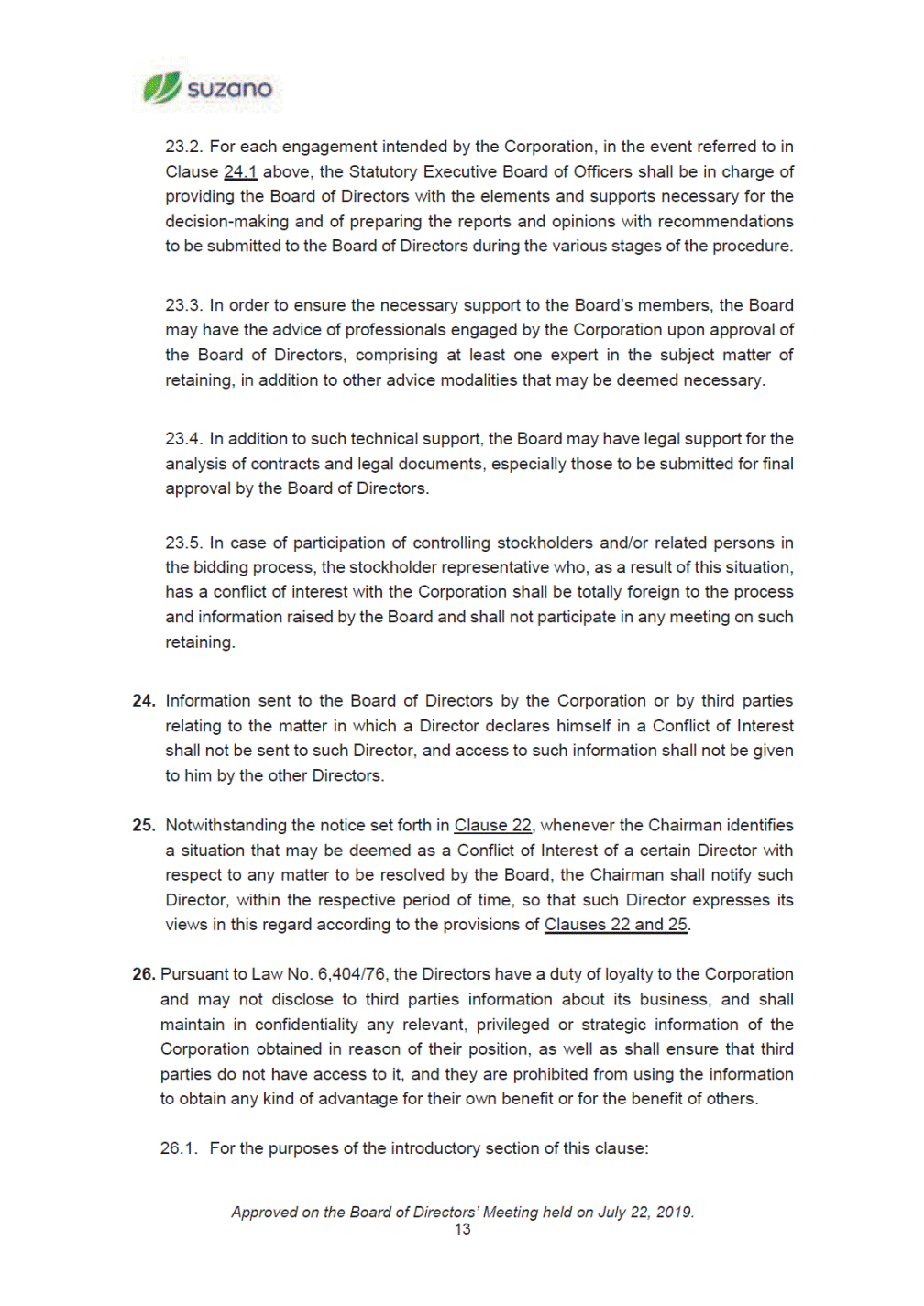
(i) “privileged” means any information provided to a particular person or group prior to its public disclosure; “relevant” means any resolution of the General Meeting or the Corporation’s management bodies or any other act or fact that has occurred in its business that may have a significant influence on (a) the price of its issued securities; or (b) investors’ decision to trade in those securities; or (c) investors’ determination to exercise any rights inherent in the condition of holder of securities issued by the Corporation; “strategic” means any information that may provide the Corporation with a competitive gain or advantage over its competitors and which, due to its importance, should be kept in confidentiality. (ii) (iii) 27. Whenever requested by Chairman of the Board of Directors, the Directors shall return any documents obtained as members of the Board of Directors, and they may not retain any copy, registration or annotation. 28. It is forbidden for the Directors to take advantage for their own benefit or for the benefit of others, or allow any third party(s) to take advantage of opportunities known to them by virtue of their position as officer of the Corporation, even when the Corporation has no interest or cannot take advantage of it, including, without limitation, acquiring or disposing of assets or rights; contact customers or suppliers of the Corporation; take advantage of any business that has been offered to the Corporation or which the Corporation has evaluated; engage services, acquire assets or explore activities for which he has been able to evaluate as a Director. 29. The Director who, after being elected, engages into a business that directly competes with the Corporation’s business, or holds a position in a company that is a direct competitor of the Corporation shall inform the Board of Directors’ Chairman and the Corporation (through its Chief Executive Officer) and shall make his/her term of office available to the Board of Directors, being prevented from attending any meetings of that board or from performing any acts as Director until is resolved by the Corporation’s General Meeting, pursuant to article 147, paragraph 3, of Law no. 6,404/76. 30. The Director shall keep the Corporation and the other Directors informed of the quantity of stocks, subscription warrants, stock options and debentures convertible into stocks issued by the Corporation. SECTION IX TRANSITORY AND FINAL PROVISIONS Approved on the Board of Directors’ Meeting held on July 22, 2019. 14
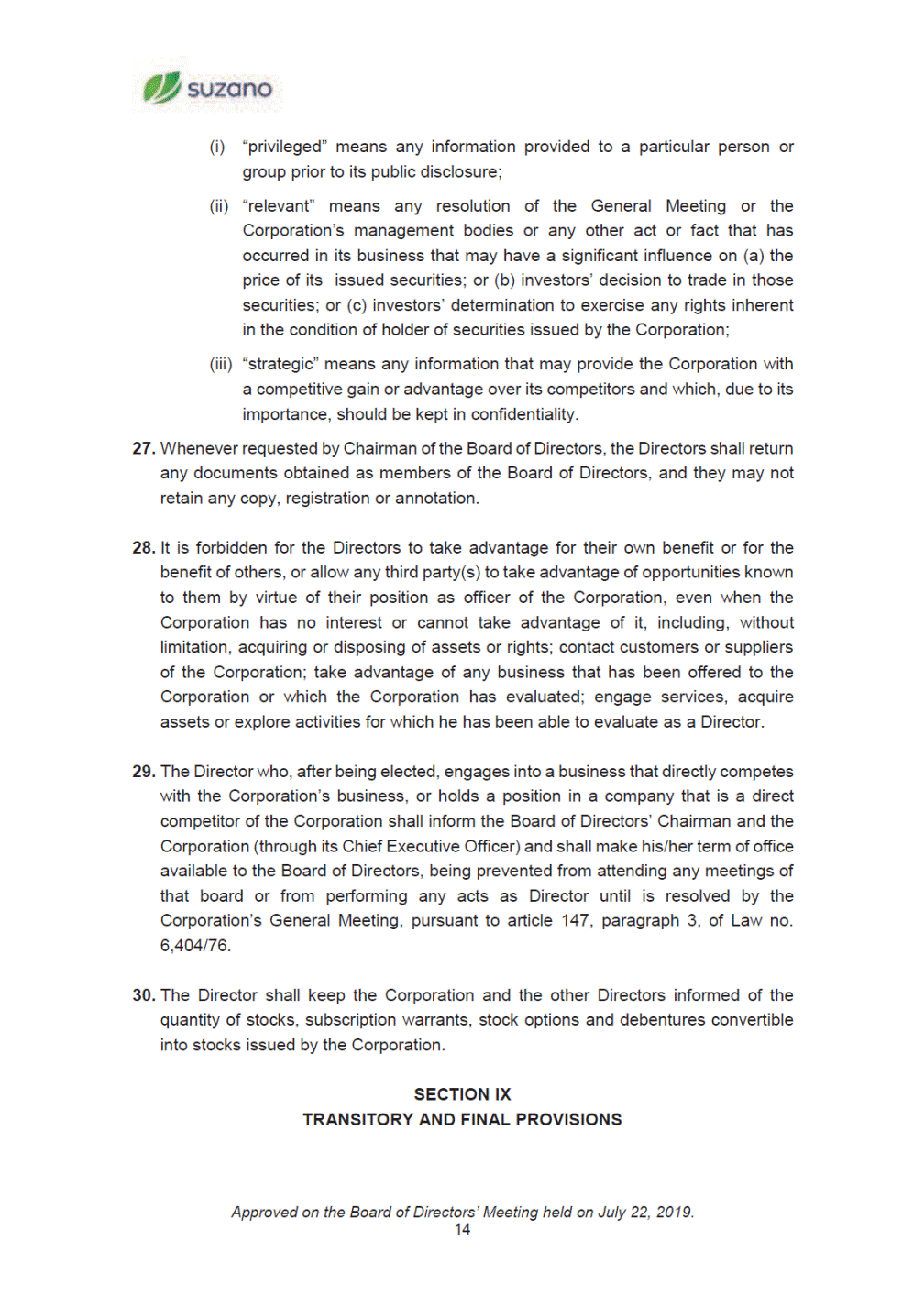
31. These Internal Rules shall become effective as of the date of their approval by the Board of Directors, and any rules and procedures to the contrary are revoked herein. 32. Once these Internal Rules have been approved, they shall be immediately followed by the Corporation, its Officers and Directors, as well as by the advisory committees’ members, the Secretary, and these Internal Rules may only be amended by the favorable vote by majority of the Board’s members. São Paulo, SP, July 22, 2019. DAVID FEFFER Chairman of the Board of Directors Approved on the Board of Directors’ Meeting held on July 22, 2019. 15

SUZANO S.A. INTERNAL RULES OF THE STATUTORY AUDIT COMMITTEE SECTION I STATUTORY AUDIT COMMITTEE 1. The Statutory Audit Committee (the “Committee” or “SAC”) is an advisory and instruction body established by the Board of Directors (“Board”), as provided for in Article 25 of the Suzano S.A.’s Bylaws (“Suzano” or “Company”). 2. The resolutions of the Committee shall be taken by the majority of its members attending the meetings, reporting to the Board of Directors any dissenting vote, and the Committee Coordinator shall have the casting vote in case of tied votes. As an advisory body to the Suzano’s Board, the Committee’s resolutions are deemed as recommendations to such body. The Committee’s recommendations, when applicable, must be commented by the Company's legal department. 3. The purpose of the Committee is to provide technical advice to the Board of Directors for the faithful performance of its activities, subject to the limitations imposed by Law No. 6,404/76, the Brazilian Securities Commission (“CVM”), the Bylaws, by these Rules and the rules issued by the regulatory agencies of the securities market and stock exchanges in which the Company's securities are listed. 4. The Committee reports exclusively to the Board of Directors through its Coordinator, having no relation or connection of any kind with other bodies of the Company. 5. Except for the duties set forth in these Rules, the Committee’s activities will be restricted to the operations of the Company and its subsidiaries, not extending to the other companies of the Suzano Group. SECTION II STRUCTURE AND OPERATION OF THE CAE Approved at Meeting of the Board of Directors held on July 22, 2019. 1
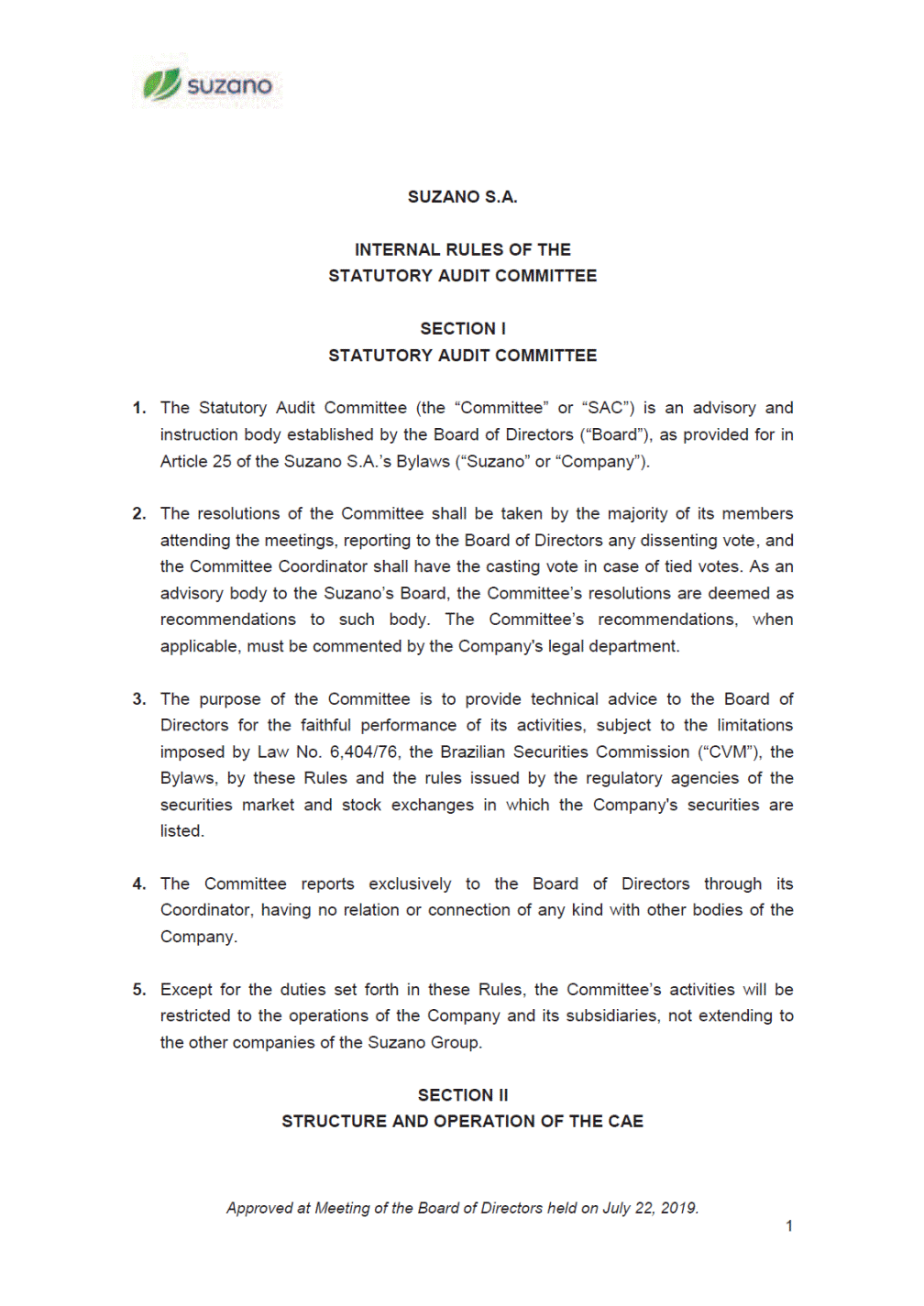
6. The SAC shall operate on a permanent basis, report to the Board and shall be composed of at least three (3) and at most five (5) members, elected by the Company’s Board, and: (i) at least one of the members of the SAC shall also be an independent member of the Board; (ii) at least one of the members of the SAC shall have a proven financial literacy, as established in these Rules and in the applicable law (especially in Section 10A of the “Securities Exchange Act of 1934” and its rules) and the rules issued by the regulatory agencies of the securities market and stock exchanges in which the Company’s securities are listed; (iii) all members shall meet the requirements set forth in Article 147 of Law No. 6,404/76. 6.1. In order to comply with the independence requirement, the member of the SAC (i) may not be, or have been, for the past five (5) years, (a) officer or employee of the Company or its controlling companies, subsidiaries, affiliates or companies under common control, whether directly or indirectly, or (b) technical manager of the team involved in the audit of the institution; (ii) may not be a spouse, relative in a straight line or collateral line, to the third degree, and by affinity, to the second degree, of the persons referred to in item (i) of this item; (iii) may not be a controlling shareholder, direct or indirectly; and (iv) his voting right at the meetings of the Board must not be bound by a shareholders agreement that deals with matters related to the Company. 6.1.1. Notwithstanding the provisions of this Clause 6, no person holding a direct or indirect interest superior than ten percent (10%) of the Company’s voting capital stock or of any of its subsidiaries may be elected as a member of the SAC. 6.2. In its composition, the SAC will have at least one financial expert with recognized experience in matters of corporate accounting. Financial expert (“Financial Expert”) means a member of the SAE who, through academic training or proven professional experience in the areas of accounting, independent audit or financial administration, cumulatively has: (i) knowledge of accounting principles generally accepted in Brazil and in the United States of America applicable to the Company, and the financial statements; (ii) ability to apply such principles in relation to the main accounting estimates and reserves; (iii) experience in preparing, auditing, analyzing or evaluating financial statements of similar scope and complexity to Suzano; (iv) educational background compatible with the corporate accounting knowledge Approved at Meeting of the Board of Directors held on July 22, 2019. 2
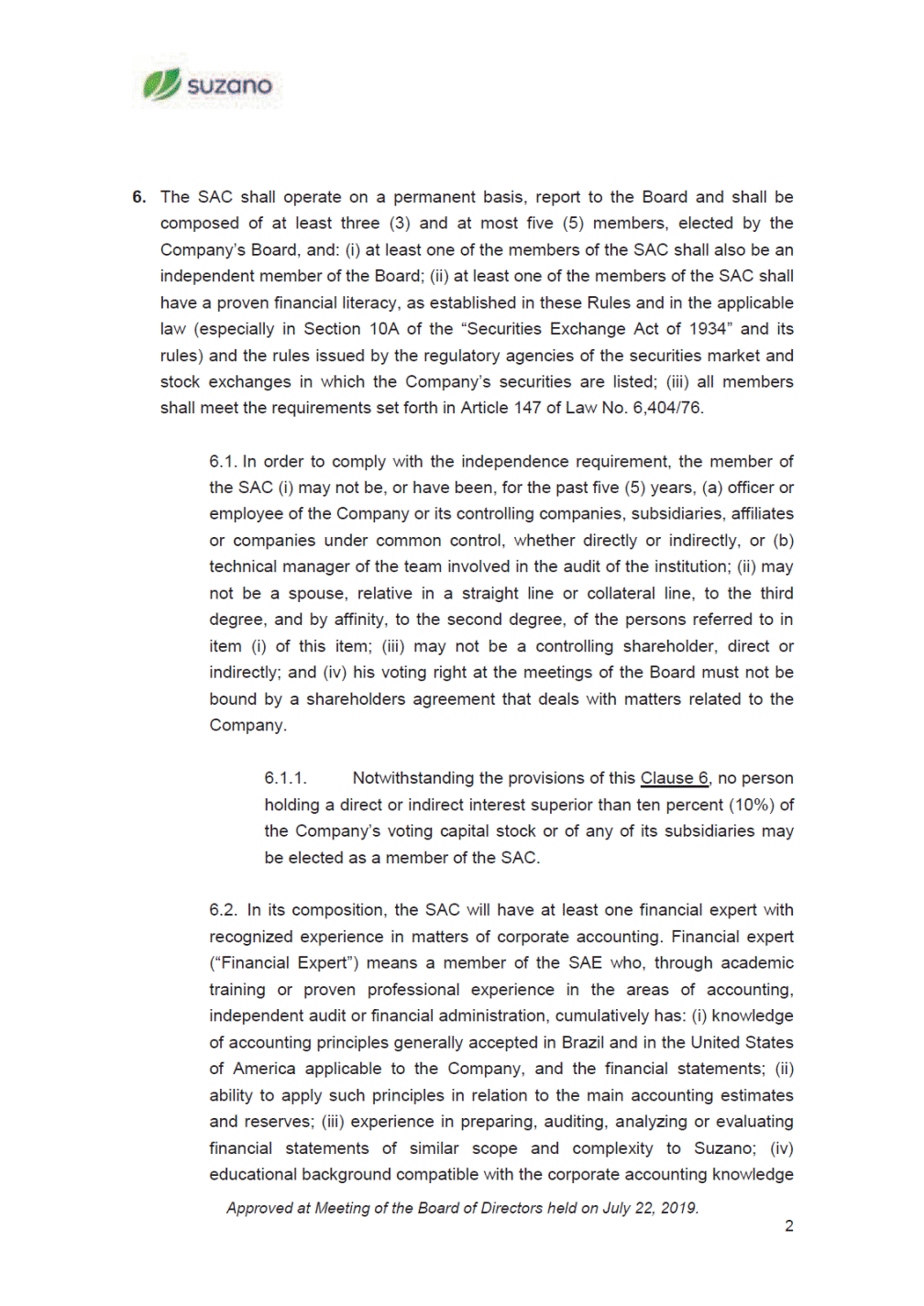
required for the Committee’s activities; (v) knowledge of internal controls and corporate accounting procedures; (vi) mastery of rules and procedures related to internal controls used in the preparation of financial statements; (vii) knowledge of the duties and operation of the SAC, especially in relation to the determined by the “US Securities & Exchange Commission”; (viii) knowledge of financial statements and international accounting standards (IFRS); (ix) ability to assess how the “US Generally Accepted Accounting Principles (GAAP)” eventually applies to estimates, recognition of income and expenses and creation of reserves, (x) experience in preparing, auditing or evaluating financial statements, or experience in the active supervision of professionals who are performed these tasks, (xi) knowledge of the Internal Controls Over Financial Reporting (ICOFR); and (xii) knowledge of the functions of the audit committee. 6.2.1. In addition to the provisions of Clauses 6.1 and 6.1.1 above, in order to fulfill the independence requirement, the Committee’s financial expert member: (i) may not, directly or indirectly, control the Company or any of its subsidiaries; (ii) may not have received from the Company, nor his spouse, relatives in a straight line or collateral line and by affinity of first degree, as well as persons who live with the financial expert may have received more than USD120,000.00 ( One Hundred and Twenty Thousand U.S. dollar) for a full period of twelve (12) months in the last three (3) years, in direct financial compensation, but not related to payments received as a member of the Board, committees and pensions or other services previously provided; (iii) his spouse, relatives in a straight line or collateral line and by affinity of first degree, as well as persons who live with the financial expert may not be, or have been, in the last three (3) years directors of any Company in which any of the current Directors acted as members of the compensation committee; and Approved at Meeting of the Board of Directors held on July 22, 2019. 3

(iv) is currently employed, or any of his relatives in a straight line or collateral line and by affinity of first degree, spouse, as well as persons who live with the financial expert are currently officers of a company that has made or received payments from the Company related to goods or services in an amount that, in any of the past three (3) years, exceeds One Million U.S. dollar (USD 1,000,000.00) or two percent (2%) of the gross revenue of the company in question. 6.2.2. The meeting of the requirements set forth in Clauses 6.2 and 6.2.1 above shall be evidenced by documentation maintained at the Company’s headquarters, available to the CVM, the Securities & Exchange Commission of the United States of America (“SEC”) and any other regulatory agencies for a period of five (5) years from the last day of the SAC member’s term of office. 6.3. The SAC shall nominate, from among its members, a Coordinator who shall perform the duties established in these Rules, the applicable legislation and others that may be determined by the SAC. 6.3.1. The SAC shall nominate a Secretary, who will not be a member and will not have the right to vote. 6.4. The term of office of the Committee’s members shall be two (2) years, and the members may be re-elected for the same period coinciding with the beginning and ending of the terms of office of the members of Company’s Board of Directors. The Committee’s members will be limited to a maximum term of office of ten (10) years. 6.4.1. By having held a term of office for any period, the Committee’s members may only rejoin such body after at least three (3) years from the end of their term of office. 6.5. The Committee’s members are prohibited from receiving, directly or indirectly, any compensation from the Company or its subsidiaries, affiliates and related parties, as a result of any service agreement, product supply agreement or transactions of any other nature, except for (i) the compensation earned for exercising the position of member of the Board of Approved at Meeting of the Board of Directors held on July 22, 2019. 4
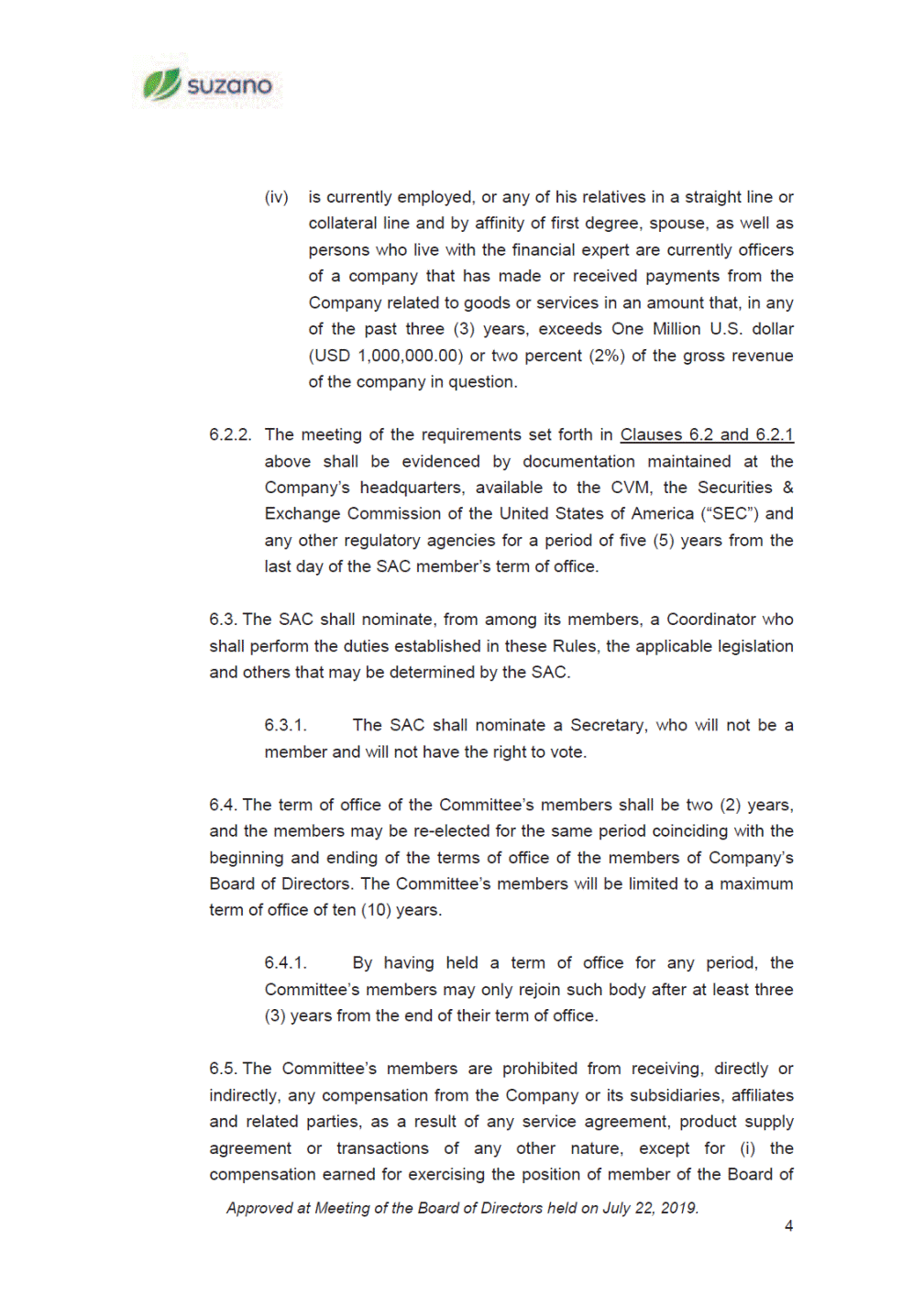
Directors, the Audit Board, if constituted, or the Company’s SAC, in the amount fixed by the Company’s Board of Directors; and (ii) fixed amounts arising from retirement plans for services rendered to the Company, provided that they are not linked to the continuity of services rendered. 6.5.1. The Board shall define the remuneration of SAC’s members, as well as the budget intended to cover the expenses of its operation. 6.6. The replacement of a SAC’s member must be notified to the CVM, the SEC and the stock exchanges in which the Company’s securities are listed within ten (10) days of its occurrence. 7. The Coordinator will be responsible for supervising and for the administrative organization of the SAC’s activities. The Coordinator, with the assistance of the Secretary, will be in charge of preparing, organizing, elaborating and distributing the agendas, minutes of meetings and information necessary for the discussion of matters on the agenda. The Coordinator will also be responsible for forwarding the SAC’s recommendations to the Board’s Chairman. 7.1. The Committee’s Coordinator, accompanied by other Committee’s members when necessary or appropriate, shall (i) meet together with the Board at least on a quarterly basis; and (ii) attend the Company’s Annual General Meeting. 7.2. Also, the Coordinator is in charge of: (i) establishing the agendas of discussions, organizing meetings and ensuring that the agenda is met; (ii) defining the discussions at meetings by being independent, critical, engaged and well informed; (iii) maintaining the group’s focus and engagement; (iv) making sure that the committee’s members have the necessary documentation for discussions; (v) making sure that the committee has the resources to act efficiently; Approved at Meeting of the Board of Directors held on July 22, 2019. 5
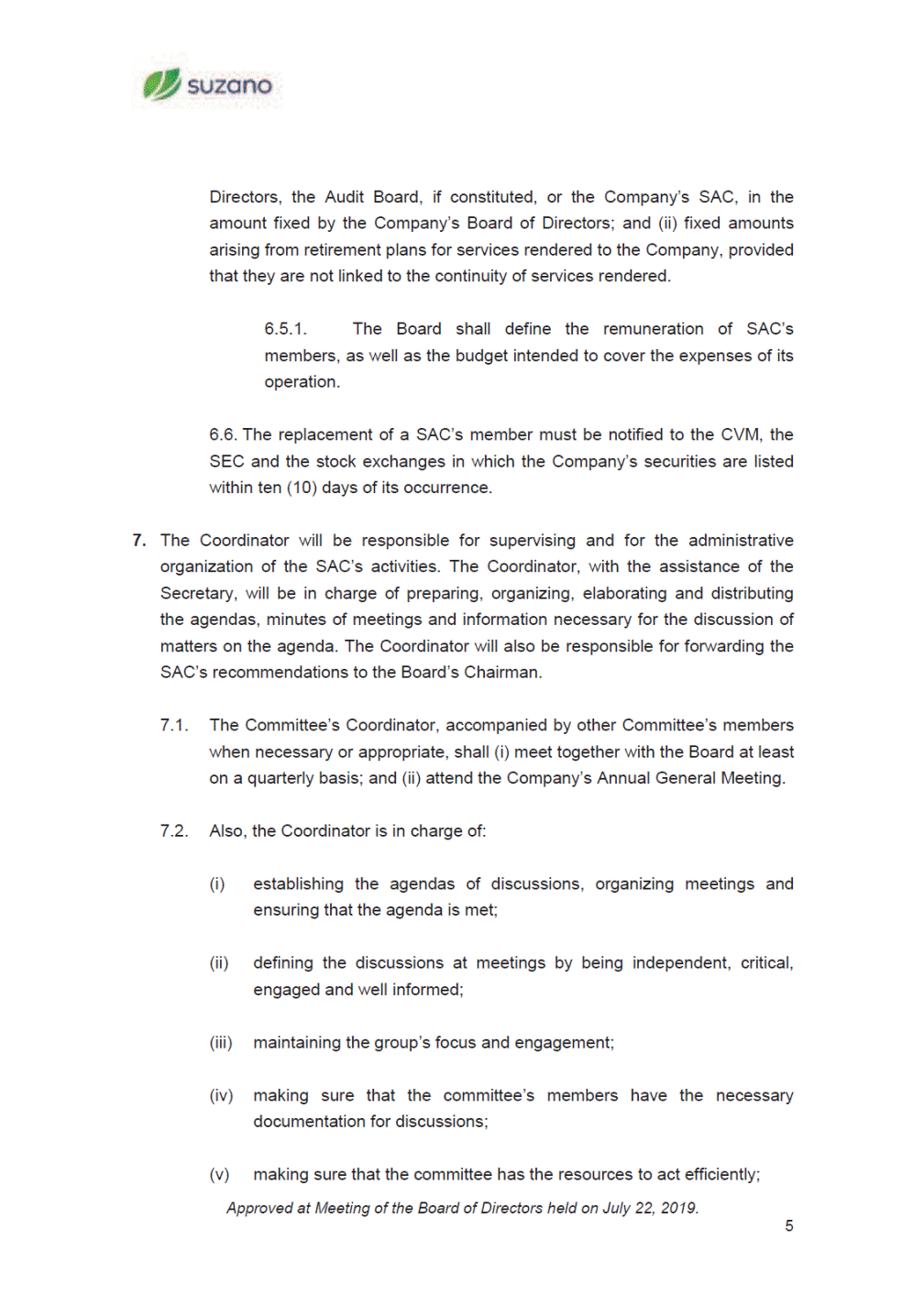
(vi)engaging deeply in discussions with management and internal and independent auditors; and (vii)leading the process of reviewing these internal rules of this Committee, which must be made from time to time, and promoting continuous improvement, using tools such as training and individual and group performance evaluations. 8. The Committee’s Secretary shall attend all meetings without, however, participating in the discussions or voting. 8.1. The Secretary is in charge of: (i) preparing annual calendar of activities of the SAC; (ii) monitoring the deadlines and the flow of information, ensuring the forwarding of the SAC’s requests in a timely manner; (iii) maintaining channels for permanent access to up-to-date information about the Company and the Statutory Executive Board of Officers’ decision-making process for the SAC’s members; (iv) preparing the support materials and agendas of the persons needed to discuss topics for resolutions that require greater understanding; (v) setting deadlines for the disclosure of information, according to the needs of the Directors, and enable interaction with officers for any clarifications that may be required; (vi) arranging for the SAC’s meetings, from the necessary infrastructure to the support material, ensuring that SAC’s members receive clear and sufficient information for their resolutions at least three (3) days prior to the scheduled date for each meeting; and (vii) documentingtheSAC’sresolutionsandrecommendationsand maintaining the SAC’s documents on file. Approved at Meeting of the Board of Directors held on July 22, 2019. 6

8.2. For the due performance of these tasks, the Committee’s Secretary will be supported by the Office of the Board of Directors. 9. Except for the event of a conflict of interest, as provided for in Clause 18 below, all information and documents will only be provided or made available to all Committee’s members, and any of its members may not have information not provided to the others. SECTION III DUTIES AND RESPONSIBILITIES 10. The SAC will have the following duties and responsibilities, as well as other liabilities established by the Board: I. overseeing the quality and integrity of the financial reporting and the preparation of financial statements; II. reviewing the Company’s quarterly, interim and annual financial statements prior to their disclosure and monitor the quality and integrity of them, as well as related documents, including the disclosures in the Management report; III. advising the Board on overseeing the preparation of the Company’s financial statements and other reports required by law, in order to ensure that such statements and reports comply with applicable legal requirements; IV. evaluating, together with the independent auditors: (a) the critical accounting policies and practices adopted by the Company in the preparation and disclosure of its financial statements; (b) alternative treatments selected for the adoption of accounting principles and practices or the method of their application, in accordance with accounting practices adopted in Brazil and in the United States of America, which have been discussed with Management, and the effects arising from such treatments; Approved at Meeting of the Board of Directors held on July 22, 2019. 7

(c) adequacy of accounting estimates and reserves and relevant judgments used by Management in the preparation of financial statements; (d) adequacy of the risk assessment methods used by Management and the results of the assessments made; (e) difficulties found during the audit, including limitation on the execution of the proposed work, restriction on access to information and disagreement with Management regarding the preparation and disclosure of the financial statements and related reports; V. evaluating and monitoring, together with management and the internal audit area, the reasonableness and appropriateness of related party transactions carried out by the Company and its respective disclosures; VI. monitoring the quality and integrity of information and measurements disclosed based on adjusted accounting data and non-accounting data that add elements not foreseen in the usual reporting structure of the financial statements; VII. evaluating and discussing with the Company’s Management and the independent auditors the cases of conflicts related to the financial statementsortheapplicationofgenerallyacceptedaccounting principles; VIII. ensuring the adherence to legal, statutory and regulatory standards; IX. evaluating and recommending to the Board of Directors the Company’s Authority Policy; X. evaluating the Company’s monitoring of applicable laws, rules and regulations and the involvement of the Statutory Executive Board of Officers in the pursuit of this objective; Approved at Meeting of the Board of Directors held on July 22, 2019. 8

XI. independently evaluating any conflicts of interest involving shareholders, directors, officers, managers, auditors and others and proposing to the Board appropriate corrective measures, if applicable; XII. monitoring, within the scope of duties of the SAC, the performance of regulatory and supervisory agencies in relevant topics, as well as the information, communications and reports addressed to them; XIII. The Committee shall ensure that the Company implements practical mechanisms for receiving, retaining and handling information and reports, internal and external to the Company, including reports on accounting, internal controls and auditing matters. Such mechanisms shall ensure confidentiality and the anonymity, where applicable, of those who take the initiative to use the channel; XIV. The Committee shall be informed from time to time about the reports received, their address and the results thereof; XV. The internal audit shall include among its activities the verification of the wide and effective disclosure of the ways of access and use of the reporting channel; XVI. evaluating and supervising internal controls and the adequacy of risk management processes; XVII. monitoring the quality and integrity of internal control mechanisms; XVIII. supervising the activities of the Company’s internal controls and risk managementfunctions,aswellascompliancewithapplicable legislation, policies, rules and internal procedures of the Company, at all levels; XIX. evaluating the adequacy of management reports issued by the Management regarding accounting aspects, financial results and risk management, in relation to their integrity, form, content and distribution; XX. participating in the definition of the internal controls structure of the Company’s relevant processes and assisting the Statutory Executive Approved at Meeting of the Board of Directors held on July 22, 2019. 9
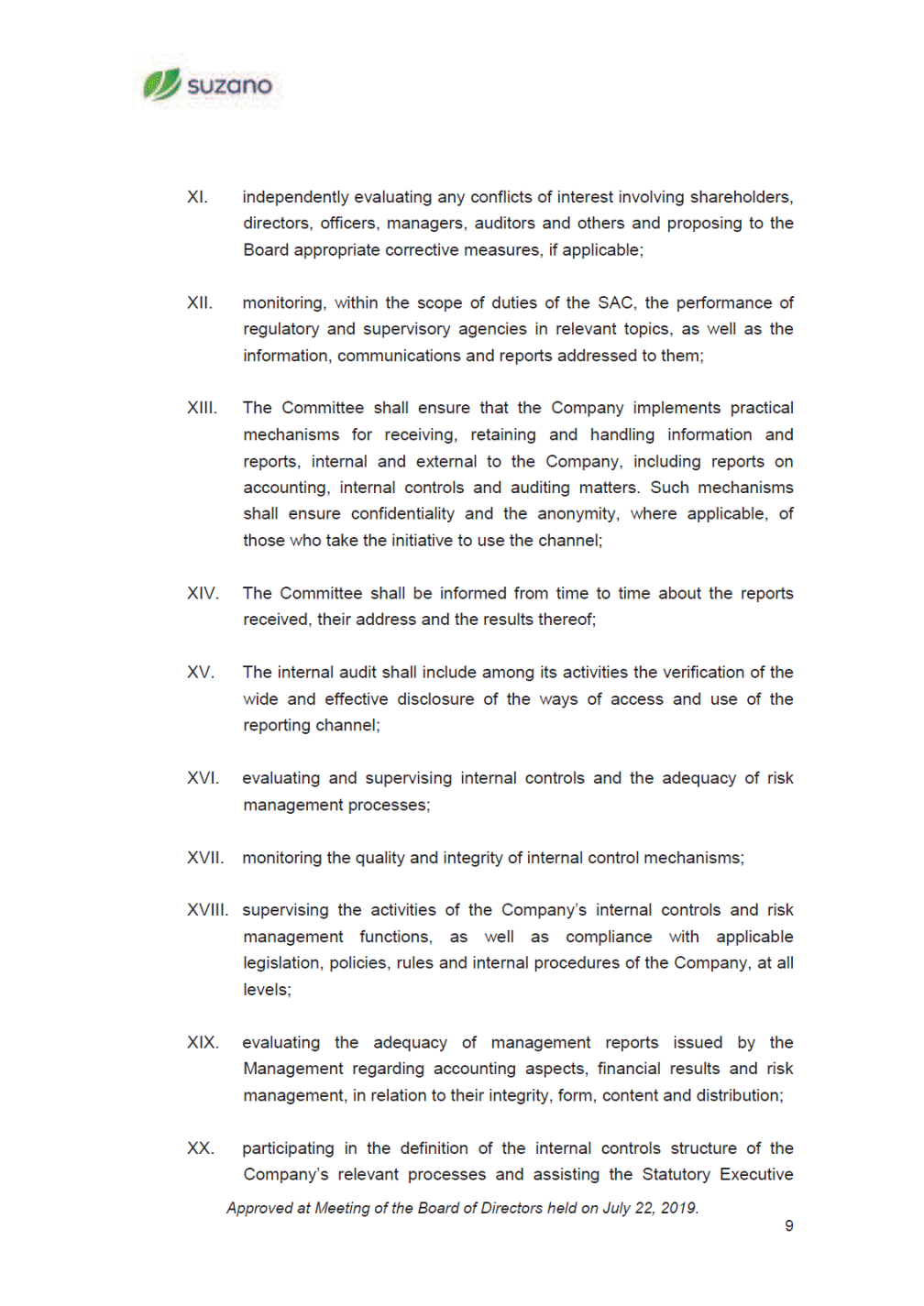
Board of Officers in its review from time to time, aiming to obtain their effectiveness; XXI. evaluating the effectiveness of internal controls, as established in Section VI of these Rules, to ensure the Company’s adherence to the legal, statutory and regulatory requirements to which it is subject; XXII. evaluating the conclusions of the Annual Audit, the impacts of the deficiencies reported therein, their timely reporting to the Board, and corrective measures implemented or to be implemented to eliminate such deficiencies; XXIII. evaluating from time to time the results of the plans, projects and strategic investments implemented by the Company (“post-audits”), and recommending their revision, as appropriate, in order to ensure compliance with the objectives set by the Board; XXIV. reviewing and evaluating recommendations for improvements in internal control and risk management systems made by internal and independent auditors, reviewing them with the Board, and monitoring their implementation with a view to eliminating or mitigating relevant identified deficiencies; XXV. evaluating the determination of the parameters of the Company’s financial risk management model and the risk management policies, their funds and maximum tolerance determined by Management; XXVI. evaluating the adequacy of human resources and financial funds allocated for the Company’s risk management; XXVII. evaluating and monitoring the Company’s risk exposures and may even require detailed information on policies and procedures related to (i) management compensation; (ii) the use of company’s assets; and (iii) expenses incurred on behalf of the Company; XXVIII. supervising the activities of internal and independent auditors; Approved at Meeting of the Board of Directors held on July 22, 2019. 10
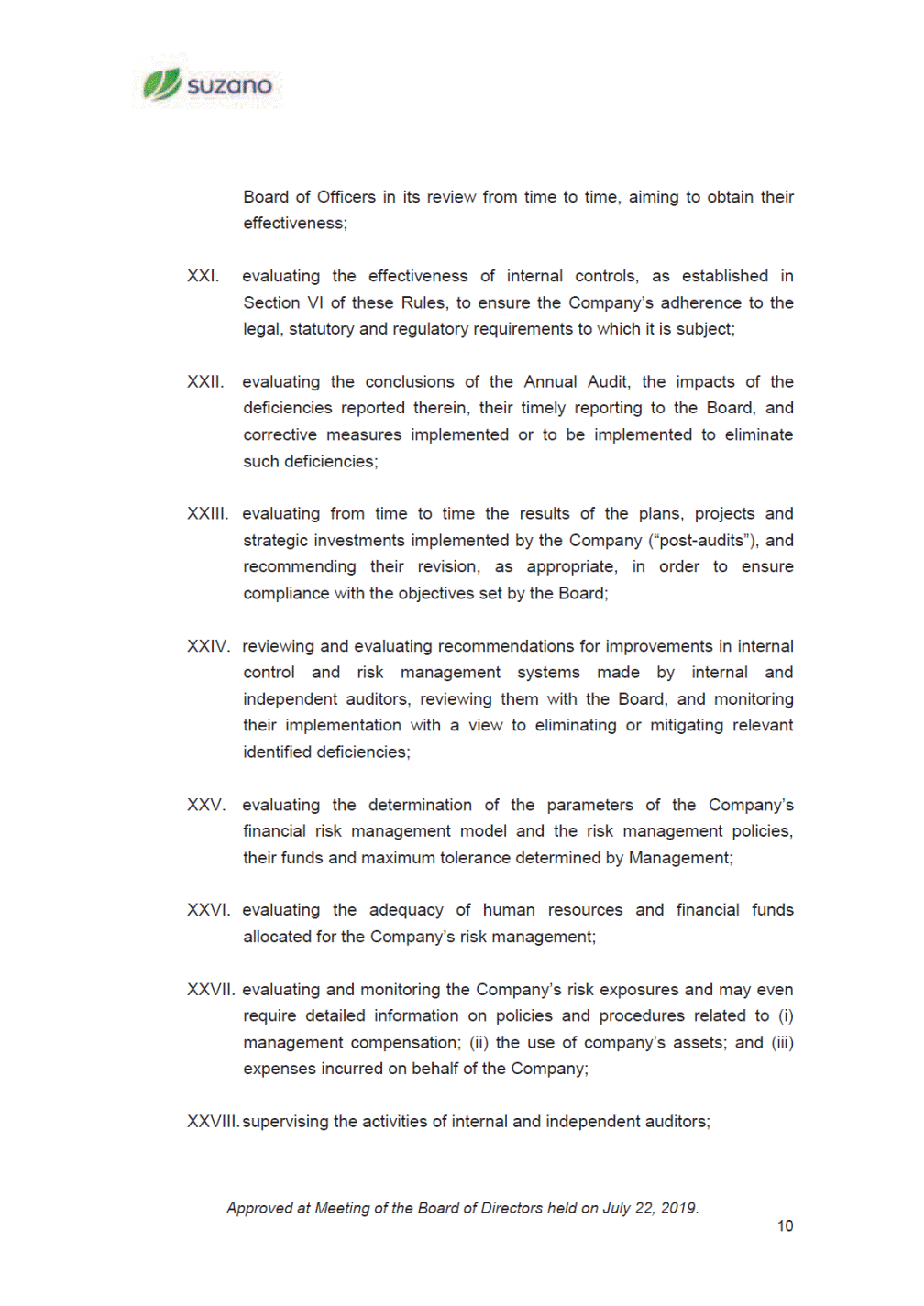
XXIX. recommending to the Board the engagement or removal of independent auditors for the preparation of independent external audit or for any other service, giving an opinion on their fees, and evaluating the results of the services rendered by them; XXX. supervising the activities of independent auditors in order to assess (a) their independence, (b) the quality of the services rendered and (c) the adequacy of the services rendered to the Company’s needs; XXXI. examining, in advance, the proposals and scope of services presented by the Company’s independent auditors, and making recommendations regarding their acceptance or rejection to the Board; XXXII. reviewing, at least annually, together with the independent auditors: (a) the internal procedures of the independent audit firm with regard to quality control; (b) any material issues identified in the most recent quality control review to which independent auditors were subjected, made by other independent auditors or arising from an internal program for such reviews; (c) any questions or investigations relating to independent auditors conductedbygovernmentalorprofessionalauthoritiesor regulatory agencies within the five (5) years prior to the current financial year. XXXIII. supervising the activities of the Company’s internal audit area; XXXIV.examining, in advance, the proposals and the scope of the Annual Internal Audit Plan prepared by the Internal Audit area, and making recommendations to the Board regarding their acceptance or rejection; and XXXV. reviewing the organizational structure and qualifications of Internal Audit members, their annual work plan and results achieved in the performance of their duties. Approved at Meeting of the Board of Directors held on July 22, 2019. 11
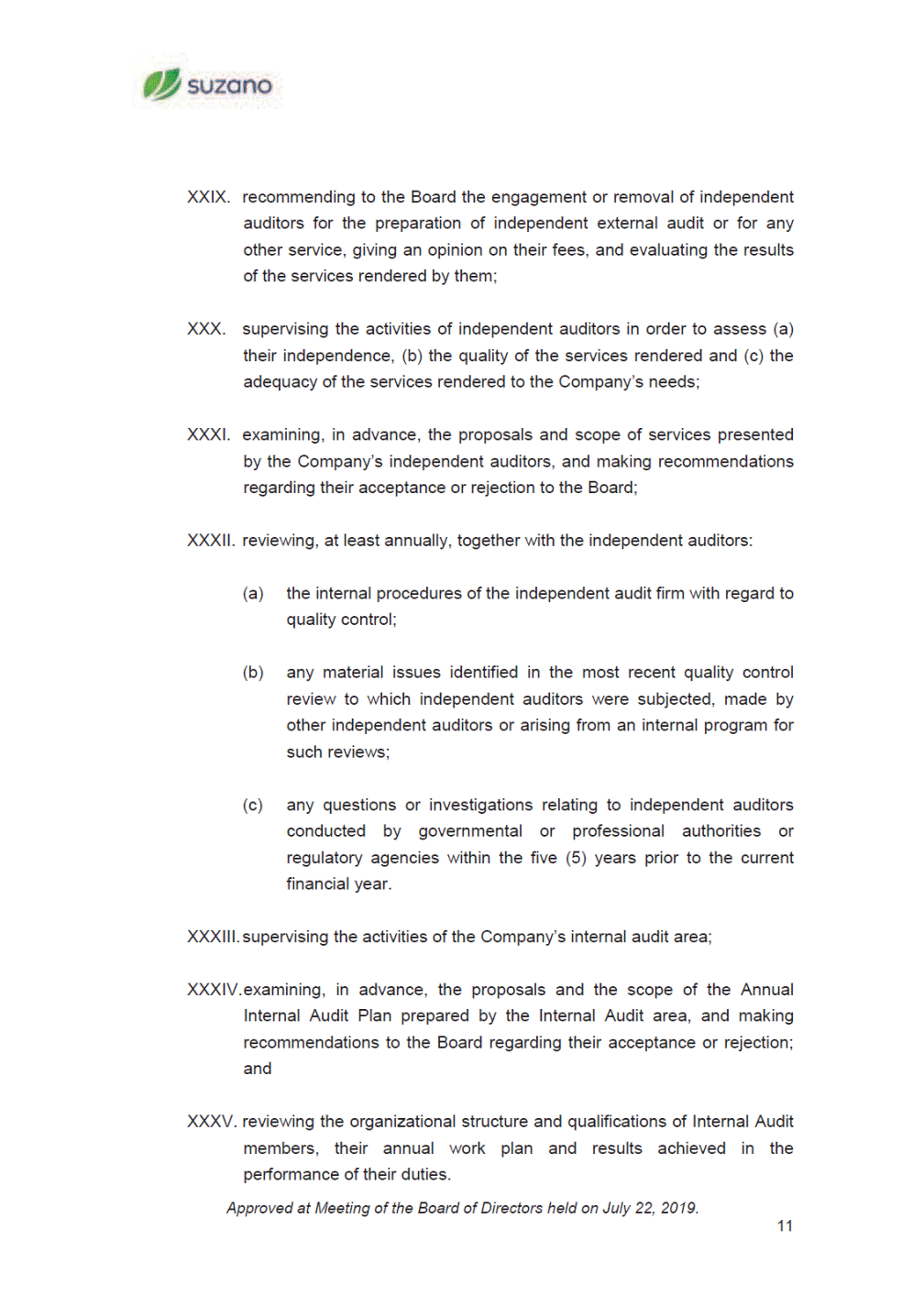
11. The Committee is not in charge of: (a) investigating complaints; (b) being the main responsible for managing all types of risk to which the organization is subject; (c) implementing and carrying out the structure of internal controls; and (d) preparing the financial statements. SECTION IV MEETINGS 12. The meetings of the SAC shall be chaired by its Coordinator and shall be convened by him upon letter, email, telegram or facsimile, working days in advance or one (1) working day in case meetings. The agenda of the meeting shall be defined and at least two (2) of extraordinary disclosed to the members and other convened together with the call notice. Regardless of the call formalities, the meetings attended by all SAC’s members will be regular. 12.1. The minutes of meetings of the SAC will be prepared and decisions thereof will be taken by the vote of majority of its members. 12.2. The meetings of the SAC will be held on a quarterly and ordinary basis and, extraordinarily, when necessary to the Company’s interests upon convocation of its Coordinator, through its Secretary. The request for the extraordinary meeting shall be forwarded to the Committee’s Coordinator, who shall take the necessary steps to call the meeting. Preferably, the meetings of the Committee will be held prior to the meetings of the Board, in accordance with the corporate calendar that will be disclosed at the beginning of each fiscal year, so that the accounting information is always reviewed before its disclosure. 13. The meetings of the SAC may be held at the Company’s headquarters or at any other place previously agreed by the Committee’s members, and may also be held by conference call or videoconference. Approved at Meeting of the Board of Directors held on July 22, 2019. 12

14. The other Directors, Statutory Executive Officers, employees, independent auditors, internal auditors or consultants of the Company will attend the meetings of the SAC whenever called by it, although without right to vote. The Company’s Statutory Executive Officers may be called upon to provide clarifications in accordance with the meeting agenda, previously communicated or at any time at the discretion of the SAC. 15. Any meeting of the SAC may be confidential, in whole or in part, if, at the Coordinator’s discretion, there is a matter of such nature as it may advise, including as regards the disclosure of the conclusions reached. 16. The meetings for the purpose of analyzing and discussing the quarterly and annual results and the corresponding reports to be issued by the Company may be held jointly with the Audit Board, if constituted. SECTION V DUTIES AND PRIVILEGES OF COMMITTEE AND ITS MEMBERS 17. The SAC’s members are subject to the same responsibilities as the members of the Company’s Board of Directors, pursuant to Law No. 6,404/76, the Company’s Bylaws and these Rules. 18. The Committee’s members are allowed, even if separately, but always reasonably and for the sole purpose of performing the duties defined in these Rules, to request directly from the Company, through SAC Coordinator, the corporate documents and any information they may deem necessary for the regular development of activities of the SAC. 18.1. The SAC Coordinator shall communicate in writing to the Board, through its Chairman, the content of any information required from the Company, subject to restrictions regarding any conflict of interest, pursuant to the provisions of Clauses 18 and 19 of these Rules. 19. The Committee, through its Coordinator, may request at any time a meeting with the Board’s Chairman. Approved at Meeting of the Board of Directors held on July 22, 2019. 13

20. Regardless of any prior consultation with the Board, the SAC may indicate to the Statutory Executive Board of Officers that independent professionals be engaged to carry out external audits and/or to obtain opinions on matters within its competence, but the Coordinator shall, however, communicate in writing to the Board, through its Chairman, any such action. 20.1.For the purposes of the introductory section of this Clause 20, the SAC shall have an annual budget reflected in the Company’s annual budget, sufficient to cover its works, including for payment of the fees and expenses related to the engagement of those professionals referred to in the introductory section of this Clause 20. The annual budget of the SAC shall be established by the Board with the favorable opinion of the SAC. 21. Regarding the occurrence of any conflicts of interest of the SAC’s members, the same rules as those contained in the Internal Rules of the Company’s Board of Directors apply. 22. The Committee’s members have a duty of loyalty to the Company and may not disclose to third parties any documents or information about their business, and shall keep in confidentiality any relevant, privileged or strategic information of the Company, obtained due to their position, as well as shall ensure that third parties do not have access to it, and they are prohibited from using the information to obtain any kind of advantage for their own benefit or for the benefit of others. 22.1.For the purposes of the introductory section of this clause: (a) privileged: means any information provided to a particular person or group prior to its public disclosure; (b) relevant: means any resolution of the General Meeting or the Company’s management bodies or any other act or fact that has occurred in its business that may have a significant influence on (a) the quote of its issued securities; or (b) investors’ decision to trade in those securities; or (c) investors’ determination to exercise any rights inherent in the condition of holder of securities issued by the Company; Approved at Meeting of the Board of Directors held on July 22, 2019. 14
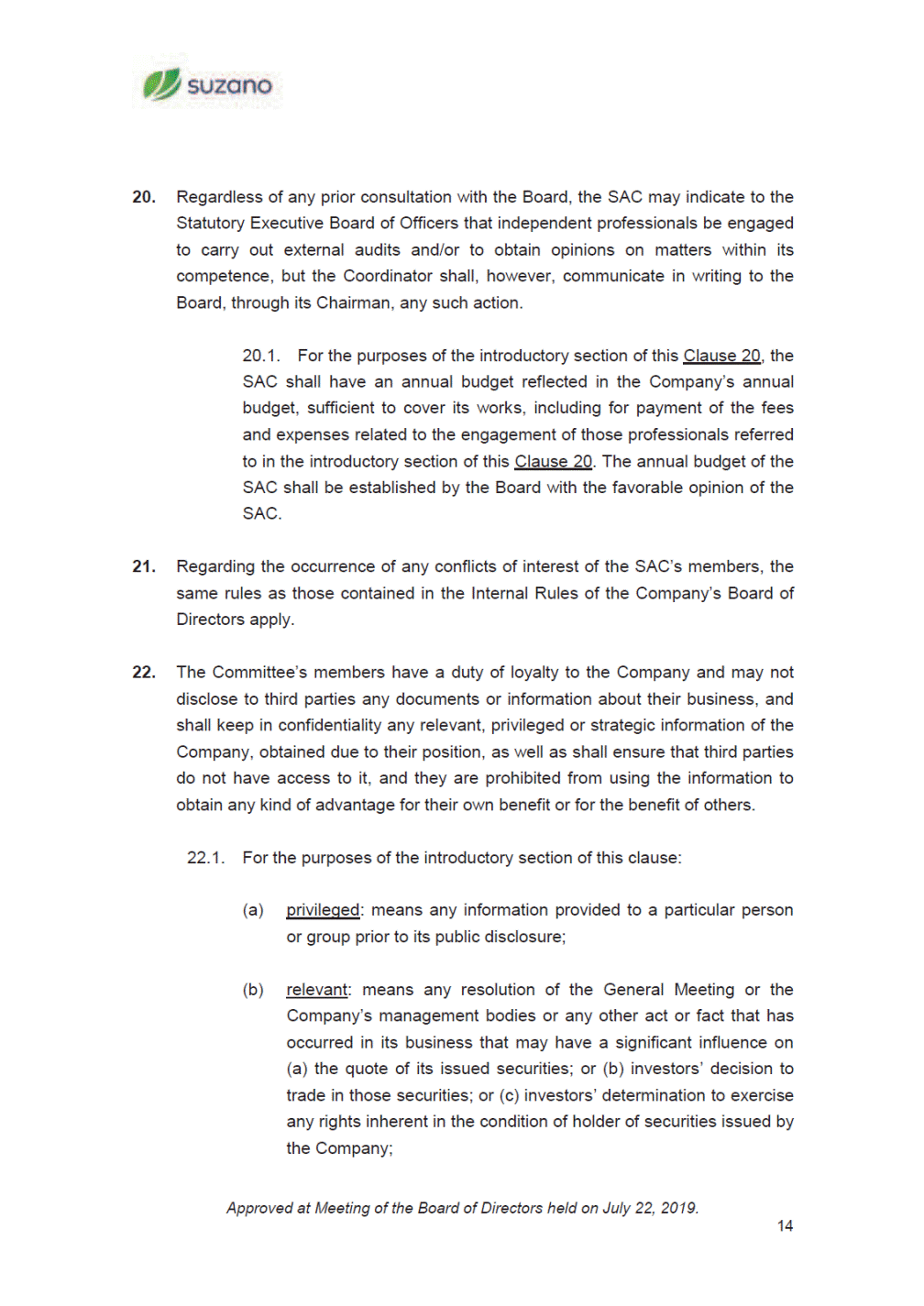
(c) strategic: means any information that may provide the Company with a competitive gain or advantage over its competitors and which, due to its importance, should be kept in confidentiality. 23. At least once every four months and as provided for in the Thematic Agenda of the Board of Directors, the Committee Coordinator shall report to the Board meetings on the activities and recommendations of the Finance Committee. SECTION VI ANNUAL REVIEW 24. The Committee will monitor the Company’s Statutory Executive Board of Officers in the preparation of an annual review regarding the effectiveness of the internal controls (“Annual Review”), including any changes to the internal control related to the preparation and disclosure of financial statements (“Financial Internal Controls”) which occurred in the period, and that have affected or may significantly affect the Financial Internal Controls. 25. The conclusions of the Annual Review shall be presented to the Board and, if necessary, disclosed by the Company in the format required by the applicable law, as part of the annual report form (“Annual Report”) for the year to which the review refers. 26. The SAC will recommend any steps it deems should be taken in the Annual Review process, including, without limitation, interviews, submission of forms and review of relevant documents. 27. The Governance, Risks and Compliance Executive Manager will communicate to the SAC and the Company’s external auditors the conclusions of the Annual Review, indicating, without limitation and as appropriate: (i)any significant deficiency in the format or operation of the Financial Internal Controls that may reasonably affect the Company’s ability to file, process, summarize and report financial information; (ii) any material change to the Financial Internal Controls, including any corrective actions taken or scheduled by the Company to eliminate Approved at Meeting of the Board of Directors held on July 22, 2019. 15

significant deficiencies in the preparation or operation of the Financial Internal Controls; (iii) any fraud, whether material or not, involving the Statutory Executive Board of Officers or employees of the Company that have a relevant role in the Financial Internal Controls; (iv) changes in the law applicable to the securities markets in Brazil or abroad, changes in accounting principles generally accepted in Brazil or abroad, institution of policies to be followed by the Company, or changes in any circumstances or prospects that determine the need for changes to internal controls; and (v) whether professionals involved in the development, application and review of internal controls have adequate experience or if additional training is required. 28. The internal controls will be reviewed from time to time by the Internal Controls Executive Manager under the coordination of the Company’s Chairman, with the assistance of the SAC, in order to incorporate, as necessary, the conclusions reached in the Annual Review. 29. In addition to the Annual Review, the Chief Executive Officer or the SAC may determine to conduct interim reviews of internal controls when deemed convenient, including in the event of a significant change in: (i) the law applicable to the Brazilian and United States securities markets; (ii) the legislation regarding internal controls; or (iii) any other standards that must be followed by the Company and that may have an impact on internal controls. 30. The SAC will also be responsible for preparing a summary annual report, to be presented together with the financial statements, containing the description of (i) its activities, the results and conclusions reached and the recommendations made; and (ii) any situations in which there is significant disagreement between Approved at Meeting of the Board of Directors held on July 22, 2019. 16
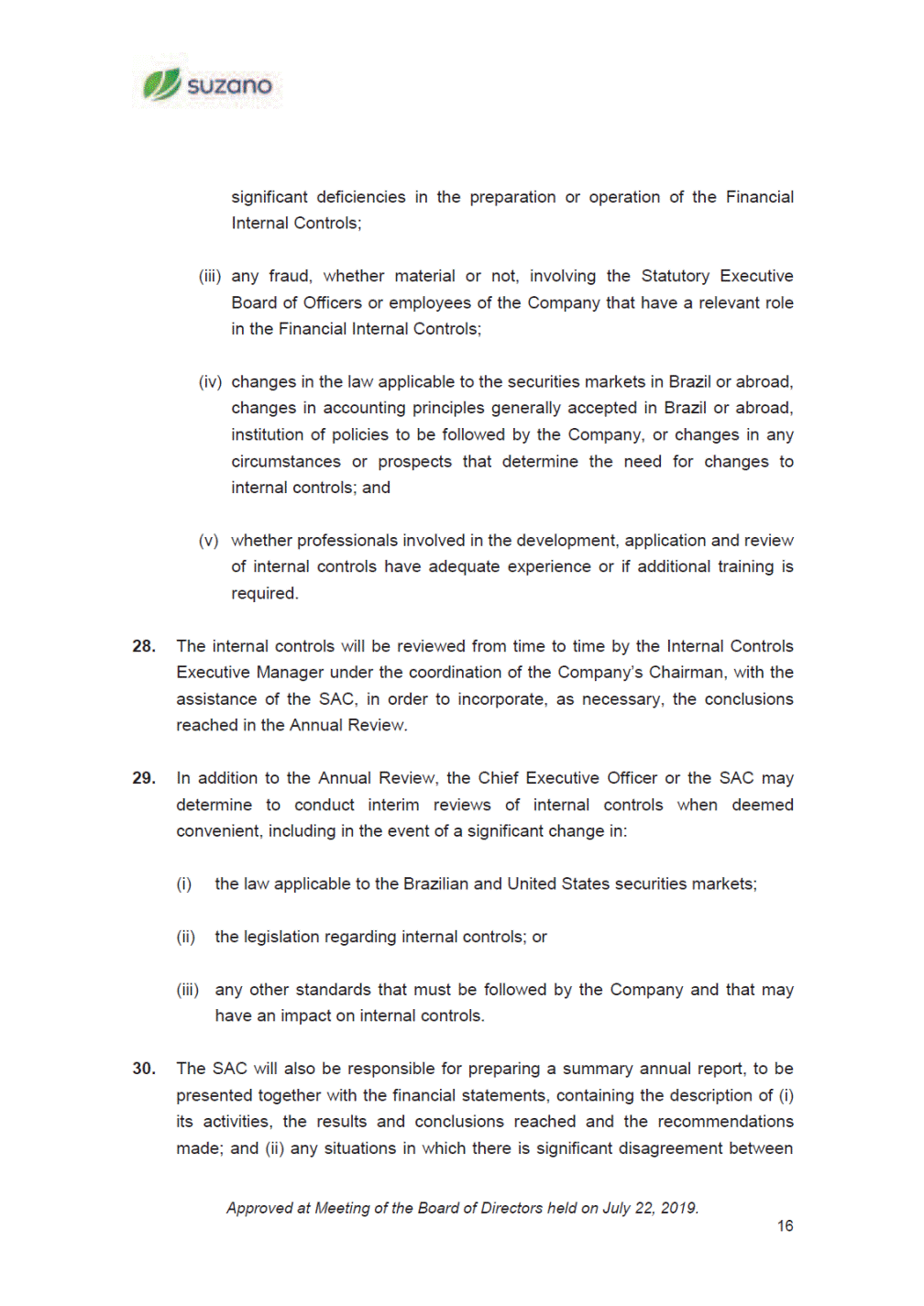
the company’s management, the independent auditors and the Committee regarding the Company’s financial statements. 30.1. The Company shall maintain at its headquarters and at the disposal of the CVM, SEC and stock exchanges in which the Company’s securities are listed, the annual report referred to in Clause 25 above for a period of five (5) years. SECTION VII TRANSITORY AND FINAL PROVISIONS 31. These Rules shall become effective as of the date of their approval by the Board of Directors, and any rules and procedures to the contrary are revoked herein. 32. Once these Rules have been approved, they shall be immediately followed by the Company, its Officers and employees; the SAC’s members; the Board’s members, members and alternates; and these Rules may only be amended by the favorable vote of the majority of the Board’s members. 33. These Rules were approved by the Board at a meeting held on July 22, 2019 and may be revised by the Board whenever necessary to improve the Company’s application of the best corporate governance practices and to effectively comply with the laws and regulations to which it is subject. São Paulo, SP, July 22, 2019. Approved at Meeting of the Board of Directors held on July 22, 2019. 17
